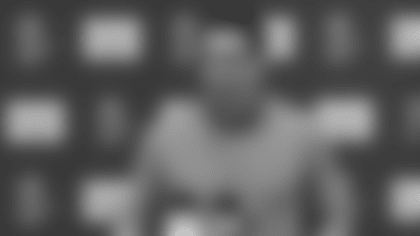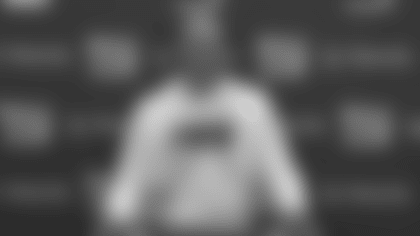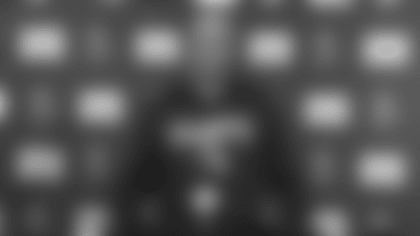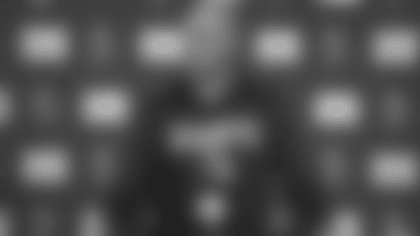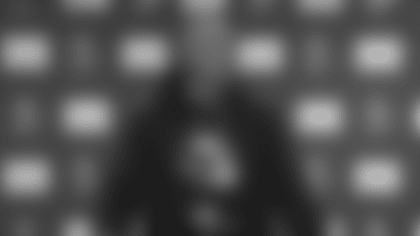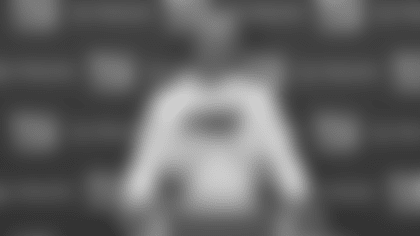Head Coach Joe Judge
Q: Jason (Garrett) just said that Daniel (Jones) ran through a workout yesterday after practice. What did you see from him there?
A: I think he's working hard every day to get better. He's doing everything we ask him to do. He did a good job in the walkthrough yesterday. We put him through some basic agility, short space stuff. I would say that he's throwing the ball well, but there's a lot of things we still need to see. Throwing the ball in short space and going through a walkthrough are very, very different than going through team periods and being able to see how this guy reacts and moves in the pocket, which is really our biggest concern is how he can protect himself on the field. Today will tell us a lot and tomorrow hopefully we'll make a final decision.
Q: How do you expect to split those first team reps between the two of them, or do you?
A: Yeah, we will mix guys in. We do that every day anyway. We'll go ahead and mix them. We'll see how Daniel is working, we'll see him through individuals and see how his body responded. The more we think he can do, the more we'll let him take. Then Colt (McCoy) will get his share as well.
Q: Has the four straight wins given your players a noticeable confidence? If so, is it a quiet confidence or is it a bravado? What do you want from them in that regard?
A: I think the confidence they get is coming from practice and execution. They're playing confident in games because they perform in practice, and they know the guy next to them is also executing at practice so they can play aggressive with their techniques. Look, confident or not, we expect them to just go out there and compete every day and improve on a daily basis and keep looking forward. We talk to them a lot. There are obviously a lot of hypotheticals out there. We talked about this yesterday. We need to remain focused on what's real, and what's real is this Sunday against the Cardinals.
Q: It sounds like you're genuinely not sure on what Daniel's status is. Is there any benefit in your opinion to not disclosing that? If you're on the other side, does it make you have to game plan for two quarterbacks?
A: I would say on the other side, it may make you have to game plan for two quarterbacks. But to be completely transparently honest with you guys, I don't have an answer for you right now on that. I really have to see this guy move around on the field, and that's just what it is. Look, we want all of our players to be fully healthy and be out there. He did a walkthrough yesterday, he did an abbreviated workout with the trainers that we watched after practice. But that being said, none of those are what my concerns are with him going into Sunday. Until he does some things that I can really see and make the judgement that he can protect himself and stay out there healthy on the field, I can't give you an answer. I would just be making something up.
Q: A question on (Xavier) McKinney. We spoke to Jerome (Henderson) last week and he kind of spoke about the balance of you want to get him in there, but the defense is playing well so you don't want to mess with them. How do you assess that?
A: Look, Zay is only going to make us better when he gets on the field so long as he performs at practice. He's been doing a really good job at practice. His role will keep increasing as we go. The thing I've explained to Zay, and I've told the coaches as well, is we have to be fair to this guy. This guy has been out of football now, he's a rookie, he hasn't played in preseason, he missed the first however many games. He comes into Cincinnati a couple weeks ago, we can't throw him on the field for 50 snaps. We want to kind of get him in, get him used to the speed of the game, get him on the grass, make some adjustments, start communicating. We got him a little bit more reps last week. We'll see how it progresses throughout these next four weeks. But I expect his role to keep increasing, and I do expect his play to keep improving because he's going to be working with the team out there. He's done a great job working for us. It's not easy being on the IR as a rookie and being out of that and getting mental reps while you're watching everyone else on the grass. Then all of a sudden, you're taking off and you're playing with the team, you're really doing everything for the first time. Even though you've heard the calls, you made the calls looking at tape. it's a lot different when you're on grass and you're adjusting the formation. You have to go ahead and disguise something pre-snap and then get to your landmark post-snap. He's done a great job preparing. The coaches have done a good job keeping him up to speed with what we're doing game plan wise. But again, to be fair to this guy as a rookie, we have to let him come and progress his career at the right rate, and not just throw everything on his plate. It's just not fair to him as a player.
Q: One of the guys we haven't asked you about in a while is Andrew Thomas, that's probably a good thing. What have you seen from him? Was there a moment where things clicked in your mind for him? How has he handled the change in offensive line coach?
A: I think the entire unit has improved every week. I think Andrew especially, there were a lot of questions about him early in the year we were getting in the daily press conferences and all that stuff. Look, this guy has never blinked. He's never wavered. One thing about Andrew is he's played aggressive for 60 minutes in every game this season. I see that in practice every day. He's very intelligent, he's very insightful, he has that quiet demeanor to him where you know he's digesting everything you say. Then when he asks questions, he asks the right, smart questions. But I see him playing very aggressive, I see him playing effectively, and I see his level of play improving. But that's natural for any rookie through the course of the season and just getting more and more experience, especially with the way he had to start this season. Look, this guy came in baptized by fire. He saw some of the top rushers in the world out of the gate. This guy stepped up to the plate and he fought his butt off for 60 minutes and he kept improving, kept improving, and I see him improving every day.
Q: The decisions you've made this year as a head coach, all the in-game stuff, when to punt, when to go for it, trick plays, all that stuff, is it a lot of that who you are or is a lot of that based on the team you have now, which is you don't score a lot of points, you don't give up a lot of points? Is that you and how you want to be or could you see down the road maybe if your team is a big, explosive team, you're going to be a different head coach in some of the things you do in-game?
A: I'll always play to the strengths of our players. Whatever is best for that specific team and that specific game plan, I'll always make the decision that I think is best at that moment. Sometimes it may be punting on a short field, maybe attempting a long field goal, maybe go for it on fourth down. I always have to make the decision. It's not going to look uniform. You're not going to be able to look at some excel sheet of every decision that I make, because I'm not going to make this thing based on some kind of analytical chart that says when you should go for two, when you should punt, when you should go for it on fourth and one. To me, there's a big feel to the flow of the game and knowing your team and knowing the opponent you're playing against. You have to really know your team, you have to know your strengths, you have to understand how the complementary football is being played as well. Is it worth going for it on fourth down and giving the ball back at midfield if your defense is playing really well? Do you punt the ball down the field and make them go 95 yards, basically saying we're confident we're going to get the ball back in three plays, and our punt return unit should give us the field position to have a fresh set of downs? Or do we want to give them the ball at midfield and give them a short field, maybe 15 yards away, to get into field goal range? To me, it's a balance of how you're playing in all three phases of the game, and it's the flow of that specific game. I know that sounds very grey area and vague, but to me, there's a great feel element of it, knowing what's going on in that game or what I think is going to be best to win that game.
Q: One constant is that whole 20-point threshold. Your team is not getting much above 20 points in a lot of these games. Does that really wear on a head coach as far as 'look, I don't have a lot of room to play with here'?
A: Nope. Nope. Whatever it is. Our goal is to keep this thing close and win in critical situations. I see an improvement from our team throughout the season on that. We'll do whatever it takes to win, however we have to play. I don't care if we have to hand the ball off 100 times, throw it 100 times, we have to blitz every player or play nothing but 10 guys back in coverage. Whatever it's going to take each game, we'll do.
Q: Pat Graham said a couple weeks ago that his job is to reflect the vision of the head coach. Obviously, you wouldn't have hired him if you didn't believe that you guys were like-minded. I'm just curious beyond January with all the time you worked with Pat up in New England, what made you know then, back then, that you guys were like-minded and have a similar vision for what you want to accomplish on the football field?
A: The previous years that we worked together up in New England, you find out a lot about each other going through kind of harder times, rough seasons, long hours. It's not all pats on the backs and conversations. A lot of times, me and Pat really challenged each other working together. There were arguments and different philosophical questions we had to answer. There were a lot of times when we had to shed some weight in the offseason, walking around the field in the spring before the players got back, and just have a lot of talks about just how to build a team and what we really believed in, what we think our priorities to accomplish in terms of setting a culture. We always found time, even when we didn't work together, me and Pat were always finding each other at the Combine, make sure we found time to just talk ball. He was a guy that if I had a question on something that was going on or how to handle a situation, he was always a guy I could give a phone call to. He may shoot me a phone call or text in the same regard. Again, I think when you work with people and you put in long, stressful hours, you go through some adverse situations, you really find out who those people truly are. When you come out the other side, there's someone you can trust, and that's someone you want to go forward with.
Q: I have two quick things here. One is a follow up on Pat Graham a little bit. Is there any part of him that is, his demeanor is a little bit different behind closed doors and that kind of prim and proper Ivy League vibe that he exudes on our Zoom calls? He gets after his guys pretty good behind closed doors, does he not?
A: Pat has a lot of depth to him. I think we all do. We're all different in front of a camera than we are maybe in the classroom than we are on the field. I think you have to hit the field with a certain level of juice and urgency that you can't just walk around whispering into players' ears and get them to respond. That's just not our personality. That's not the personality of really any coach on our staff. Pat's got a tremendous personality. He's very funny, he's very intelligent, he's very insightful. He's great to have around, he gives great perspectives on a lot of things. I really can't say enough positive things about him.
Q: With regard to Leonard Williams, I know you were extremely complimentary of his personality and what he brings in terms of his attitude, but I wonder what you're seeing technically from him this year and how he's meshed with his position coach and with Pat? These numbers are starting to build up for him more so than they have in his career.
A: First off, he's freakishly talented so there's only so much you're going to teach this guy skillset wise. Now, you have to refine the technique, the fundamentals and really emphasize the finish. I think (Sean) Spence(r) has done a really good job with Leonard in those areas. The one thing that really shows up, I think the way Leonard is playing is he has tremendous finish right now of getting to the quarterback or in pursuit getting to the runner. He's made a lot of disruptive plays. A lot of things don't show up on stat sheets. If they're doubling him, someone else is single, so where's the pressure coming from? There are a lot of things that Leonard does by just kind of the caliber of athlete he is. But to me, the finish he's playing with is really making a big difference for us as a team.
Q: You have four free agents you brought in after you were hired obviously who are making huge impacts. Blake (Martinez), Logan (Ryan), (James) Bradberry and Graham Gano. I'm wondering if you can share some of the insights that went into free agency with you, Dave (Gettleman), Kevin (Abrams). Were you 'we want the best players we can afford'? Were you 'we want guys who can be here and make an immediate impact'? Were you 'we want guys who are going to be here for the long-term, foundational guys'? How did you approach free agency because it seems like you guys hit on all those guys?
A: I think there are a lot of elements to everything you just said right there. We obviously worked, I thought we worked very well together, just collectively sharing a vision in what we're looking to build this team with. I laid out the way I saw this team being built. We had a lot of conversations in terms of what the best way going about that was. I thought Dave and his staff did a great job in terms of identifying who's out there, who's available. To me, there was such a key element in bringing in the right kind of people. All the guys you just named, they're very capable players but they're very good people and very good teammates. When you have guys who are good people in the locker room, who are good teammates, who are passionate about what they're doing and work hard every day, you're going to improve as a team. That's going to happen. To me, those guys have all made a lot of impact, and it's not just because of a skillset or a talent level. It's because the way they come to work every day as professionals and the way they work on the field and the way that they care about their teammates, and their teammates help raise them up when they're having a tough time because they care about them as well.
Q: Coaches always talk about constantly improving. You signed Graham Gano and Logan Ryan in late August. Where would this team be without those guys?
A: Look, those guys are doing a tremendous job for us right there. Logan's really built in a lot of versatility and depth we have on defense. This guy does a lot of things behind the scenes, he does a lot of things in meetings. Logan's a guy that challenges you constantly. He's the guy you go in there with in the meeting and you better present something to him, and you better have all the answers because he's going to ask 35 questions, and they're all very good, insightful questions. He's going to make you think and confirm that what you presented to the team is the best sound plan for them to have success. He doesn't do that in a testing way. He just does it because he wants to be completely thorough and make sure we're on the same page, and everyone understands how it's supposed to be played. I'll tell you what, Graham has really done a great job for us with the field goals, with the kickoffs. This guy has a great temperament. He's a competitor. I'm glad he's here. He's obviously made a lot of big kicks for us. Look, kicker is one of those positions a lot of times you don't really notice until you don't have one. You don't have one, that's all you can think about.
Q: Coach Graham was talking earlier about tailoring game plans to each specific opponent. I just was wondering is there any specific benefit to the fact that you faced Russell Wilson last week, and now this week you're going up against a similar strong-armed, mobile quarterback in Kyler Murray?
A: You can say that there are elements that are the same with these guys in terms of they're mobile quarterbacks with big arms, can extend plays, can run down the field. At the same time, I don't think it's the best thing to do to try to paint these guys with a broad brush and say that they're the same quarterback. I don't see that at all. I think they're both very talented, very capable, they're both explosive, but they both have their own play style, they both do things within their own unique personality, and you have to know how to play each one different. There are a lot of subtleties that we see on tape, and there are some broad strokes that our players have to understand are very different as well. One of the misconceptions that I've been asked about a lot this week and I heard is just because someone can run and throw, does that help you? Look, if we're playing Patrick Mahomes or Lamar Jackson, that's not the same as Russell Wilson, it's not the same as Murray. These are all very different quarterbacks, different skillsets. There are just some basic things you can check boxes on. Are they mobile? Yes. Do they have big arms? Yes. Are they explosive? Yes. Are they the same player? No. They're all very different. You better understand how they play within their offenses and how they operate to be able to have a chance of success against them.
Q: I had actually covered Jabrill (Peppers) in high school. I noticed you're wearing a Don Bosco Prep sweatshirt. No bets involved with him this week, were there?
A: No, but I pay enough for that high school for my son.
Assistant Head Coach / Defensive Coordinator Patrick Graham
Q: You have relied on Darnay Holmes a lot. Can you talk about his progress from day one to now?
A: Darnay works really hard. He asks the right questions. I think that's been part of his growth. I'm not sure, I think he was a little bit worried to asks questions sometimes in front of the group. Or stopping me while I'm doing an install. We had a meeting today and, boom, he didn't know something, and he said, 'Pat whoa, can you go back over that?' I always think that's a sign of confidence. A lot of times you don't ask a question when you're not confident. You might think it might sound stupid, that you missed something. I thought that was good by him. As for on the field, the biggest thing for me is just most coverage players, DB's, you want them to be able to tackle. He's doing a better job of tackling. The other thing is, can he play his leverage? One thing that happens when you get into this league, especially when you're dealing with the slot corner position, winning your leverage is a big part of it. You see how teams struggle on third down early in the year and those teams improve. Usually it's something as simple as winning your leverage. He's really worked on that and I think he is doing a good job of trying to compete to win his leverage against some of the better players he is going against. That's some of the stuff where he has improved.
Q: I'm curious what you got out of your experience when you went to Notre Dame as a GA (Graduate Assistant)? Where that sent your career with Coach Weiss (Charlie Weiss)?
A: Coach Weiss, I'm indebted to him for a ton of things. Just learning football. The opportunity to go to a big school. He took a lot of mornings when I was there as a GA where it was me and him going through the tape. He took the time to teach me how to coach. I'm in debt to that. Also, how he had the relationship in the NFL helped me get a job there. I met some really good people there. Chad Klunder, who is with us here. Tim McDonnell, who is here with the Giants. I met some really good people at Notre Dame. The simple thing is whether I grew up a Notre Dame fan or not, my brother was, I wasn't, when you go there, it's a special place. That's one thing that always stands out to me.
Q: Can you speak to the different challenge that (Kyler) Murray presents to you guys versus what you had out in Seattle last week?
A: Russ (Russell Wilson) is a great quarterback in this league. For Murray, he is just younger. The thing about him, not that Russell isn't fast, this guy Murray is true speed. When I'm talking to the players, true speed. Not fast, not quick, we're dealing with true speed. Any mistake, it can be a touchdown at any given moment. That's what you're dealing with, with this guy. Whether it's the run game or the passing game, he can get away from you and then get the ball down the field. That's what I mean by true speed and the ability to score a touchdown at any point on the field. He's pretty dynamic. We have a big challenge ahead of us. On top of that, he has some of the best wide receivers to play the game since I've been in the league working with him. Drake (Kenyan Drake) is playing at such a high level right now. The backs, Edmonds (Chase Edmonds), they are playing at such a high level. The guys are doing a good job blocking. Big challenge this week.
Q: Weiss claims that he fouled up your language a bit in South Bend.
A: (Laughing) My parents might be paying attention to this. I can't agree to that.
Q: You had said a couple weeks ago your job is to be a reflection of the vision of the head coach. Obviously, you and Joe were on the same page back in January, that's why you're here. In your history, was there a time where you realized that you and Joe see a lot the same?
A: I gauge it like this, when we go to the Combine, who do I have dinner with? If I consistently have dinner with you, then we're like minded and I enjoy spending my time. That's one of the things I use to gauge. Me and a couple other people I work with, we always make time to spend time with one another. Again, I just admire Joe's teaching ability. I'm drawn to people that are better than me. No different than Matt Patricia, Brian Flores. I know in my mind they are better than me and I'm drawn to them because I can learn from those guys. B Flo (Flores) in terms of how smart he is and how good of a leader he is. I'm drawn to that. Matty P, how smart he is, how tough he is, how good of a teacher he is. You talk about Joe Judge in terms of how he can teach. I'm drawn to people like that because I know it's going to make me better. I like that.
Q: Jabrill (Peppers) was talking after the game that you've seemed to have found a way to figure out what every one of your guys is good at, at every level. That's kind of putting them in position to make these plays down the stretch. What went into that and what's the process like of just studying each of your guys and figuring out how to put them in the best position?
A: I appreciate what he said, but honestly it comes down to the assistant coaches and their feedback. They spend more time with the guys individually. What did I do, if anything I did, I just became maybe a better listener. That's probably what happened. Something that you have to work on every day. Everybody wants to be a good listener. Do we practice it? We try to practice it. How good are you at it? Being a good listener and listening to the assistant coaches, listening to the players. I don't know if they could have ownership of the defense right from the jump, but at some point, they have to take ownership of it, and you start to listen to those guys. It really comes down to the assistant coaches because they spend more time. They evaluate them. We're all evaluating them. If it was anything I did, it was become a better listener to the coaches. Whether it's Bret (Bielema), Jerome (Henderson) Kevin (Sherrer), Jody (Wright), Spence (Sean Spencer), Mike (Treier) all those guys. Just listening to those guys.
Q: It seems like the last month you guys have elevated your game on defense to another level. Was there a moment where it seemed like these guys kind of clicked and they started to take ownership of the defense like you talked about?
A: Each week is so different. The confidence is coming from practice, to be honest with you. Practice and spending time with one another. Whether it's zoom or when they're here in the building. Them getting comfortable with us as coaches. The coaches getting comfortable with one another. It just starts to grow just like any relationship. You get your bumps in the road, if that's the right saying, and you work through it. Now we're just focused on the Cardinals and how we can hopefully stop them or minimize their effectiveness on Sunday.
Q: You talked about some of the head coaches you have worked for. Hard not to notice your name being thrown around a little bit for head coach opportunities. Do you think you are ready for that? Is that something you are interested in?
A: If you go back to the first time I spoke to you guys, I'm not smart enough to think ahead of today. I'm trying to get better today. I need to get ready for third down versus Arizona on Sunday. I can't even think about it like that, to be honest with you. That's all I'm really focused on. Third down and two-minute today. Finish up early downs and get ready for red area. Right before here, I was going through red area meetings. I can't think about that stuff, to be honest with you.
Q: As a coordinator, what's it like when you're drawing up these plays every week? (inaudible) What is that feeling like as a coordinator?
A: You broke up a little bit, but to draw up the plans? It comes back to listening. I won't go through the whole process of how we game plan, but it's the input from the coaches and watching the tape. Obviously, you just try to provide some wrinkles here and there. Here's the thing, the reason why you have to provide the wrinkles is because the coaches on the other side of the ball that you're going against, they're pretty good coaches. One of 32, whether they're a running backs coach, receivers coach, they are one of 32 in the world. You have to throw in wrinkles. Here's how I look at it, we don't have anything else to do but football. It's not like we have to get on the phone and recruit. We're not worried about that stuff right there. We don't have to talk to boosters, all we do is football. If you all you do is football, that's what they're evaluating us (on), that's what they're looking at. You have to have some wrinkles to be able to hopefully throw them off a little bit. It's just the normal process you go through. I would say it starts with listening, listening to your coaches, listening to your players, to be honest with you.
Q: We were talking to Logan Ryan yesterday and he kind of brought up out of the wild blue, he said there is a guy on our team that doesn't post really big numbers but he does as much as anybody and that's Dalvin (Tomlinson), who today was nominated for the Walter Payton Award. Can you talk about him and his season?
A: I'll talk about the person first. I love you and all that stuff like that, guys say it all the time. I've known him since he was a rookie, I really have a love for this guy. In terms of what he does on and off the field, having a relationship with him. I just think that he's a genuine person. He's one of those people that you become a better person, better player, being around him. You can see that. Where that D-line is going right as they go through this process is a direct correlation to his leadership and what he does on that field, regardless of what statistics or what have you. He's teaching them how to use their hands properly. He's teaching them about the right attitude playing up front. I knew him as a rookie, and he was learning from Snacks (Damon Harrison), JPP (Jason Pierre-Paul), OV (Olivier Vernon) and those guys. You can see the maturation process occur and it's a beautiful thing to see. It's one of the things why we coach. You have to go back to us being teachers. You see one of your students doing well and you're like, 'wow, that's pretty cool.' What's going on, on the field? He's a technician. He's always been a technician but now you're seeing again, I don't know if he had an apprenticeship, he's just improving as he has over the years. He's ready to take his exams to get his own masters. You really see it. He was a young guy learning from the older guys and now as he's grown, he's ready to teach the masters classes. It's a beautiful thing to see. Pad level, playing with his hands, the ability to get off blocks. The conditioning to be able to finish games. It's a such a good thing to see for that guy. I'm just happy to be around him.
Q: I want to ask about three free agents you guy brought in. Logan (Ryan), Blake (Martinez) and (James) Bradberry. When you get hired, you know the roster and most of these guys were here before you. You have two months before free agency. Were you drawing up schemes and saying I need a Martinez, I need a Bradberry, I need a Logan Ryan to do what I want to do? Do you sign those guys and tweak after you have those guys? Chicken or the egg, which came first?
A: (laughing) Once you start throwing sayings out there, you're going to confuse me. I would say this, I knew Blake, I knew he was a leader and growing into that role as a productive inside linebacker. We want good players, to be honest with you. To me, the beauty of the system and the part that Joe is building here with Mr. Gettleman, we want good football players here with the New York Giants. It's our job to figure out how to deploy them. To me, chicken or the egg, I don't know. We want good football players and then it's our job to figure it out. See what we can do to help stop the offenses.
Offensive Coordinator Jason Garrett
Q: Your 13 personnel packages last week, especially in the second half, worked pretty well against Seattle. Can you talk about, if you don't mind, the blocking of your tight ends? Maybe in particular Evan Engram, a guy who's been much maligned for his blocking.
A: We like to use different personnel groups. Week to week, we might use one personnel group more than another. 13 has been a pretty good one for us all year long, both running and throwing it, and really probably has a lot to do with how much confidence we have in those tight ends. You talk about Evan, you talk about Kaden (Smith) and Levine (Toilolo), those guys are really good football players. They're good blockers. When we throw to them in the passing game, typically they come through for us. You get in some different formations with that big personnel group that can cause some problems for the defense. The game the other day was about running the football. We tried to attack them a few different ways from those big personnel groups. It's one thing to try to put a player or a unit into a position where they can have some success. It's a whole other thing to go block those guys like those guys did. Really throughout the ball game, I thought they did a really good job capturing the edge for us, coming off the ball, hitting them in the mouth, and then sustaining those blocks that allowed us to drive the ball as well as we did running it. They did a really good job in the ball game. I really believe in those guys.
Q: I wanted to ask you kind of a follow up on that. Watching the power football that you guys played in the second half on Sunday is kind of fun. What does it mean to an offense and to a team when you can line up that way, in those big packages, in those power packages, and more or less just kind of run the ball down a team's throat?
A: It's a challenge to run the ball in the NFL. It really is from any personnel grouping. Defenses do such a good job from a scheme standpoint and from a talent standpoint in stopping the run. It's a challenge for us. It's something we believe in. We believe in it very strongly to be balanced and to attack different ways. We've run the ball a lot better here the last six or seven weeks. I think that's helped our team. It's helped our offense. The residual effect to your pass protection and your passing game I think can be a positive one. Then really throughout the team as well, instilling that mentality of toughness, time of possession is a big part of it. You're always trying to do whatever you can do to help the team win. I think running the football allows you to do that.
Q: You talked about the running game, but one of the things I noticed is when you run that well, generally, it opens it up for the passing game. I was wondering is that to come? Because I haven't seen that many deep passes so far.
A: I thought we had some good opportunities in the second half. We didn't throw it a lot, but I do think running the ball created some good opportunities for us. Down in the red zone, the touchdown pass that Colt (McCoy) threw to Alfred (Morris) I think was a result of them really trying to defend the run. Some of the other play action stuff we used throughout the game I thought really was a result of them committing people to the line of scrimmage to defend the run. It does work together. There can be different kinds of throws you can make off a play action. Sometimes it's shots down the field like you suggested. Seattle typically plays way out of there with their outside guys. That's kind of the DNA of their defense. You can picture Richard Sherman and those guys through the years playing high and deep on long throws, and have done a great job with that. You have to beat them more with some intermediate stuff. We were able to do that a couple of times in the game. But really what we tried to do in that game is to run the football and run it effectively. As that game wore on, we did a good job with that.
Q: I was curious about the run game just to follow up on something. Do you mix and match your offensive line personnel groupings according to running back these days? Does that allow you to do that? Is there any benefit to doing that?
A: Mix the offensive linemen regarding what? Sorry.
Q: Running back. Whichever running back you're looking to, that you have in there. So if you have Alfred in there, you have one set that you look for versus Wayne versus Dion.
A: That's a really good question. But we actually don't really do that. We try to rotate the running backs around. Obviously, Wayne has gotten a bulk of the work. But Alfred has done a really good job coming in to his role, as has Dion. Those guys are playing some different roles for us. Wayne has done a really good job kind of carrying the load, and those other guys have been very complementary players. To give him a blow, but also in different situations we've used them. In regards to how that pairs up with the offensive line rotation, we haven't necessarily tied that together. Sometimes we'll play guys by series, how many plays they get, and sometimes the linemen and the running backs' substitution will overlap in some way. But there's no defined plan to do that.
Q: In the third quarter, for two straight drives you guys pound the ball on the ground with the same offensive line group and you score on both drives. You guys come out early fourth quarter with a different offensive line and go three and out. I'm curious I know you guys are rotating these offensive linemen to develop them and get them time, but who's call is it to continue rotating in a situation where a group looks like its dominating the game? Are you making that call? Is Joe Judge making that call? Is Dave (DeGuglielmo), the o-line coach, making that call? How does that decision happen and do you agree with moving guys out of there if they're kicking the other team's butt?
A: I think with any of the personnel stuff, it's all a collaborative effort. Obviously, Joe has the final say on all the personnel stuff. Who's on our team, who plays and how much they play. But we have good conversations throughout the week as to what the plan is going to be going into the ball game and what it's going to be throughout the game. That applies to the offensive line, it applies to the tight ends, the receivers, the backs, and some cases the quarterbacks. We try to have a plan and we adjust if we need to as the game goes on. I do think it's helped us. We have a lot of young players on the offensive line get a lot of valuable snaps. I think that's helped their growth and development.
Q: I'm wondering how much do you think you shifted your running game? Obviously, you had Saquon (Barkley) early. It seemed like you were running more outside zone. Then as you kind of moved along here, you realized 'ok, we're going to run a lot more gap or a lot more power' kind of stuff.
A: I think the biggest thing we've tried to do is again, you try to attack different ways. It starts with run and pass, and then you try to do a variety of things within each of those. You want to be able to run the ball different ways in this league. The defenses are too good. The coordinators are too good on the other side. You can't just do one thing. Nobody is that dominant. We try to have some variety. You mention the zone game. We've done some of that, we've done gap stuff. You try to get the perimeter and misdirection game going in your run game. All that stuff is important. Again, it has to do with the respect we have for the guys on the other side, the players and the coaches.
Q: Is it more based on what you're seeing from the opposing team? Or is the shift more you think because of the personnel you kind of had to change to it?
A: I think it's probably always a combination. The personnel you have is where it starts. There's no question about that. You try to play to your players' strengths, you try to limit their weaknesses if you will. You're always trying to define what those things are. But we feel like we have a capable group on offense who can do different things in the running game. Again, we try to attack different ways.
Q: I'm curious how close is Daniel in your opinion to getting back on the field? If he can't go, do you have two separate game plans, a Colt game plan and a Daniel Jones game plan? Or is it just going in business as usual?
A: That's a good question. We're in the midst of those discussions. We had kind of a jog through type practice yesterday. Daniel worked out afterwards. He looked good. He looked good moving around. We just have to continue to evaluate his situation as the week goes on, not unlike any other position you have. Hopefully he can do some more work in practice today and we'll make our assessment afterwards. We feel like Colt is capable of doing whatever we ask our quarterbacks to do. I don't think the game plan changes dramatically from a mental standpoint or a physical standpoint. Obviously, you customize things. Again, you try to play to your players' strengths and limit their weaknesses. But in terms of capability, we feel like each of those guys is capable to do whatever we ask them to do. You might customize it a little bit for each of them to do what they do best.
Special Teams Coordinator Thomas McGaughey
Q: Graham Gano obviously was making field goal after field goal. Did that show you a little something, that he came back and hit a key pretty long-distance field goal after missing an extra point?
A: Graham is a professional. Our mantra in our room is one snap and clear, good or bad, if it was a 65-yard NFL field goal record or a missed extra point. You come back. The most important snap is the next snap, so it doesn't shock me at all with Graham.
Q: I wanted to ask about when you guys signed Gano. There was all that craziness, you had Rosas and then you had (Chandler) Catanzaro for a week. Did you have to do homework into Gano? What kind of research did you do to make sure he could perform at a Pro Bowl level like he has? Has he caught you a little bit by surprise?
A: It doesn't catch me by surprise. I had him last time he went to the Pro Bowl. The process of him coming into the building, just working out, seeing video of him working out, all those different things. That's part of it. Talking to him, just understanding who he is and what he is and having a past with him. That whole thing was a pretty easy decision for me. It was more of a decision on his part than our part. Just kind of picking the team he wanted to go to. Graham has been awesome. He's done a heck of a job obviously since he's been here. We look forward to more success from him.
Q: It's been a rough few weeks for the special teams, I'll let you object to that if you'd like. This past week it was the punt unit. How do you go about making sure it's fixed going forward?
A: That's our job as coaches. Our mantra in our room is "kaizen" and that's the act of continuous improvement. We're not making excuses, we're just going to make adjustments. That's the thing, it's all about trying to get better. It's all about fine tuning the little details and that's the same thing I told the players. It ain't what you're going through, it's what you're growing through. This is a growth process for us as a team. It's a maturation process for us as a group and as a unit. When you hit hard times, you hit some rough times, how are you going to bounce back? What are you going to do? I use the phrase that I used when I was growing up, are you going to box or throw rocks? What are you going to do? You get hit in the mouth, you get hit in the chin, you get hit in the gut, how are you going to react to it? That's what we're finding out right now as a group and as a unit. How we're going to react to getting a gut punch. We've been rocking right along pretty solid and all of the sudden you get hit with a right hook under your chin. What are you going to do? Your eyes start watering a little bit, you tear up. Are you going to fall and hit the ground and tap out, or get up and keep fighting? That's our whole thing. We're going to keep fighting, we're going to keep working every day. We're going to go out today, we're going to work to get better. We're in meetings this morning, we're working to get better. That's the thing. The act of continued improvement and that's what we believe in and that's the process of what we're going through.
Q: How much have you changed the process?
A: The process is the process. You have to go through it, to get to it. Whatever it is, that's what you want to get to. We have to begin with the end in mind. We have to understand, what's the end goal? You want it to go like that, but sometimes it's going to go like this and sometimes it's going to go like that. How are you going to react during those times? That's what we're finding out about ourselves right now.
Q: As you've gotten to know Pat Graham, I'm curious how you look at him and his style of coaching. Is he a bit different behind closed doors than the Ivy League personality we see on the zoom calls?
A: Pat is himself. The same guy you guys see here is the same guy you see on the field. It's all business. He's very professional. He's very observant, he's very detail orientated in how he goes about his business. Outstanding football coach and I love to watch him coach. He's passionate, he has energy. He does all the things that you would want a great defensive coordinator for the New York Football Giants to have. All those qualities, he has them. Pat is an outstanding football coach.
Q: You mentioned your unit was pretty steady early on and is going through some rough things now. It's sort of the opposite of what the team is going through with the losing and now the winning. How are you handling that, how do you see that?
A: It's part of the process. It's a day to day process. You find out what you're made of. I would rather obviously be a part of the winning side of it as far as helping with our phase. Making sure we're contributing to the win as opposed to winning in spite of, but that's football. It's complementary football. Sometimes the defense plays well, and the special teams doesn't play so well. Or the special teams plays well and the offense doesn't play well or vice versa. It's a double-edged sword, but obviously we all want to play complementary football and do those things as well as we can possibly do them. When one is down, the other one is going to pick the other phase up. That's just part of playing a team sport. It's rough when you have to go through those things, and you take those shots on the chin. That's part of the process. If you want to get to where we want to be, you have to go through those things.
Q: On the blocked punt, was that a case of a double-team happening inside that didn't need to happen? Should the guys on the outside be folding in to take the man nearest to the ball?
A: It was just an execution thing as far as us not getting depth. We addressed it internally. It's the overall execution of the fundamentals and the techniques. That's basically what it comes down to. We have to be better as a group. I have to coach it better. We have to play the play better and we will. We've put some things in place to make sure it doesn't happen again. We just have to play better and that's the whole thing. We can't have any lapses, especially in that part of the field. The situation and where you are, we have to be super tight and we can't have any separation of techniques.
Q: In the second quarter, Riley (Dixon) hit on deep punt down the middle of the field. He ends up making the tackle and kind of saving the play. Is that a no-no? I think you had said two weeks ago in Cincinnati that punts deep down the middle of the field are a no-no. Does it depend on your call?
A: It depends on the call. We're a directional punting team. We don't ever really want to punt the ball down the middle of the field. I think we ended up getting a holding call on that play on their team. We're not a punt the ball down the middle of the field type of team. That's part of do you want to throw the ball high over the middle of the field? No, you don't. You want to throw the ball where the receiver can catch it. They're human, they make mistakes. Riley is getting better and we're moving in the right direction.
Linebacker Blake Martinez
Q: How does your back feel? Do you feel like you can be ready for Sunday after whatever you were able to do today?
A: Don't want to talk too much about injuries and things like that. Just working every day to keep getting better and better to keep getting ready for Sunday.
Q: Secondly, Kyler Murray, the Cardinals really force you to defend horizontally, like sideline to sideline. How critical, you're an important player for your defense every week, but how important are you in that middle linebacker position against this type of offense? To be able to cover that ground and contain a player like him.
A: Any type of mobile player, especially him, he's dynamic, he's extremely fast, quick. Like you said, he can cover the whole width of the field extremely fast. I think at the end of the day, it all comes down to everybody on the field though. I don't think you can kind of put it as one person being a key point for us. I think it's going to come down to every single person covering their part of the field, doing their one eleventh and making sure we contain him as much as you can. Obviously, he's going to make plays. But when you get that opportunity, you make those plays as well.
Q: What happened on Sunday? What was it like actually coming out of the game? Logan (Ryan) told us he has the headset when you go out, he's sort of like the backup quarterback. How rare is that for a safety to be that guy, to be the backup guy?
A: I don't know too much. I've always had the dot since I've been in the league, so I've never had a situation that I've had to think what other guy would take over the job. But just knowing him, I think that was an easy kind of understanding, knowing that he'd be the guy to kind of take over after that happened to me. There would be no other person I'd trust more than Logan out there obviously taking over that role.
Q: What was it like coming out of the game, having to leave that game? Was it a specific play or was it something that was bothering you all along?
A: It just kind of happened. It was a crappy situation. There haven't really been many points in my career that I've been one, out of the game, and if I did go out, I wouldn't be out too long. It was definitely different for me. I'm just working to get back and get ready to go for Sunday.
Q: This defense has been playing at a pretty high level, especially the last four weeks, the last four wins. You've been on defenses that have gone into the playoffs, deep into the playoffs. Does this feel like a defense that can carry a team to a championship?
A: I don't really focus too much or worry about that as the main point. For us as a defense, we know what we're capable of. I think we've gotten better each and every week, and I think we're starting to show the type of team we can be and the type of consistency that we can have out there. I know when we can do that, we can go against any team, whether it's a playoff team or a non-playoff team. That's kind of the main focus, at least for me, moving forward. I think we're moving in the right direction.
Q: Was Sunday's performance a big statement in that regard?
A: Definitely. I think you go into those games, I think every game in general but definitely that one going against a really great offense, a really great, dynamic quarterback, to be able to do what we did, it just shows that classic coach thing where it's like 'hey, you guys messed up because you showed you can do it, so now we need to go and do it every week.' That's kind of a thing that we hold ourselves to a high standard of, is getting to that consistency and that winning nature as a team and as a defense.
Q: You guys said that when you were 0-5 and 1-7, you believed. So, did you need a performance against a team like Seattle to really change the feeling at all after that game?
A: No, I think it just solidified the fact of what we knew about ourselves. It was that constant thing from the beginning of the season to know where any point of the season, you were like 'we shot ourselves in the foot' or 'we messed up here, did this here' that didn't allow us to close out those games in those critical situations. Now you're starting to see those situations go in our favor because we're making those corrections, doing the things necessary to win those downs.
Q: With regard to Pat Graham, we talked to a lot of the players about how cerebral he is and how prepared he is and whatnot. What is he like behind closed doors? It's a little bit different than the Ivy League vibe that we might get on these Zoom calls when we're chatting with him. Can you talk a little bit about his passion and what you see behind closed doors?
A: He's always that intelligent guy. I mess with him a lot because we go back and forth. He says Stanford is a safety school, which I beg to differ. I think Yale is the safety school. We go back and forth. He has that kind of humor to him. He uses that wittiness to always have some type of comeback to somebody. I think that's that kind of other side to him where he takes a step back from the X's and O's, and kind of has fun with guys. Yeah, he's just an awesome guy. He's able to adapt. He's young, young enough to be able to relate to us. It's just been awesome to kind of see him not as my position coach, which I had him before, but also to flourish as a defensive coordinator around everybody.
Q: Can he kind of get after guys a little bit too sometimes? Have you been a part of that and seen that?
A: Oh yeah. He's a guy that's straight to the point, whether it's, alright you know when it's time to have fun, you know when it's time to be serious, and you definitely know when you messed up. That's something that he's always been a big kind of advocate towards, that you're going understand why you messed up, he's going to make it known. But he's also going to teach you how to not mess up the next time.
Q: You're playing at a high level, Logan's playing at a high level, (James) Bradberry is playing at a high level, Graham Gano is playing at a high level. All these free agents seem to have come in here and really hit for the Giants. You've been in the league a long time; you know that's not always the case. Sometimes free agents struggle. Why do you think you guys have come in here and hit the mark right away as first year Giants? How responsible is that for where the team is?
A: I think there are a lot of components to that. I think to start with, just the guys in the locker room. Every single person, whether it's myself, Logan, Bradberry, Gano, all guys that you can think of that are in the locker room right now playing great ball. They make you want to be better every day. If you have that person pushing you to be at a higher level than you were yesterday, you're just going to keep getting better. Then the coaches on the same aspect. No matter what you're doing, whether it's during warmups or individual drills, team period, whatever it ends up being, they're going to point things out that you're doing well. But also point things out that you can improve on. They're never going to let it slide no matter if you are playing at a high level or not. I think that's also what has allowed each and every one of us to continue that consistency, and like you said, perform at that high playing level throughout the season.
Offensive Tackle Andrew Thomas
Q: How did the change in offensive line coaches impact you? What was your reaction to that? How has it impacted you on the field specifically as far as what technique your are using and how you're playing, if at all?
A: For me, it definitely was a difference having a different coach. My approach is to take everything I can from whoever is leading us, whoever is getting us right for the game. Technique wise, there were a few minor details, but the play scheme, all that is the same. There's just a few minor details that are different. Play wise, I have just been continuing to work the technique that I've been taught. I think it's starting to click more, but I'm still working every day to get better.
Q: As an offensive lineman and as a rookie trying to find your footing early in a rookie year and you get to a game where you guys really control the game on the ground, how satisfying is that for you personally to be a part of an effort like that?
A: It's a great feeling being able to run the ball whenever you want to against a pretty good front. It's good in the O-line room because we work hard to get where we are. Like I said, there's lot of things we can still improve on and be better.
Q: You said it was just minor techniques changes with the new O-line coach. From the start of the season to now, is it more of a factor of you just getting better or you made changes?
A: I think it's a little bit of both. I took coaching points from both coaches. Obviously, not having a preseason, not having OTA's and things like that had an effect. Playing my first couple games, it took a minute to grasp. I'm still getting better, I'm still working trying to fix some things. I think it just takes times and repetition to get better.
Q: You didn't drastically change the techniques, you just got better at them?
A: Yeah, just getting better. Not a drastic change.
Q: Between the change in offensive line coaches, the slow start you had compared to way you're playing now plus the team going 1-4 and now winning four straight, what have you really learned about yourself and about the NFL through this season so far?
A: Just that you have to keep a level head. Coach talks about ignoring the noise. That's a big thing that I've learned to do. Whether you are performing well or not performing so well, you just have to keep a level head. Continue to work like it's your first day and eventually things will work out for you. Even if they don't, just continue to work hard. Try not to pay attention to the outside things.
Q: If you had to pinpoint one thing in the Andrew Thomas in the first five or six weeks and the Andrew Thomas the last four or five weeks, what's the one thing that stands out to you?
A: For me, the thing that stands out the most would probably be the inside move. Obviously, in the beginning, that was something I really struggled with. With oversetting, that's something I've been working on over the last few weeks trying to get better at. I think that's made the biggest difference.
Q: What's the key to stopping the inside move?
A: Lagging on the defender the right way. I would overset a lot of times and put myself in a bad position. You have to trail your defender, trust your athleticism to push a guy around the pocket so you don't give up the inside.
Q: What have you learned from going against Leonard Williams? What do you make of him as a force on the other side of the line?
A: He's a great defensive lineman. I get to go up against him every day. A lot of the times you see in the game he rushes on tackles. So, in practice I get to go against him. It's just a great opportunity for me playing against a vet like that that's very talented. I think he has like seven or eight sacks this year. Playing against him every day in practice makes me a better player.
Q: You said you've learned to block out the noise. Was there a time where you didn't block out the noise earlier this season? Did you find it was starting to bother you when people were knocking you in September? If you learned to block it out, there must've been a point where you weren't blocking it out.
A: I see what you're asking. I wouldn't say it was like a certain point where I learned. That was something that coach Judge talked about from the beginning. I knew it coming into playing for the New York Giants. It's a huge media market. There's lot of things, obviously, there's social media and all those things. I wasn't unaware. Actually being in it, it's definitely a different experience. Like I said, just learning how to be a pro. Block out the noise and continue to work every day to get better.
Q: How similar are the techniques that you are using now to what you were using at Georgia?
A: I would say a little bit different as far as my hand placement. That's been something that I have been working on and set wise. At Georgia, I was always on a straight and hard 45 angle. Recently, I've been working a little bit more vertical to an angle set just depending on the alignment of pressures.
Q: Was there a game where it felt like things clicked for you?
A: I would say the Tampa game. I think that was my first game that I felt a lot better throughout the game. Obviously, gave up a few pressures, things I had to work on. I think that was the first game where I looked on tape and I felt like I had a good performance. Like I said, just continue to build on that and continue to work.
Q: You faced Markus (Golden) a lot in training camp. You think that can come in handy this week?
A: Yeah, definitely. I'm excited to go against MG (Markus Golden). He was only here for a short time with me, but he was a good vet. He always tried to get me going and things like that. I'm excited to go against him.
Q: The oversetting and letting guys inside, was that something you struggled with in college at all? Did that have to do with a mental thing with the guys at this level being bigger and faster? In the SEC, you are playing that top competition.
A: It was a little bit of both, I would say. Like I said, when I was at Georgia, we did that 45 set a lot. We did a lot of slide protection, so if I did overset, the guard a lot of times would be right there. We run a little bit different protection here and the way we spot and set was going to be different. I had to break that habit. Obviously, going against more talented rushers has an effect on that, too. They read your hips, they ready your inside hip. Things like that.
View rare photos from the all-time series between the Giants and Cardinals.
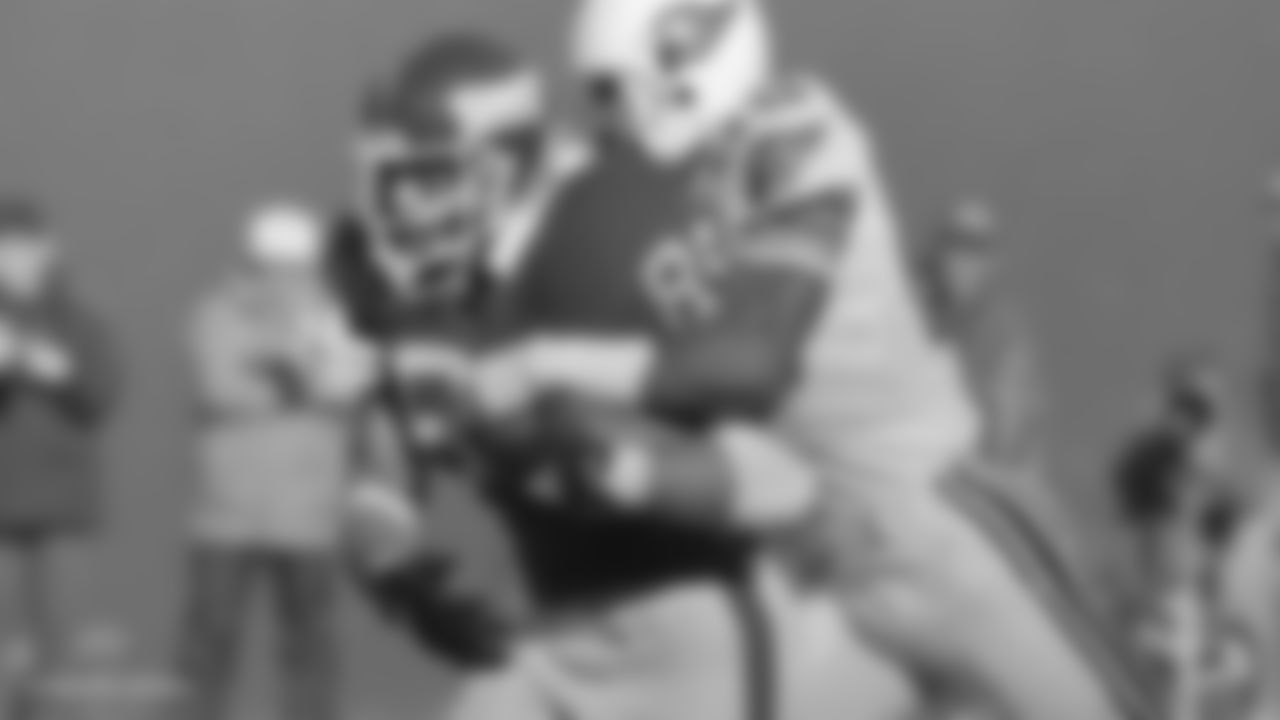
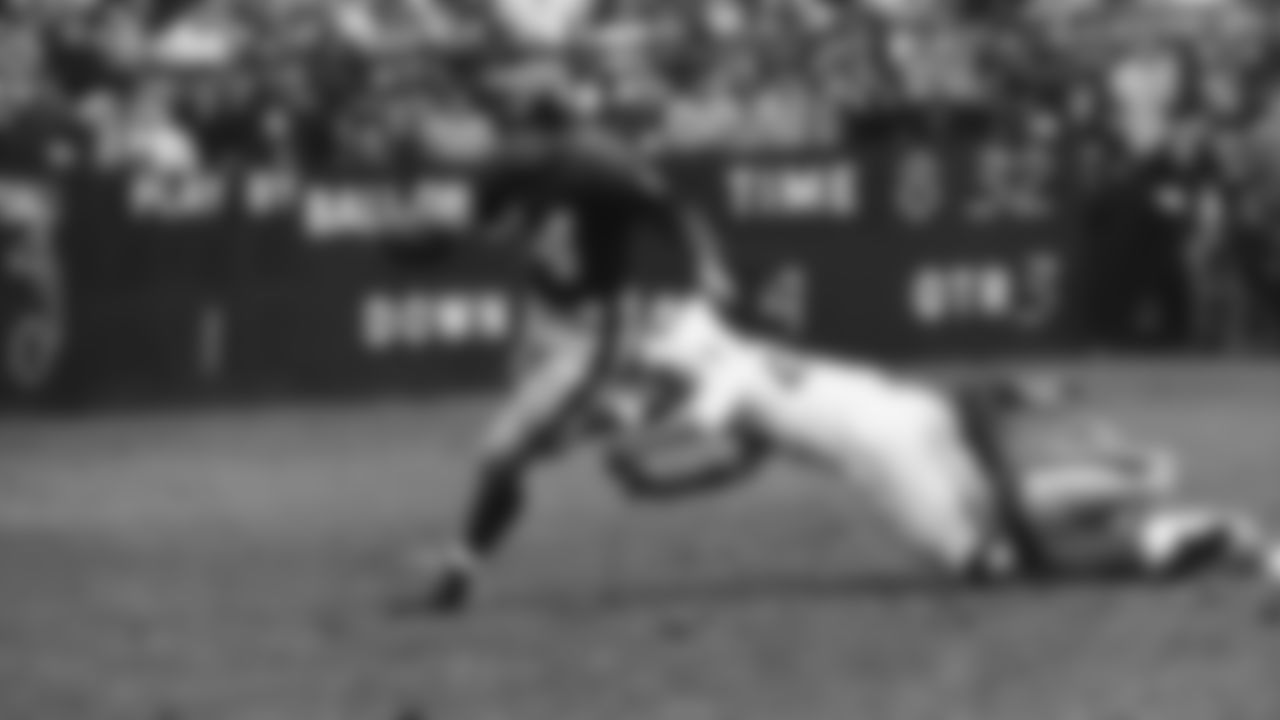
Photo shows Dill Stacey, 24, right, St. Louis Cardinals back, attempts to tackle quarterback Y.A. Tittle, 14, of the New York Giants moments before the latter passed the ball to teammate Phil King, not shown, for a first down in fourth quarter of game at New York?s Yankee Stadium in New York, on Nov. 4, 1962. Giants won 31-28. (AP Photo)
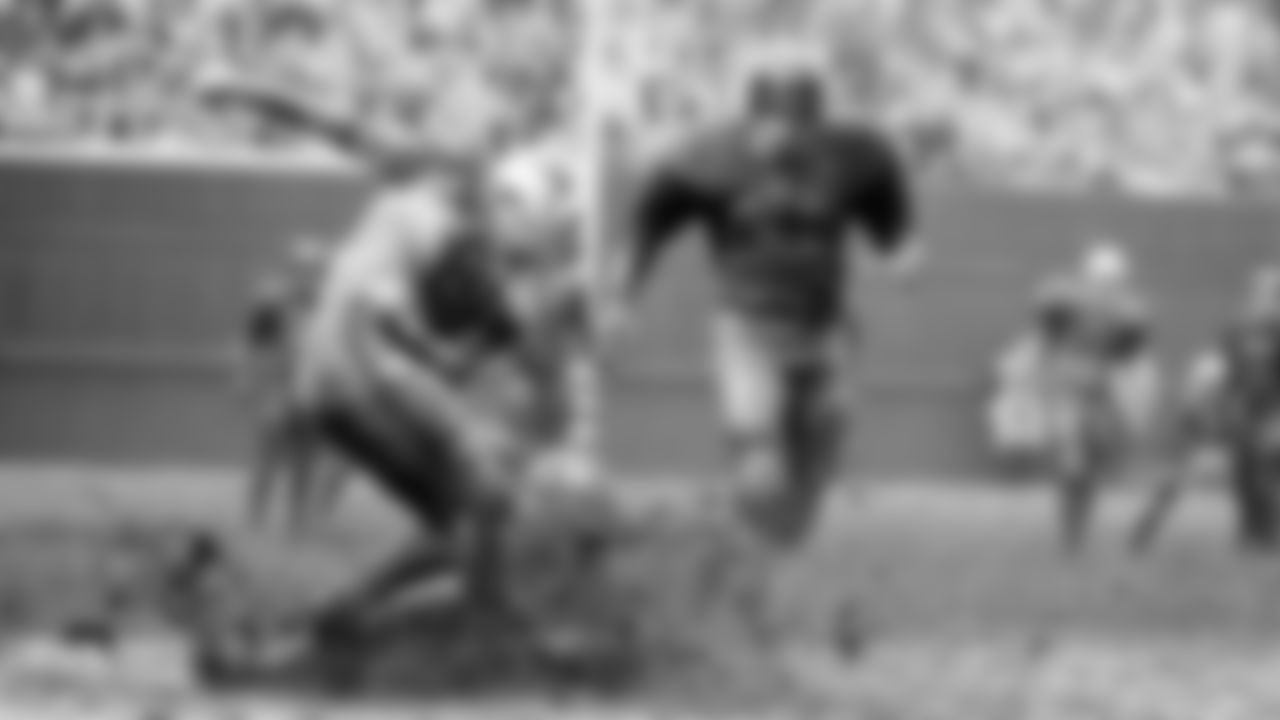
New York Giant Andy Nelson, almost obscured by sheet of flying mud and water, gets a face full of it as he hits the wet deck after knocking pass out of the hands of St. Louis Cardinals Jackie Smith (81) Nov. 15, 1964. Moving in on the action is Lou Slaby. Game was 10-10 tie. (AP Photo/Fred Waters)
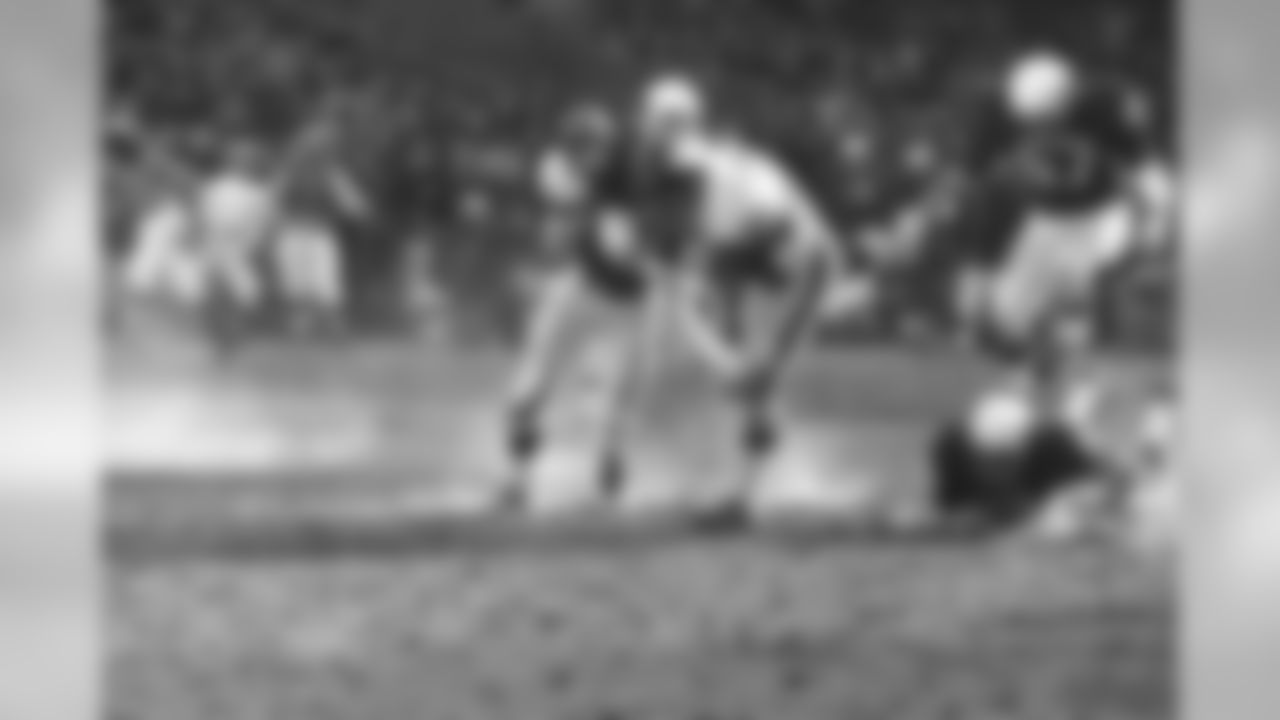
With a ball tucked under his arm, New York Giants Ernie Koy is brought down from behind by St. Louis Cardinals Jerry Stovall in the first period at Yankee Stadium, Dec. 18, 1967, New York. Ernie picked up 15 yards, good for a first down. Cardinal players at right are Larry Stallings (67) and Larry Wilson. The Giants won the final game of the regular National Football season, 37-14. (AP Photo/Harry Harris)
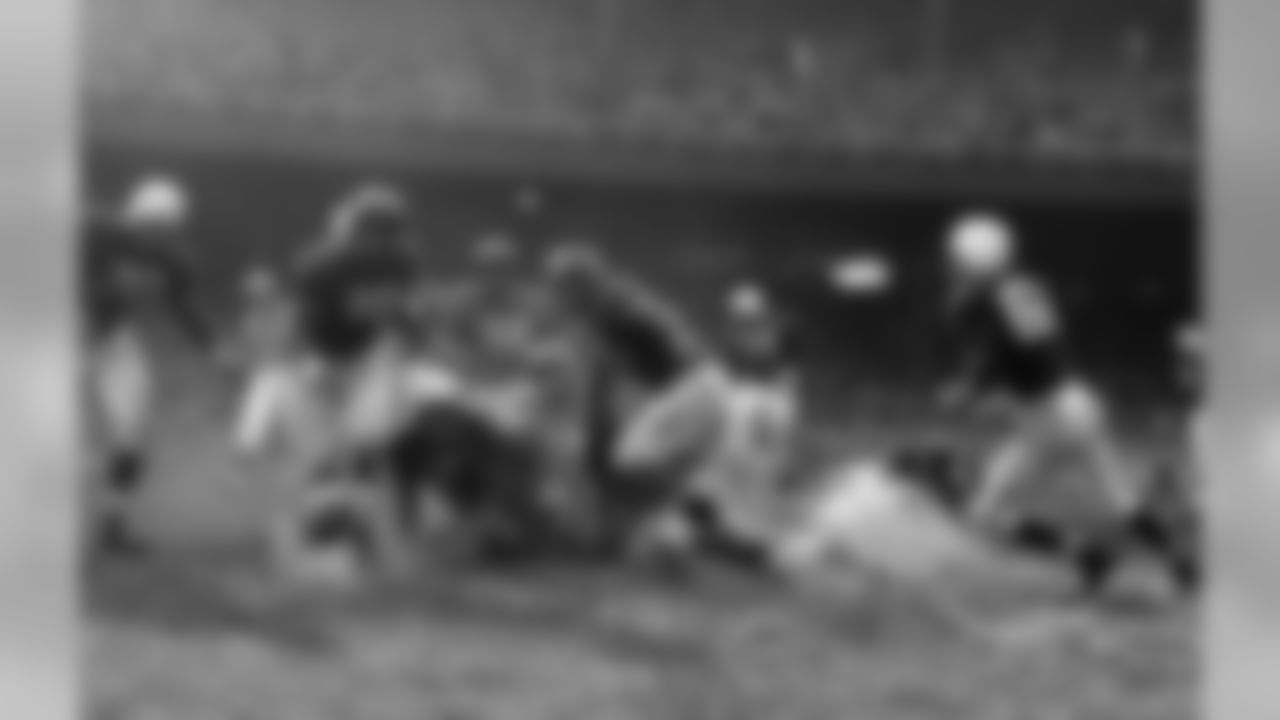
Elmer Angsman (7), Chicago Cardinal back hits the ground after fumbling the ball but teammate Knox Ramsey (70) recovered for a 10-yard gain in second period of National Football League game with the New York Giants in Polo grounds, New York City, Nov. 12, 1950. Other identifiable players are Jon Baker (60), guard; John Mastrangelo (66), guard; Harmon Rowe (22), back; and Bill Milner (61), guard, of the Giants and Bill Fischer (72), Cardinal Tackle. Giants won, 51 to 21. (AP Photo/HH)
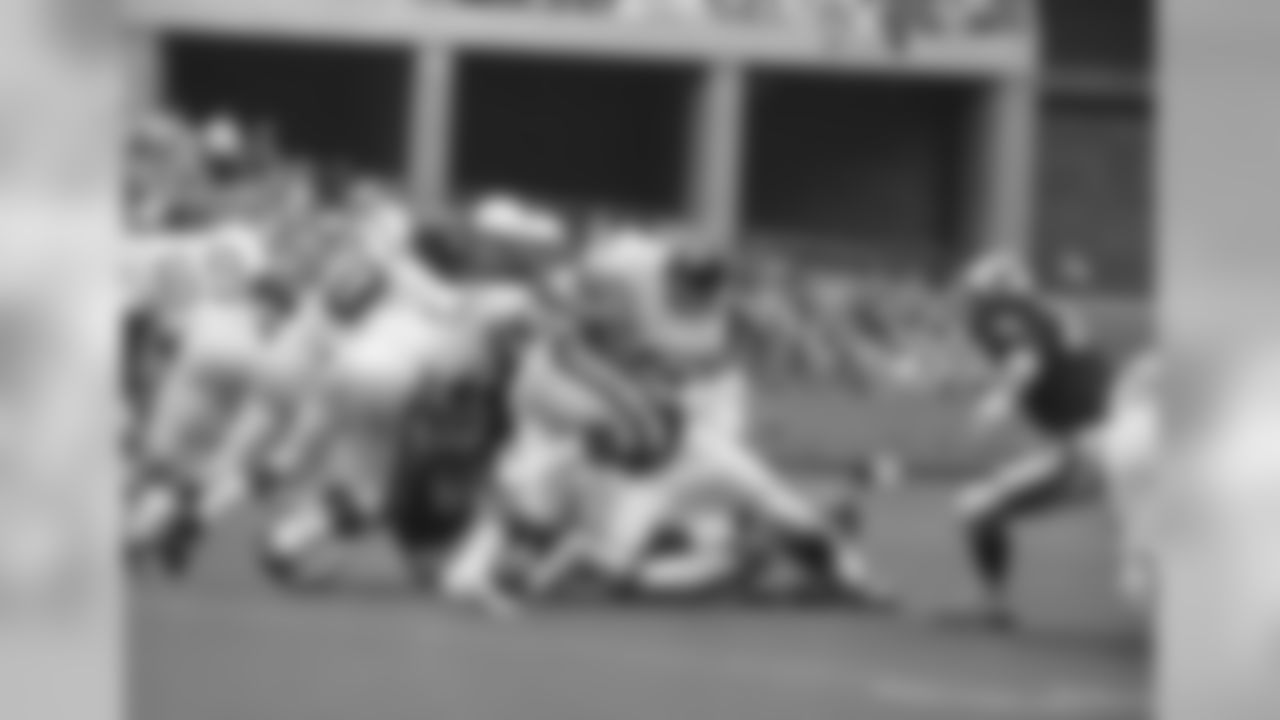
New York Giants running back Tucker Frederickson (24) avoids the jam up of would-be St. Louis Cardinals tacklers as he moves around them for a gain of three yards and a first down, Oct. 4, 1971, St. Louis, Mo. The rest of the players are unidentified. (AP Photo/Fred Waters)
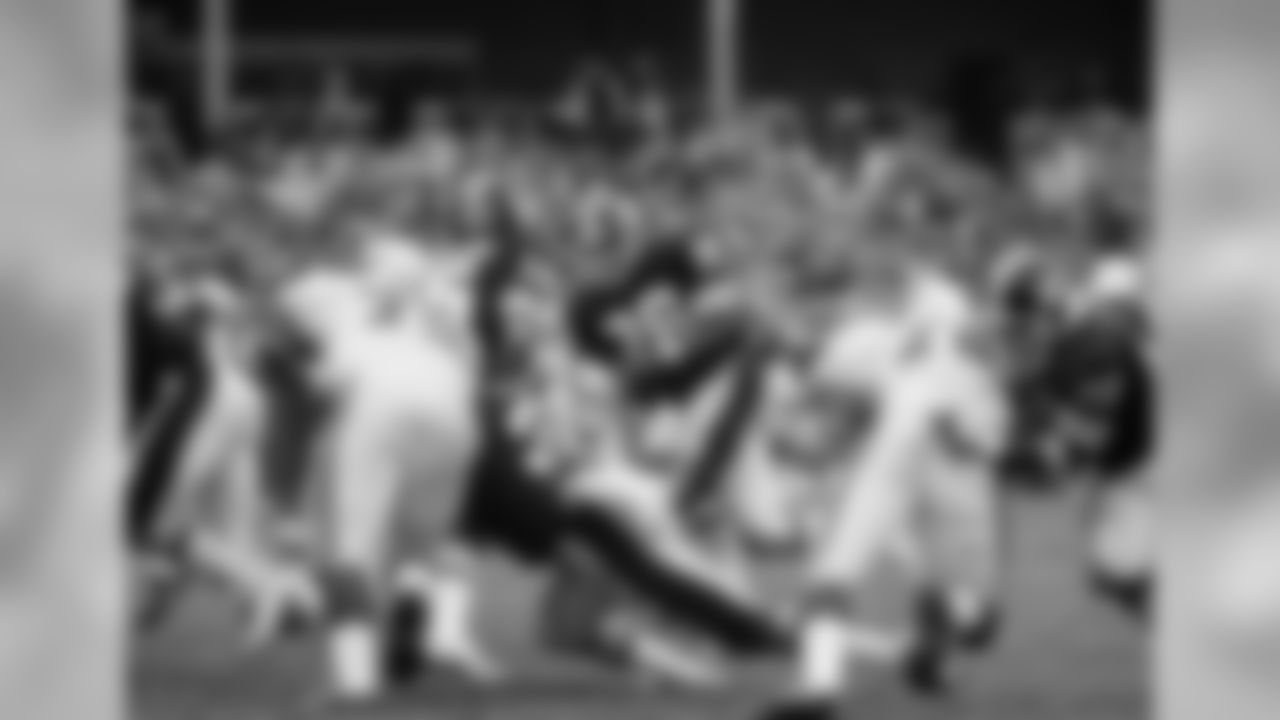
Quarterback Craig Morton (15) of the New York Giants hands off to running back Joe Dawkins (26) in 1975. (AP Photo / Al Messerschmidt)

New York Giants quarterback Phil Simms (11) sets up to pass behind tackle Brad Benson (60) during an NFL game against the St. Louis Cardinals in St. Louis on Dec. 9, 1979. The Cardinals defeated the Giants 29-20. (AP Photo/NFL Photos)
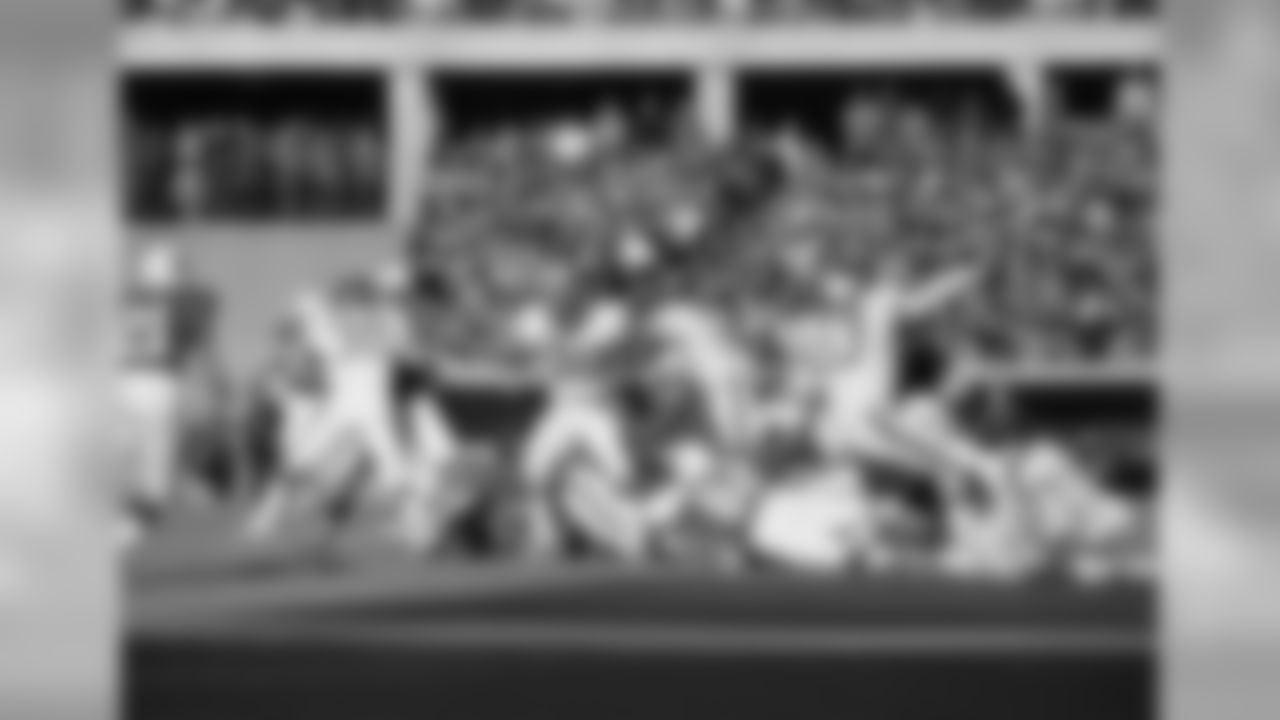
Ron Johnson (30) of the New York Giants is halted in his tracks by Don Parish of the St. Louis Cardinals after Johnson made a gain of five yards in first quarter action on Sunday, Dec. 13, 1970 at St. Louis. (AP Photo)
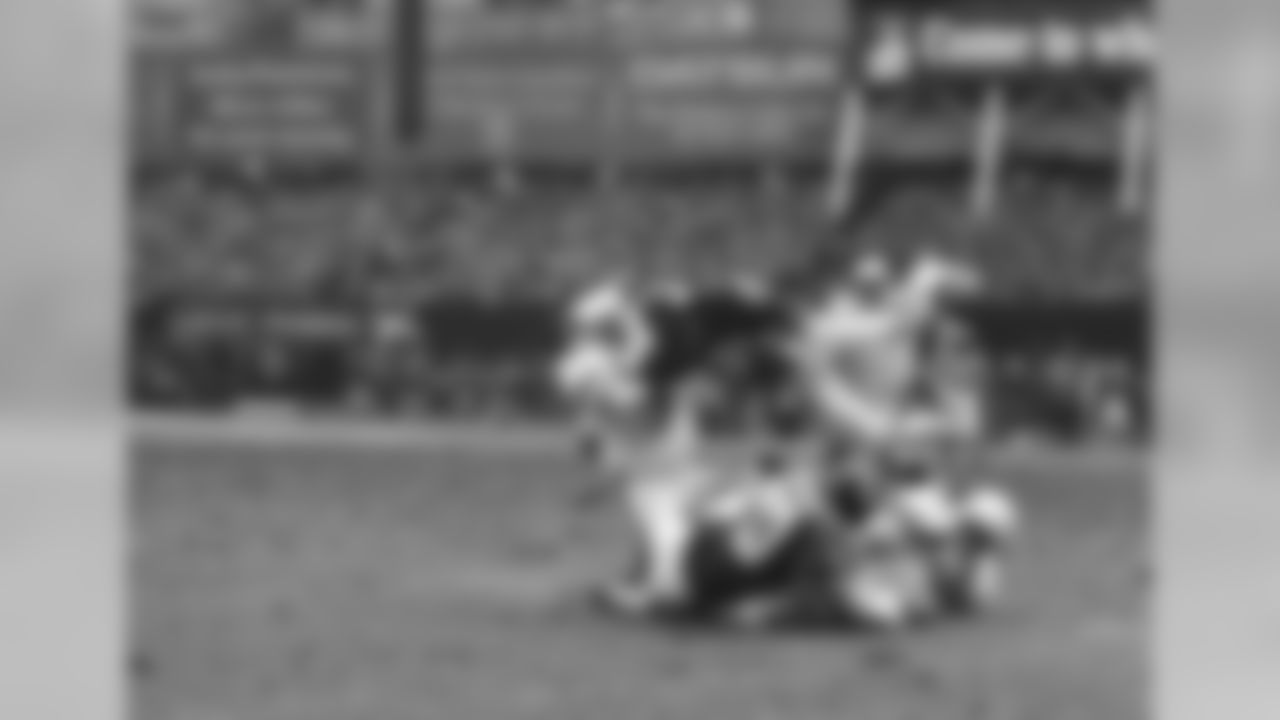
New York Giants Rocky Thompson takes a flying leap for six-yard gain during the second quarter of game with St. Louis Cardinals at Yankee Stadium, Nov. 28, 1971, New York. Other identifiable players are Giants Bob Hyland (70), foreground, and Cardinals Norm Thompson (43), right. St. Louis won, 24-7. (AP Photo/Harry Harris)
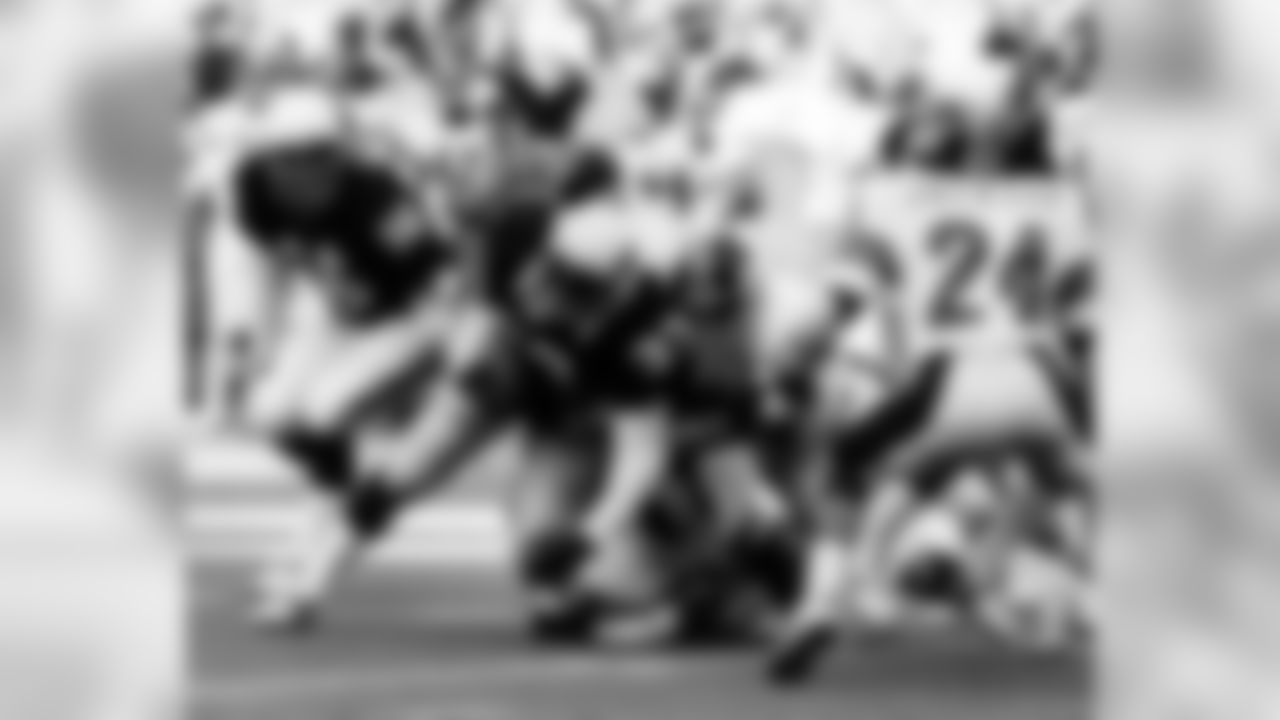
St. Louis Cardinals running back Theotis Brown (33) is stopped by a New York Giants defender during an NFL game in St. Louis on Dec. 9, 1979. The Cardinals defeated the Giants 29-20. (AP Photo/NFL Photos)

Ron Shivers (27) of the St. Louis Cardinals is brought down by New York Giants Otto Brown (21), Dick Houston (behind Shivers), and Pat Hughes (left, on ground) after Shivers returned the kick off to the 22-yard line in first quarter National Football League action on Sunday, Dec. 13, 1970 at St. Louis. (AP Photo)
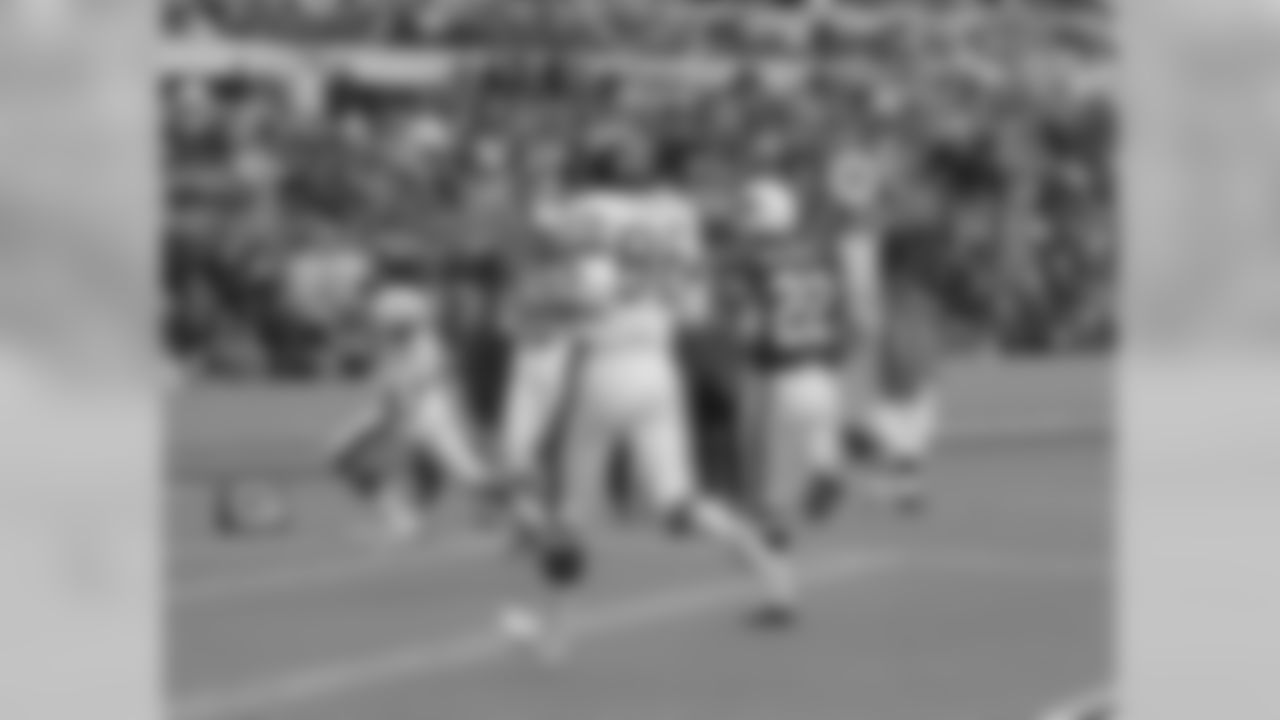
New York Giants quarterback Fran Tarkenton one-hands the ball as he runs across the goal line after carrying it himself from four yards out in the second quarter, Sunday, Dec. 13, 1970, St. Louis, Mo. Teammate Aaron Thomas (88) follows Tarkenton. The rest of the players are unidentified. (AP Photo)
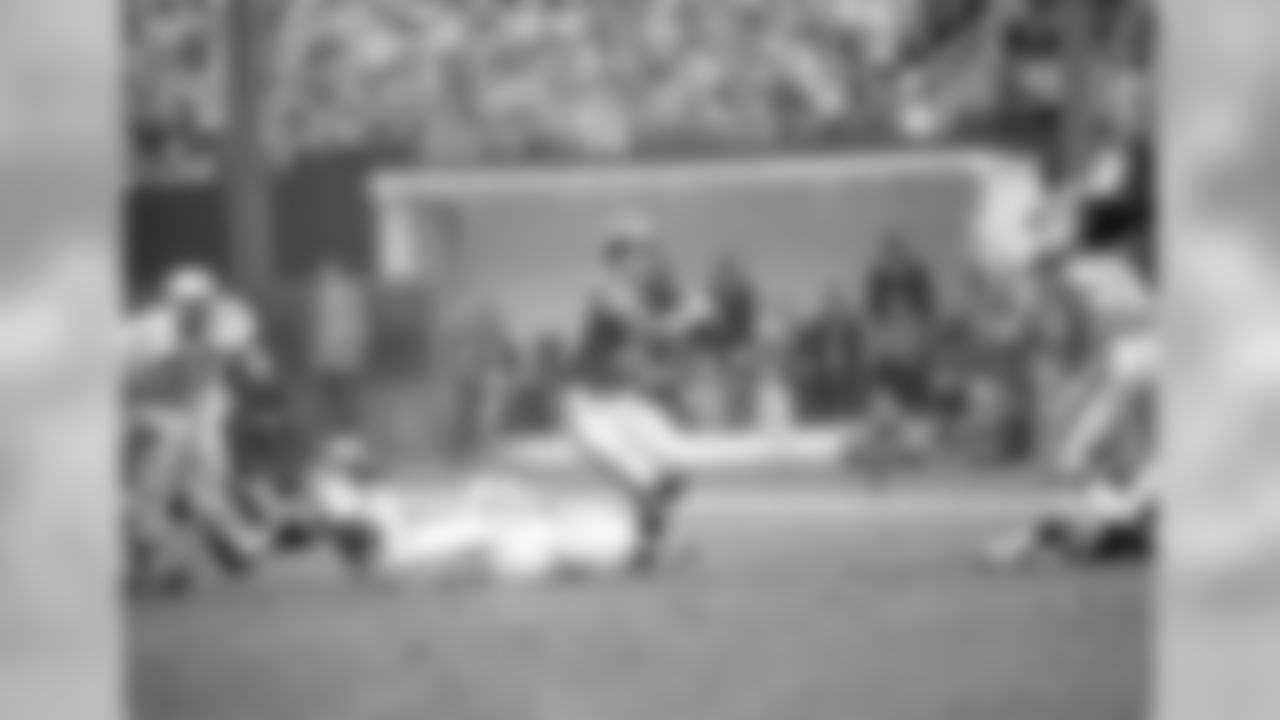
Fran Tarkenton, New York Giants quarterback, shows why he is known for his scrambling finesse as he evades Cardinals in first quarter of game and prepares to throw a pass in New York, Oct. 28, 1970. Selected by the Associated Press as the NFL's offensive player of the week, Tarkenton staged the most productive aerial show of his career by throwing five touchdown passes. (AP Photo/Spencer Jones)
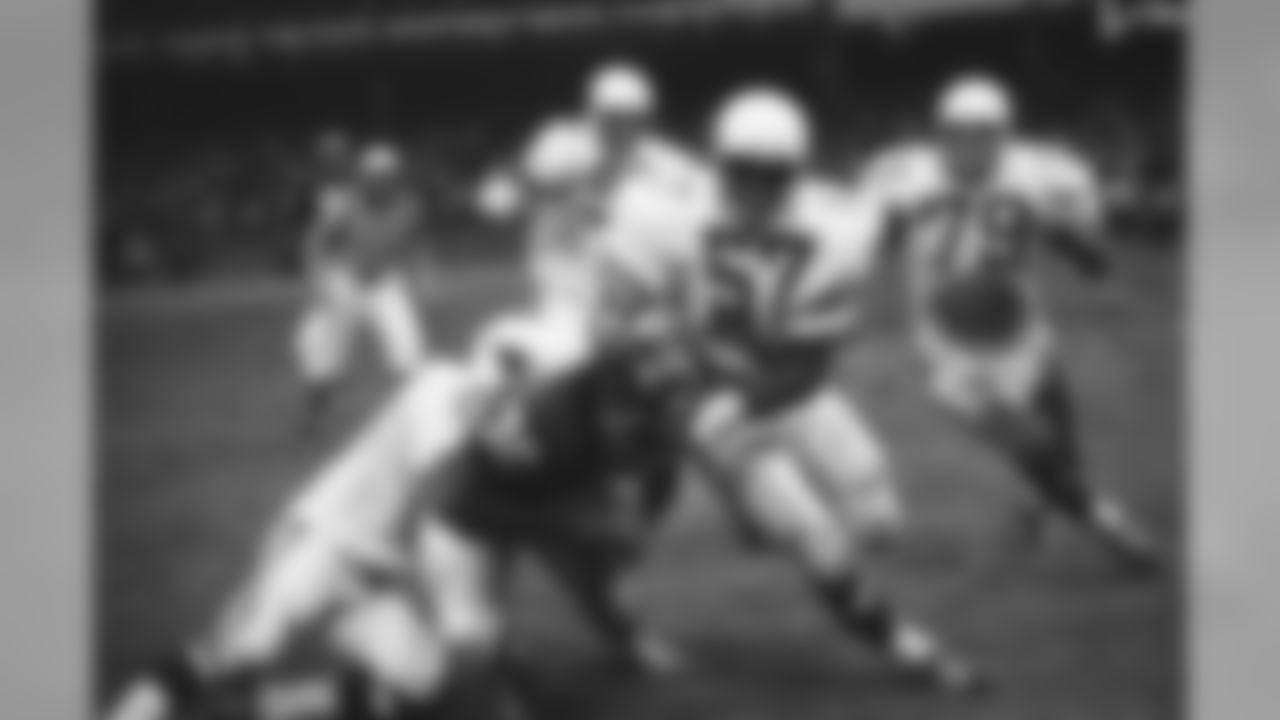
Ron Johnson (30) of the New York Giants is tackled from behind by Larry Wilson (8) of the St. Louis Cardinals after making 17-yard gain in fourth quarter in New York on Sunday, Oct. 26, 1970. Making head tackle is Don Parish (57) of the Cardinals, followed by teammates Joe Schmiesing (82) and Chuck Walker (79). (AP Photo)
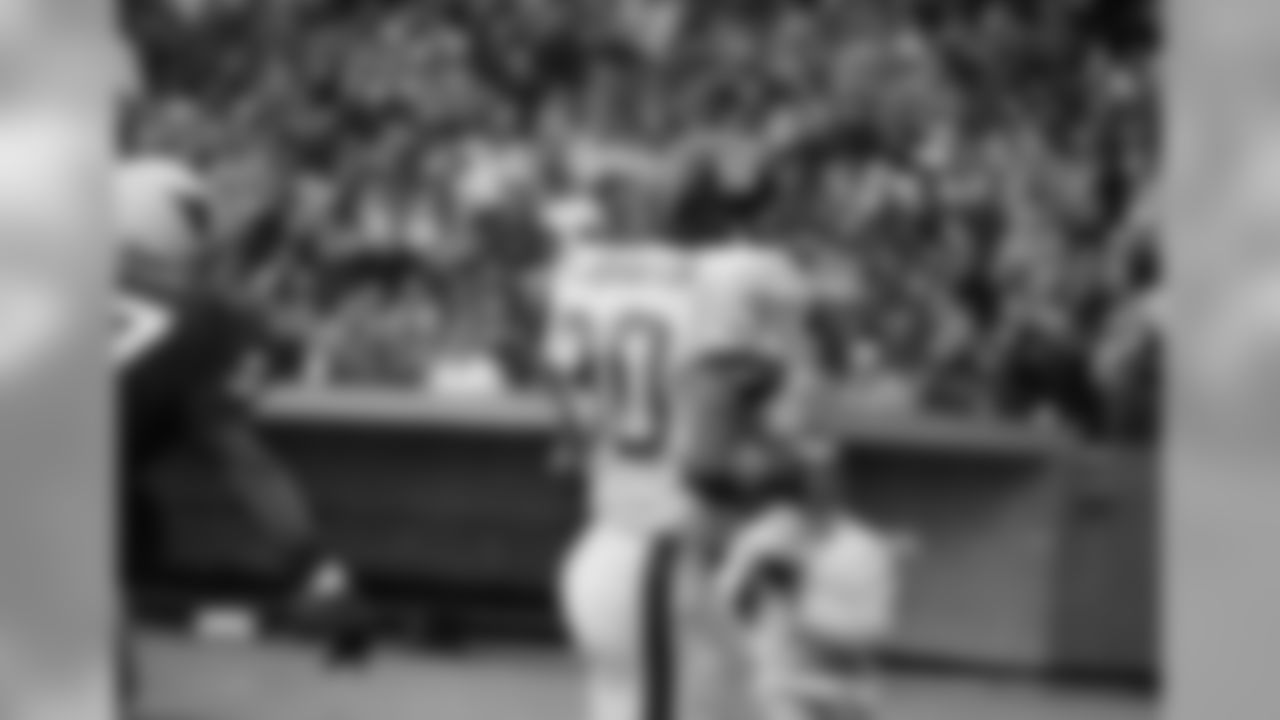
Don Parish of St. Louis Cardinals reaches out, but can?t get, Ron Johnson (30) of New York Giants in third quarter National Football League action on Sunday, Dec. 14, 1970 at St. Louis, and went on to score. New York beat St. Louis, 34-17. (AP Photo)
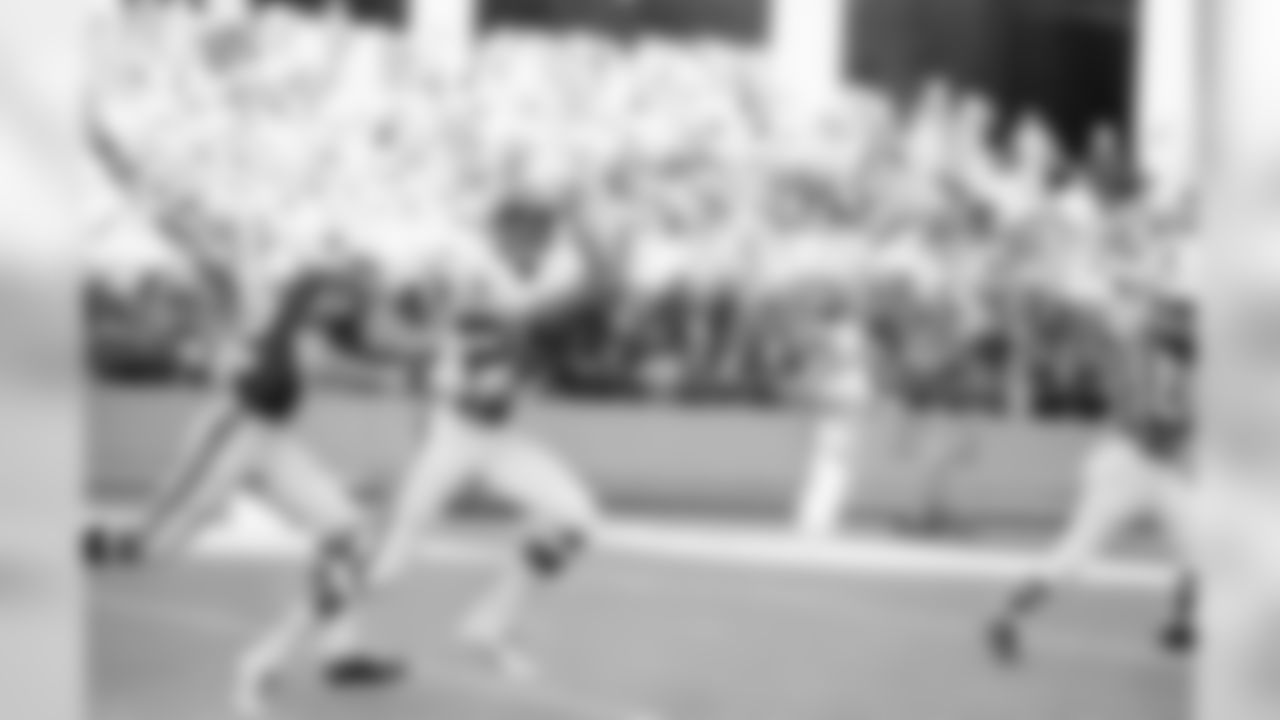
Clifton McNeil (18) of New York Giants pulls in pass from quarterback Fran Tarkenton for a gain of 45 yards as Roger Wehrli (22) closes in during third quarter National Football League action Sunday, Dec. 13, 1970 at St. Louis. Play set up New York for touchdown and final win over St. Louis, 34-17. (AP Photo)

Conrad Dobler,left, of the St. Louis Cardinals, tries to block a charging George Martin of the New York Giants during the fourth period of the game at Giants Stadium, Dec. 5, 1977. Martin was trying to sack Jim Hart, the Cards' quarterback, and while Dobler stopped Martin, he received a 15-yard penalty for "illegal use of the hands." (AP Photo/Ray Stubblebine)
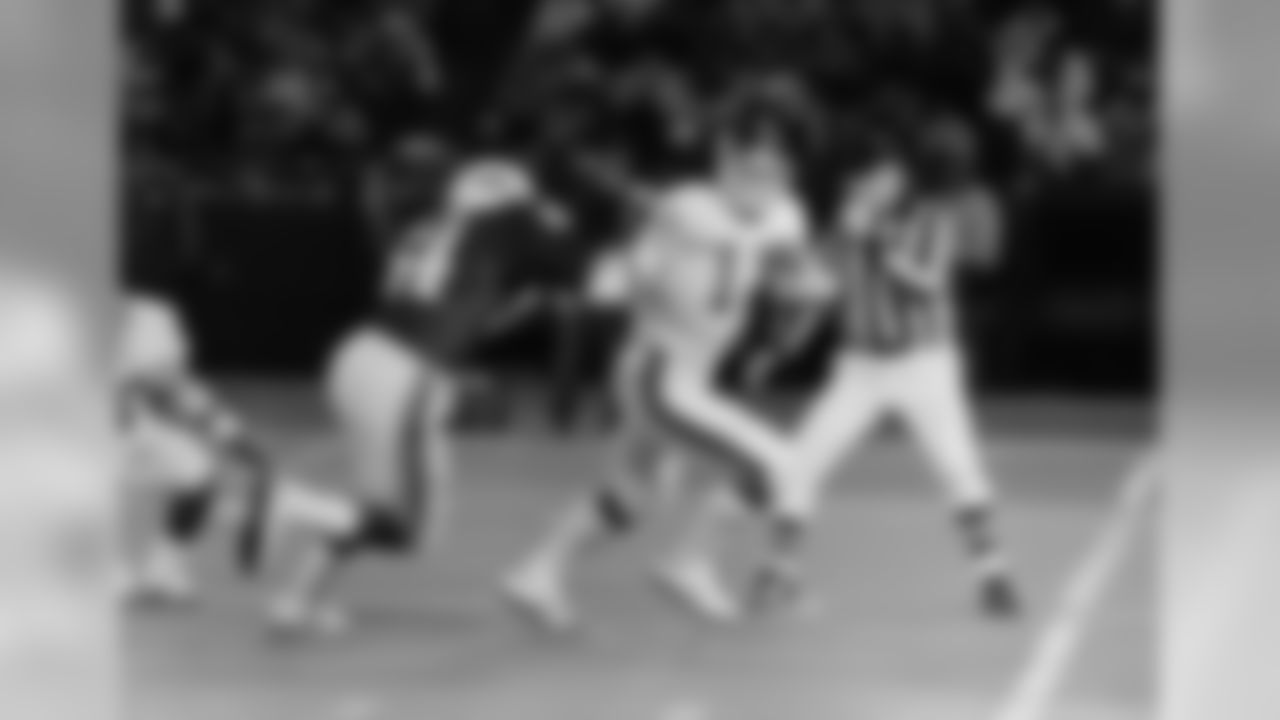
New York Giants quarterback Phil Simms (11) attempts to escape the grasp of St. Louis Cardinals E.J. Junior (54) during the second half in St. Louis, Nov. 24, 1985. (AP Photo/Oscar Waters)
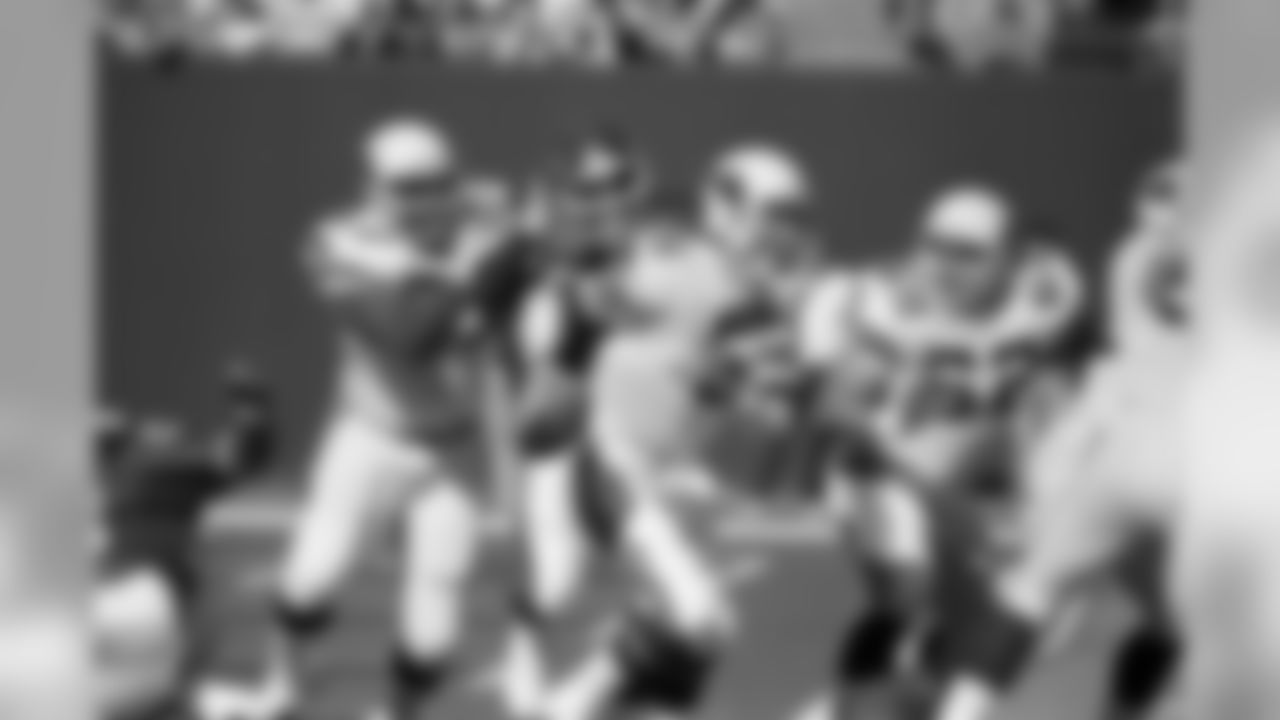
New York Giants Leonard Marshall cuts in front of the Phoenix Cardinals Luis Sharpe (67) to sack quarterback Gary Hogeboom (5) in the fourth quarter of Sunday's game at Giants Stadium in East Rutherford, N.J., Sept. 25, 1989. The Giants defeated the Cardinals 35-7. (AP Photo/Bill Kostroun)
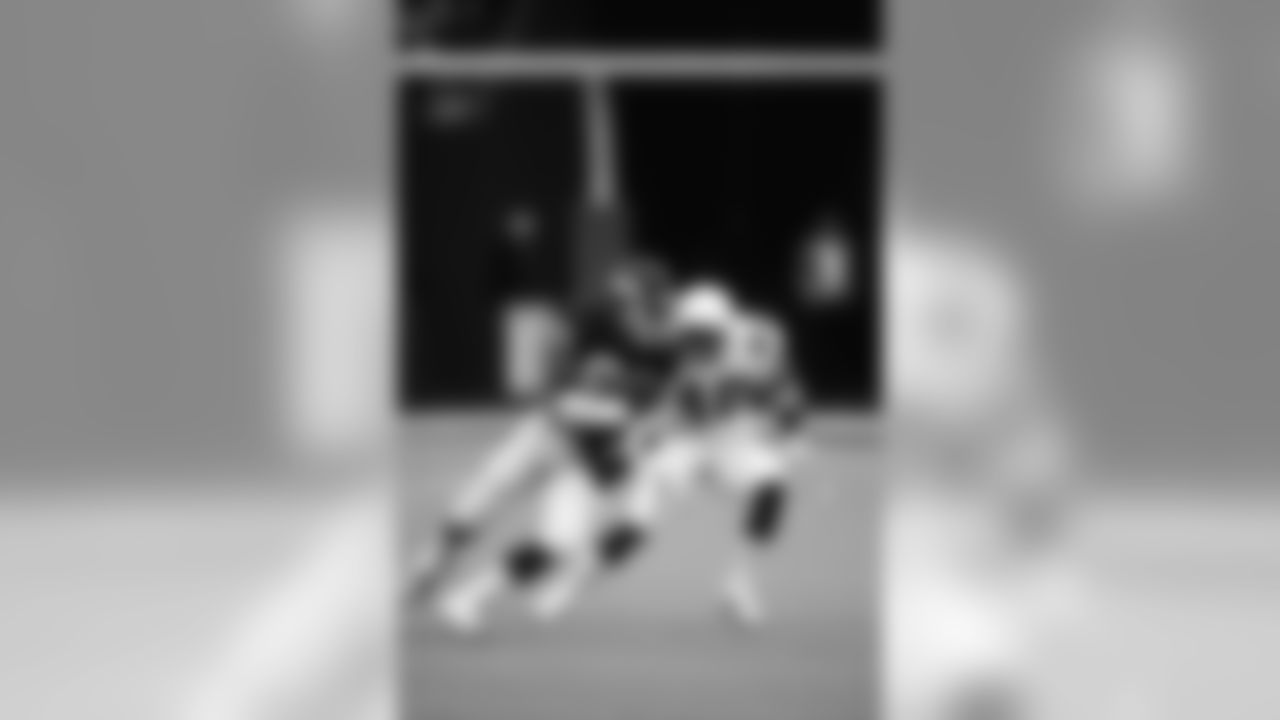
New York Giants wide receiver Lionel Manuel (86) runs upfield with a reception as St. Louis Cardinals cornerback Lionel Washington (48) closes in during an NFL game in East Rutherford on November 18, 1984. The Giants defeated the Cardinals 16-10. (AP Photo/Chuck Solomon)
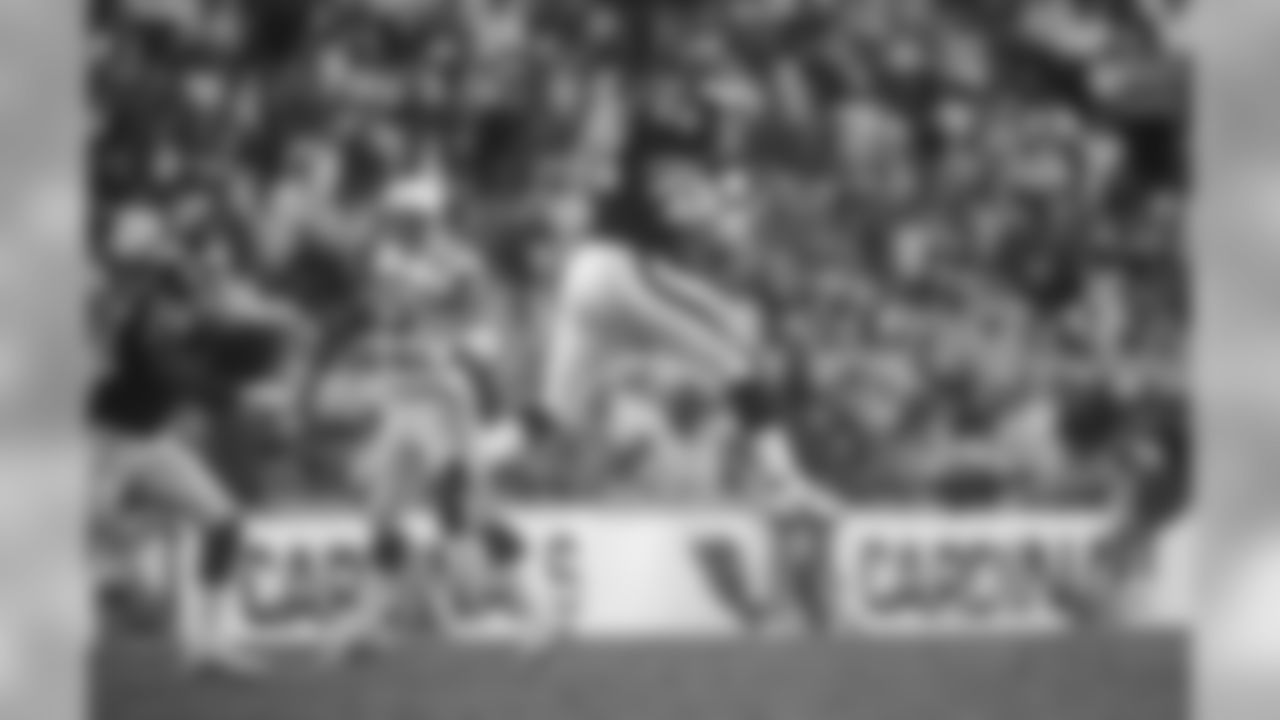
New York Giants linebacker Pepper Johnson (52) makes a leaping interception during an NFL game against the Phoenix Cardinals on November 5, 1989. The Giants defeated the Cardinals 20-13. (Peter Read Miller via AP)
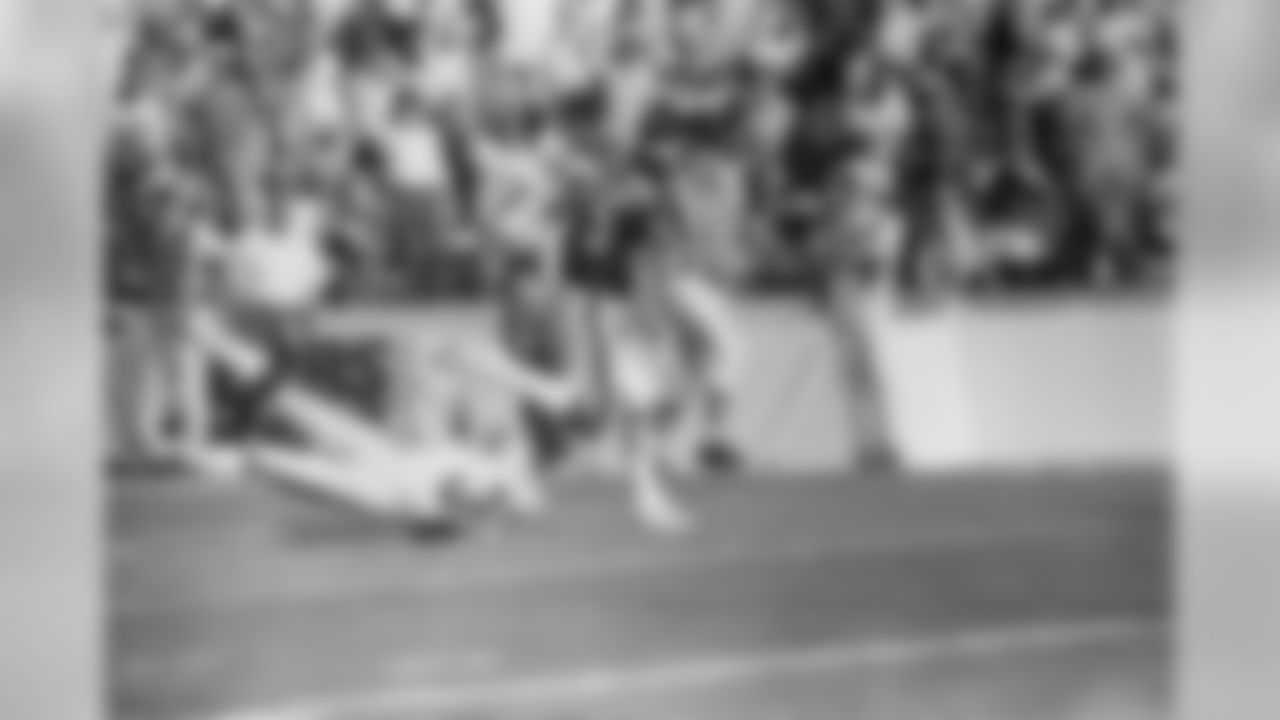
New York Giants quarterback Jeff Hostetler scrambles for 19 yards and a touchdown against the Phoenix Cardinals during the first quarter of their game in Tempe, Arizona Sunday, Nov. 5, 1989. The Giants led 14-3 at the half. (AP Photo/Rob Schumacher)
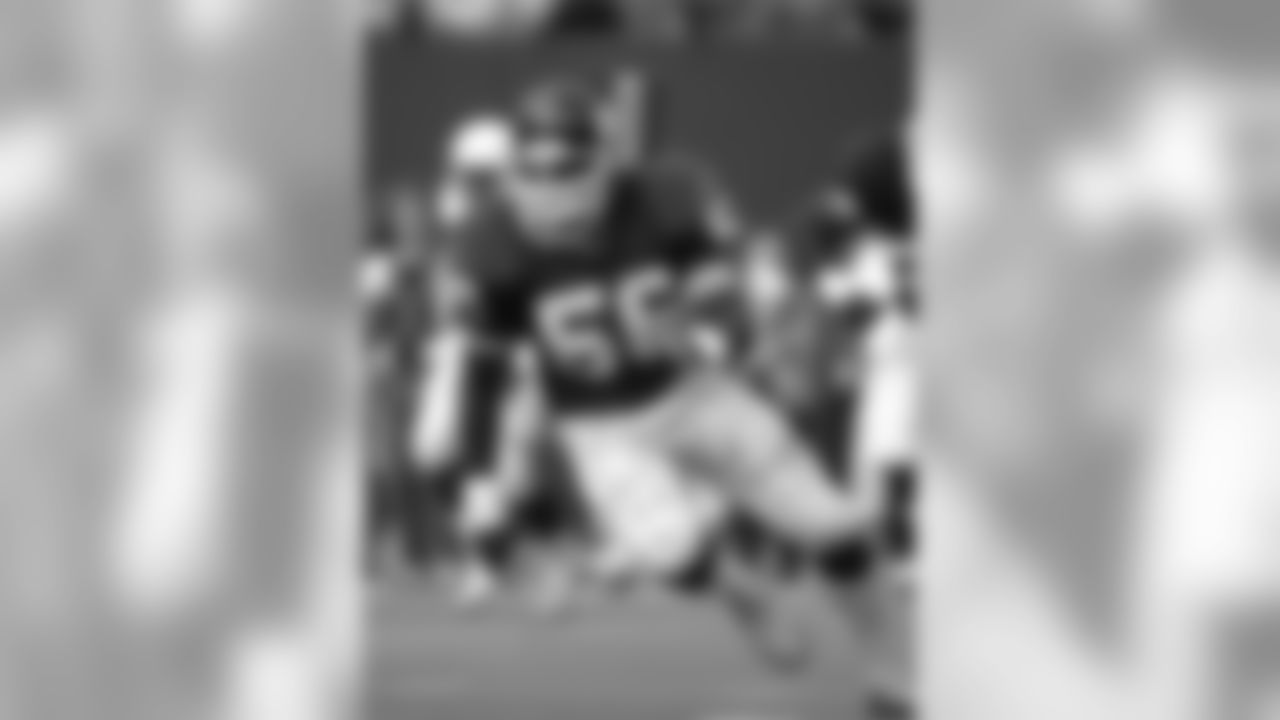
New York Giants linebacker Lawrence Taylor (56) is seen in action during an NFL game against the St. Louis Cardinals Sept. 22, 1985, in East Rutherford, N.J. (Tony Tomsic via AP)
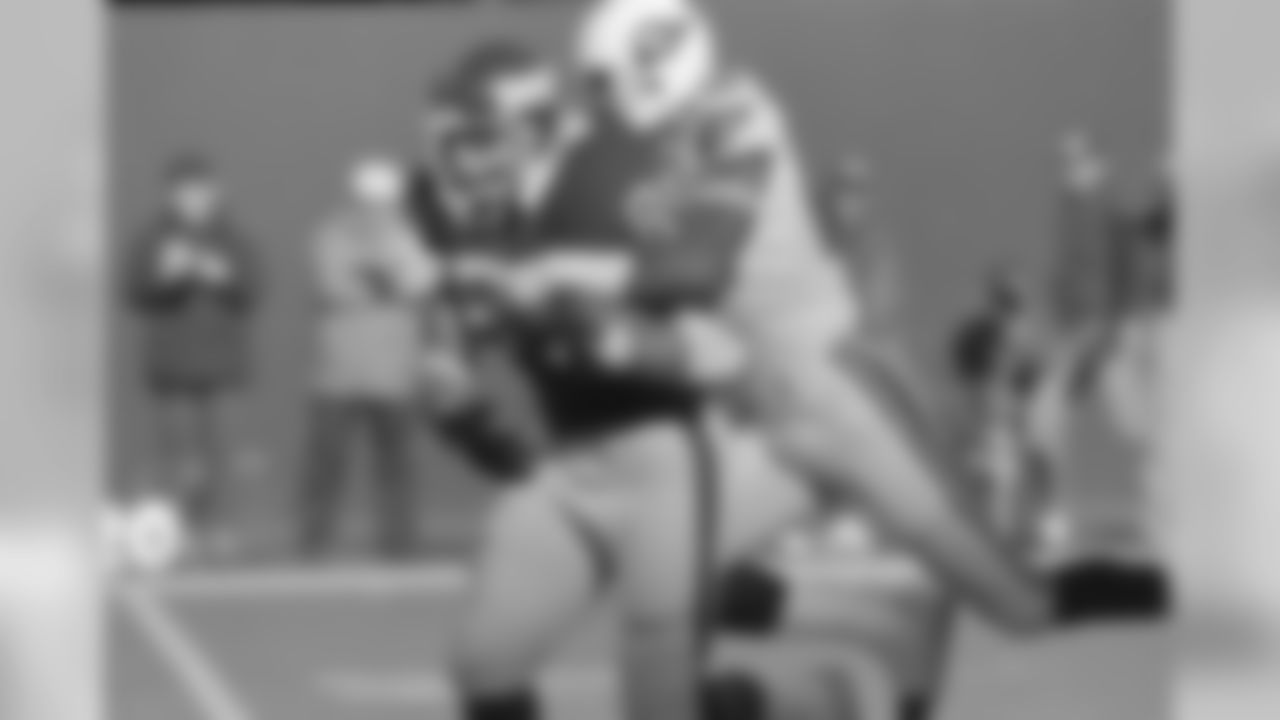
Phoenix Cardinals safety Laster Lylcs, right, holds tight to bring down the New York Giants Mark Bavaro after he caught a 36 yard pass from quarterback Phil Simms in the first quarter of NFL game at Giants Stadium in East Rutherford, New Jersey, Sunday, Dec. 4, 1988. (AP Photo/Bill Kostroun)
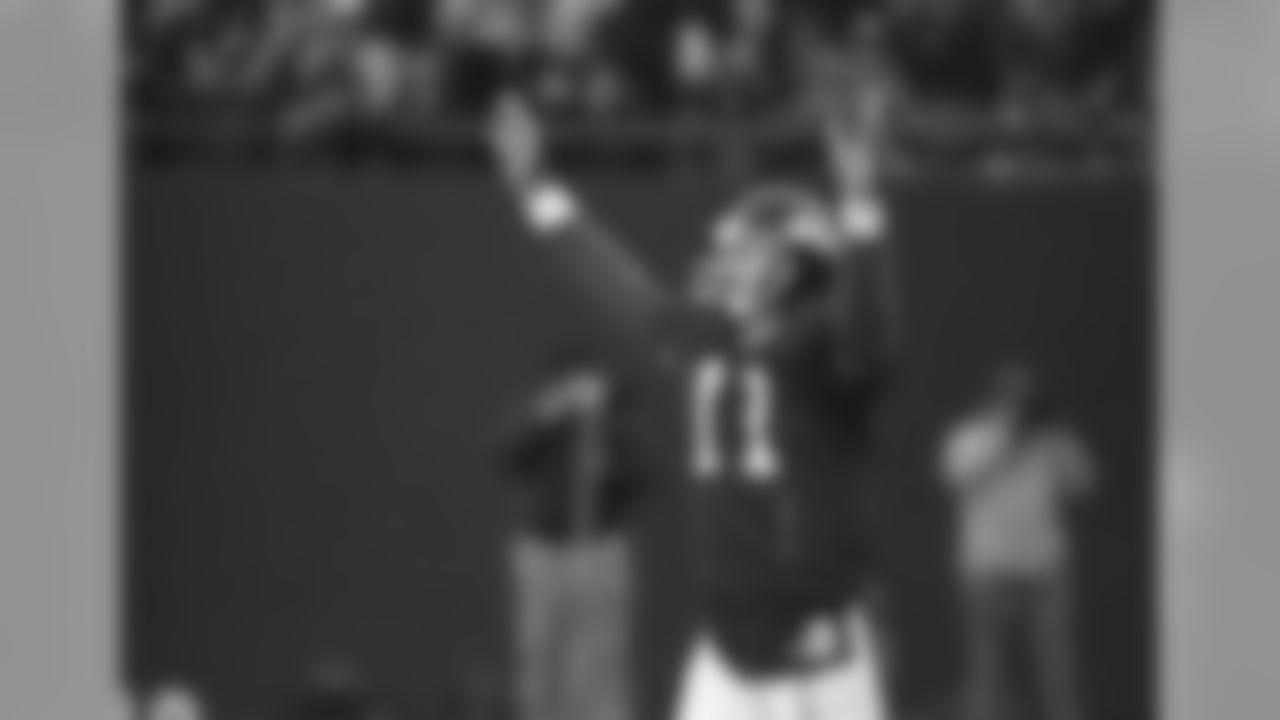
New York Giants quarterback Phil Simms (11) reacts after throwing a second quarter touchdown to wide receiver Stacy Robinson against the Phoenix Cardinals at Giants Stadium in N.J., Dec. 4, 1988. (AP Photo/Ray Stubblebine)
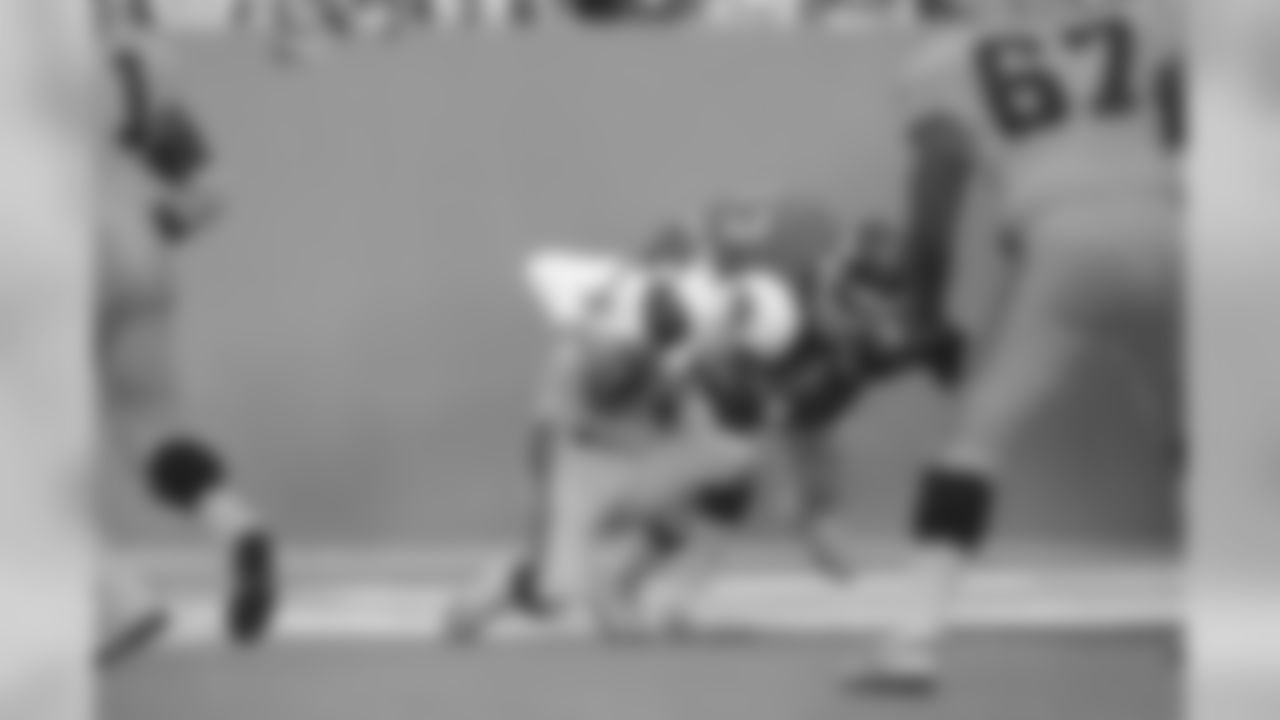
St. Louis Cardinals quarterback Neil Lomax is sacked by New York Giants linebacker Harry Carson in the first quarter of the game, Dec 14, 1986 at Giants Stadium in East Rutherford. (AP Photo/Susan Ragan)
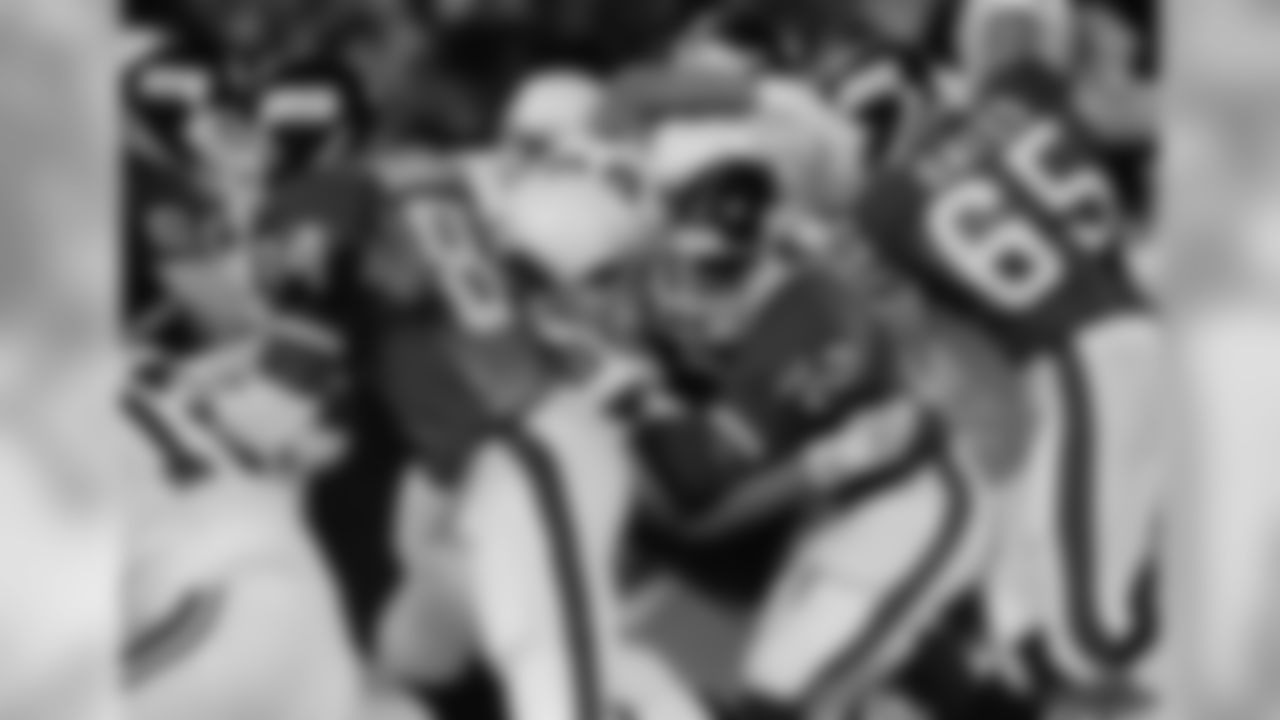
New York Giants' Lee Rouson carries the ball past St. Louis Cardinals' Collin Scotts, (69), for a three-yard gain in the forth quarter of play in East Ratherfort, N.J. on Sunday, October 26, 1987. The Gaints beat the Cardinals 30-7 for their first win of the season. (AP Photo/Peter Morgan)

New York Giants wide receiver Amani Toomer (89) celebrates with teammate David Patten after Toomer scored on a 56-yard touchdown reception during the second quarter against the Arizona Cardinals Sunday, Nov. 16, 1997, at Giants Stadium in East Rutherford, N.J. The Giants won 19-10. (AP Photo/John Dunn)
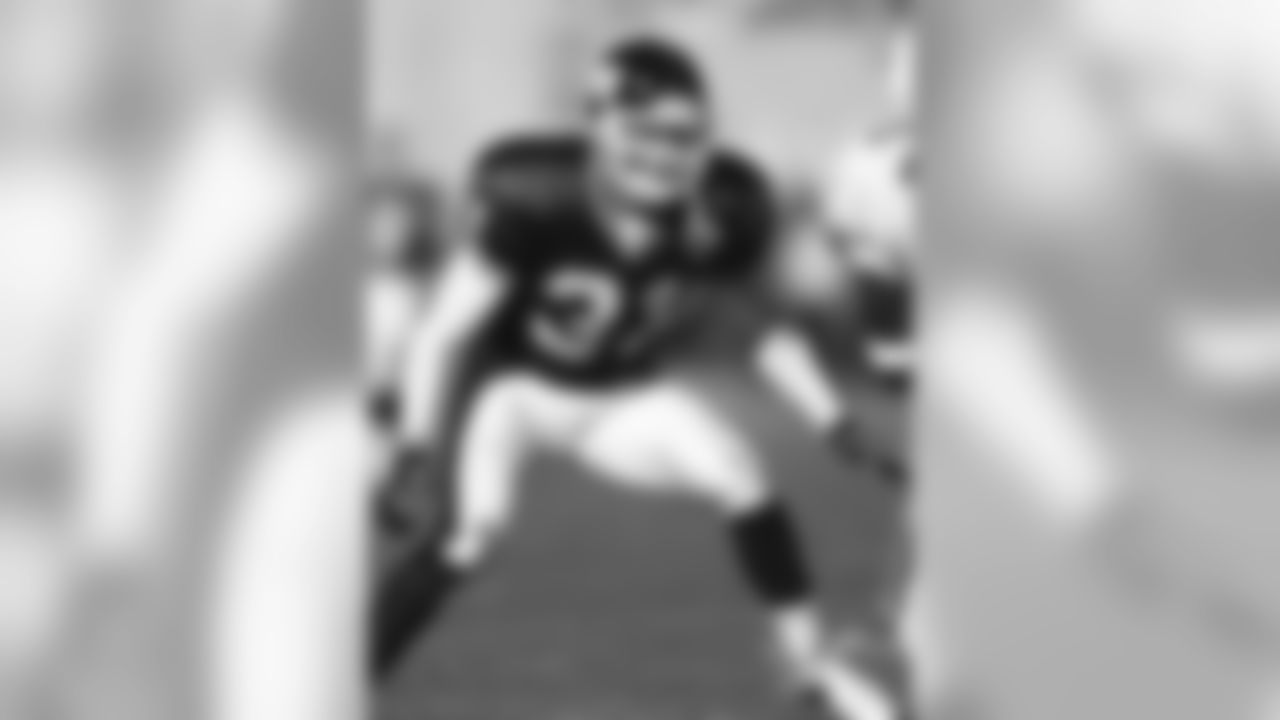
New York Giants cornerback Jason Sehorn (31) is seen in action during an NFL game against the Arizona Cardinals Oct. 10, 1999, in Glendale, Ariz. (Allen Kee via AP)
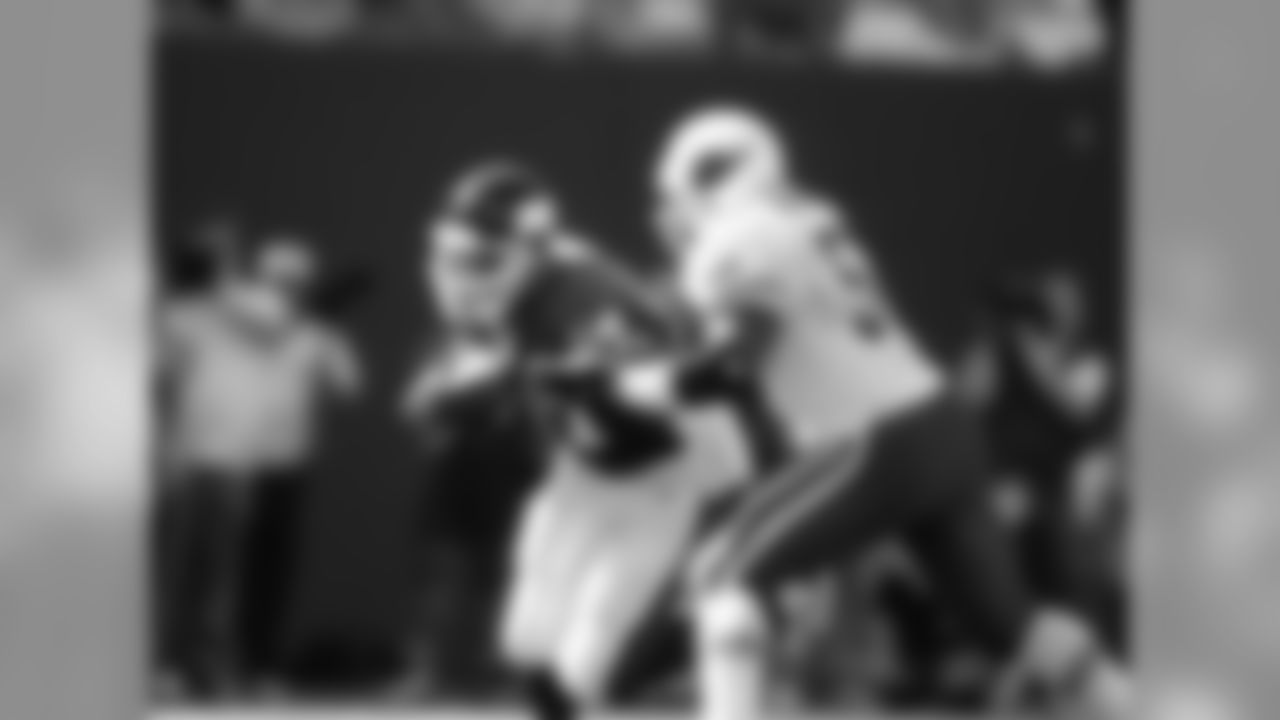
New York Giants tight end Howard Cross (87) rushes upfield with the ball during an NFL Game against the Arizona Cardinals Oct. 18, 1998, in East Rutherford, N. J. (Allen Kee via AP)
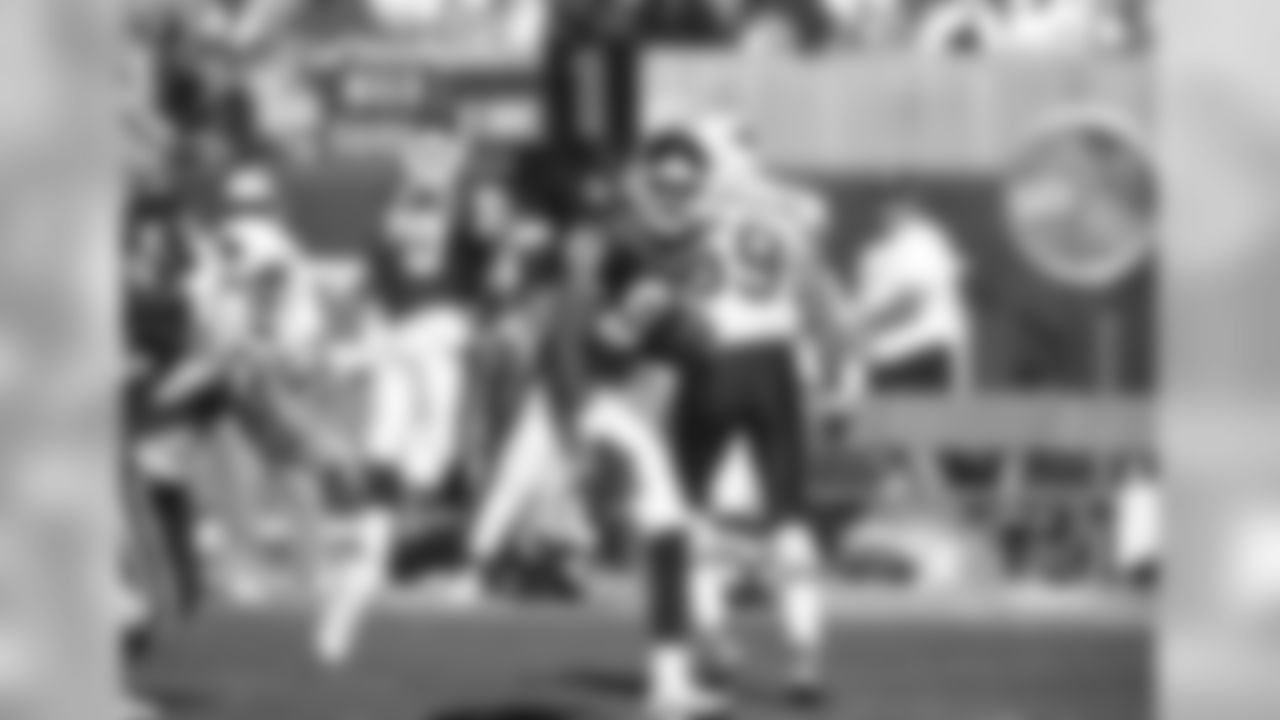
New York Giants wide receiver Amani Toomer (81) is seen in action during an NFL game against the Arizona Cardinals Oct. 10, 1999, in Glendale, Ariz.(Allen Kee via AP)
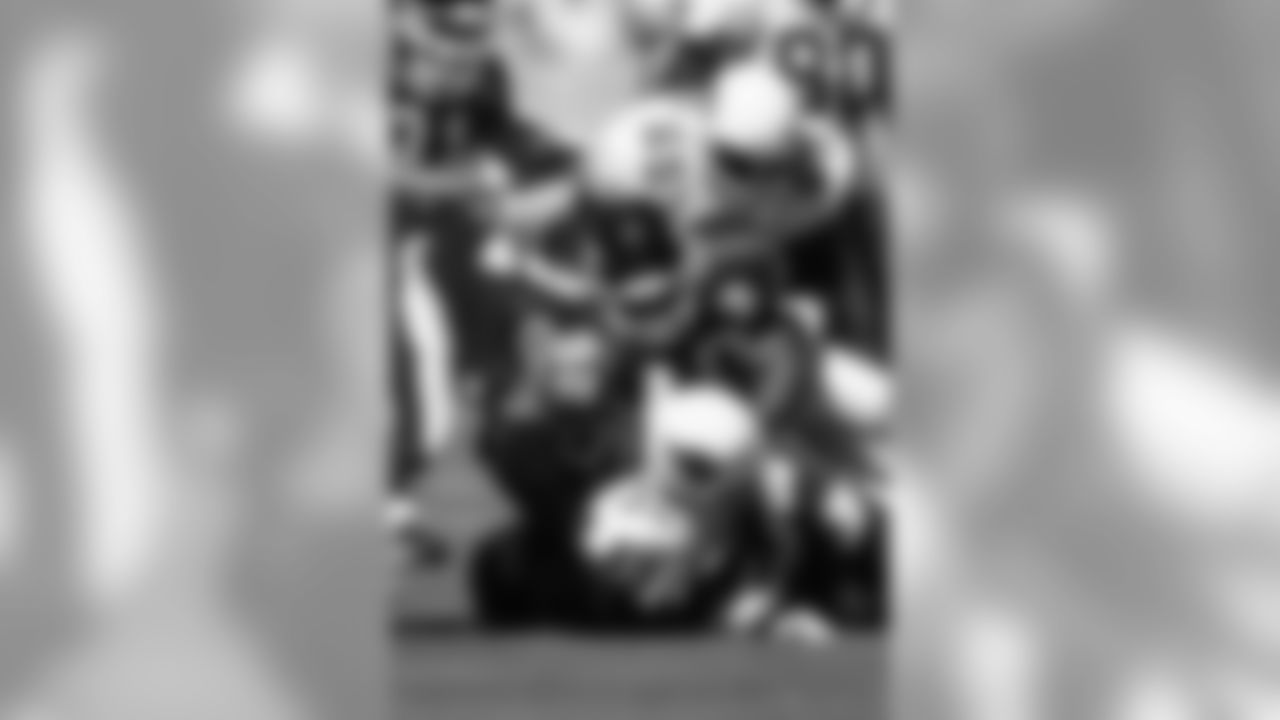
New York Giants defensive end Michael Strahan (92) is seen in action during an NFL game against the Arizona Cardinals Oct. 10, 1999, in Glendale, Ariz. (Allen Kee via AP)
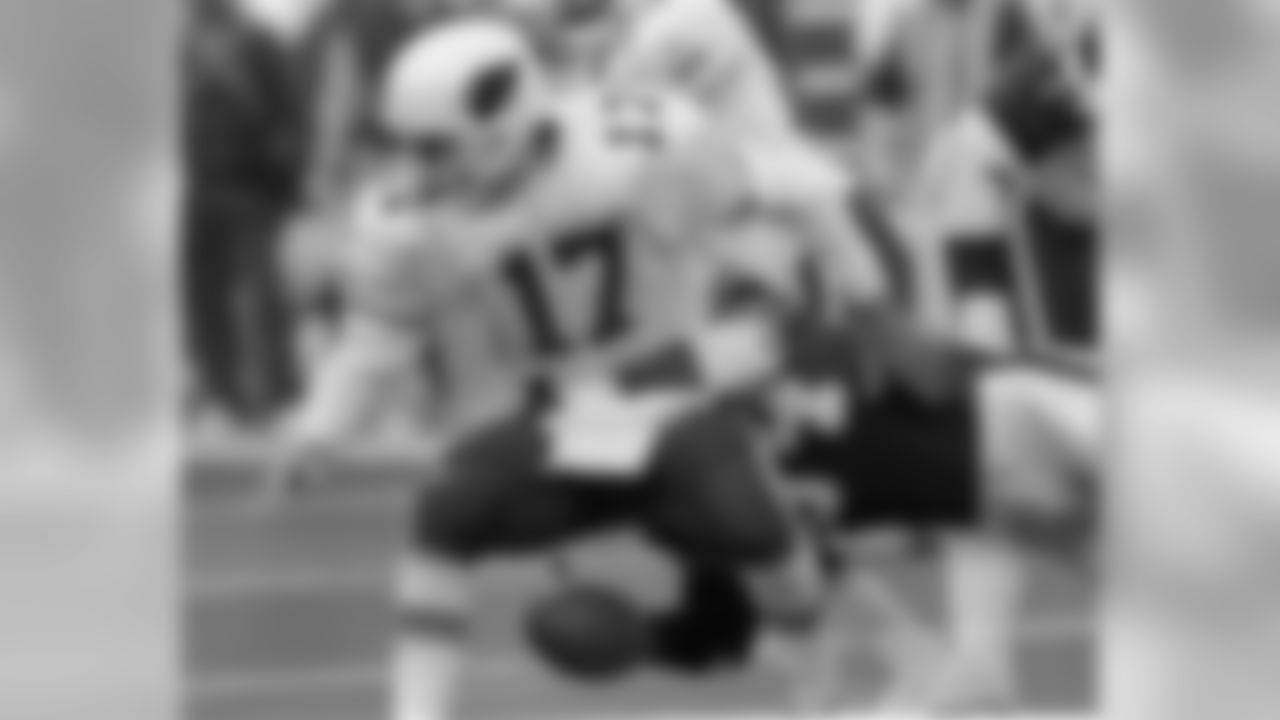
Arizona Cardinals quarterback Dave Brown (17) loses the ball as he is sacked by New York Giants defensive end Cedric Jones during the first quarter Sunday, Nov, 28, 1999, at Giants Stadium in East Rutherford, N.J. Giants defensive end Michael Strahan recovered the fumble. (AP Photo/Bill Kostroun)
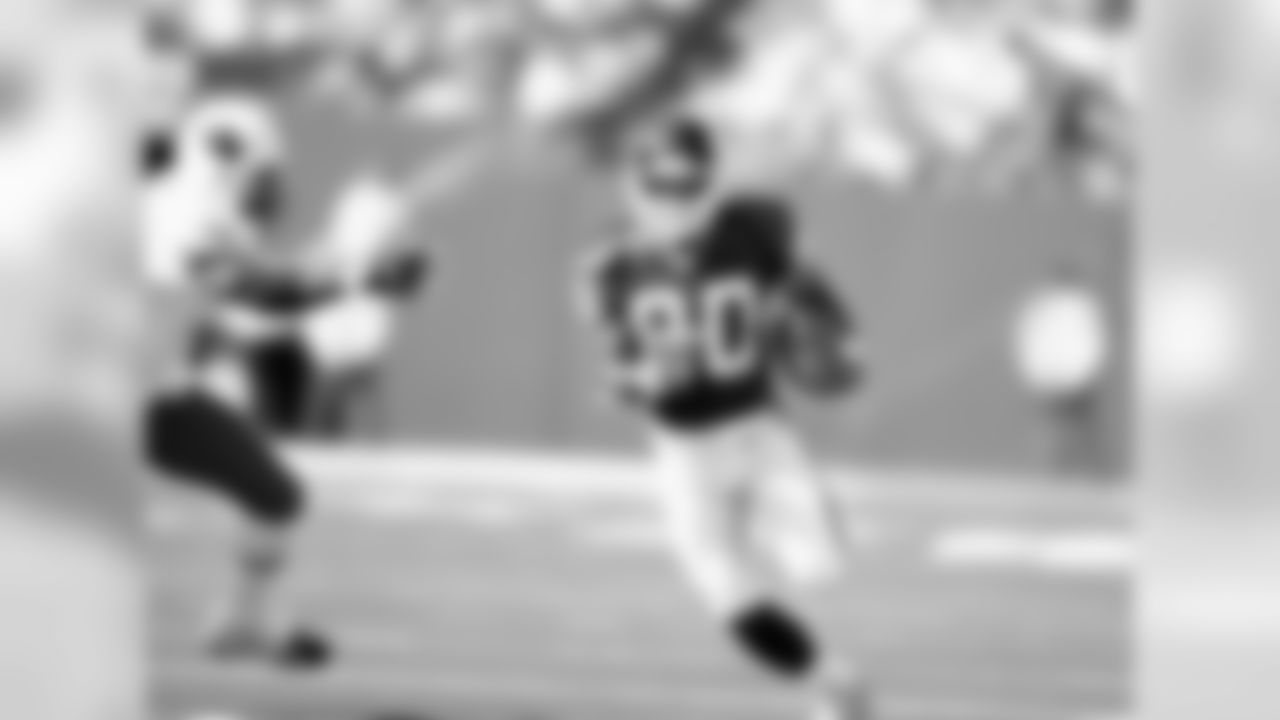
New York Giants wide receiver Chris Calloway (80) runs upfield with the ball during an NFL Game against the Arizona Cardinals Oct. 18, 1998, in East Rutherford, N. J. (Allen Kee via AP)
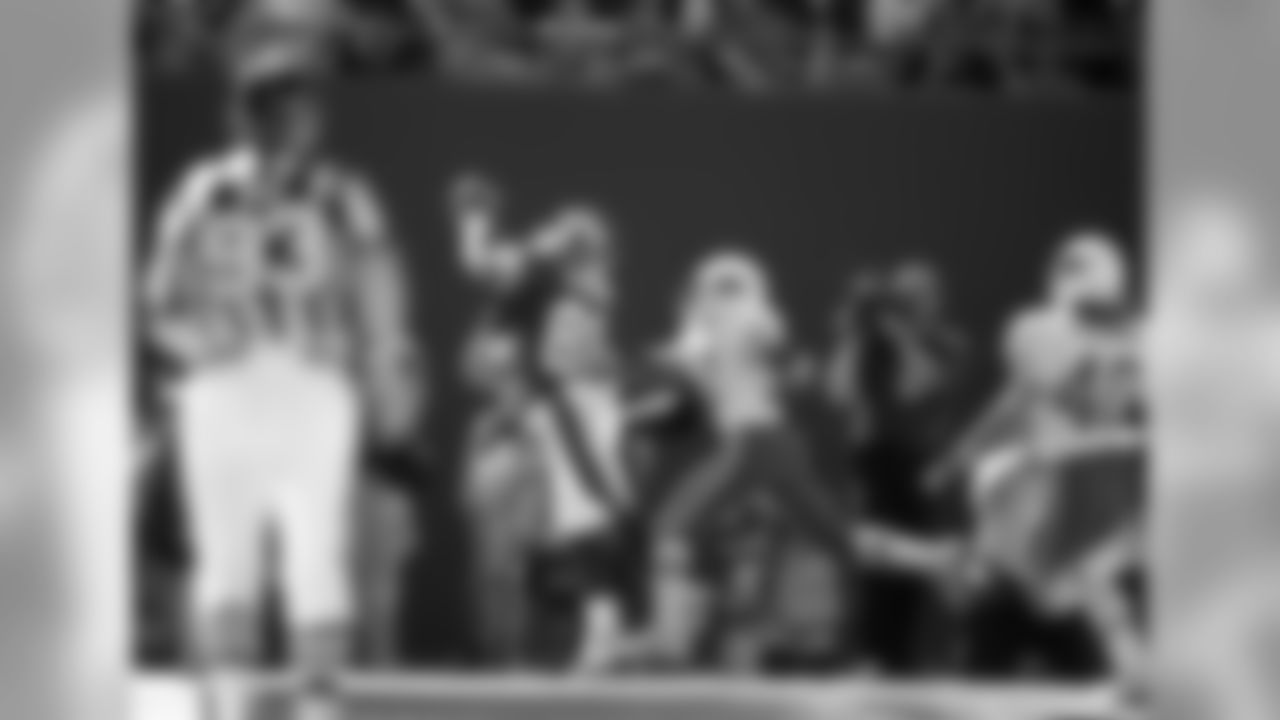
New York Giants wide receiver Chris Calloway (80) catches a pass during an NFL Game against the Arizona Cardinals Oct. 18, 1998, in East Rutherford, N. J. (Allen Kee via AP)
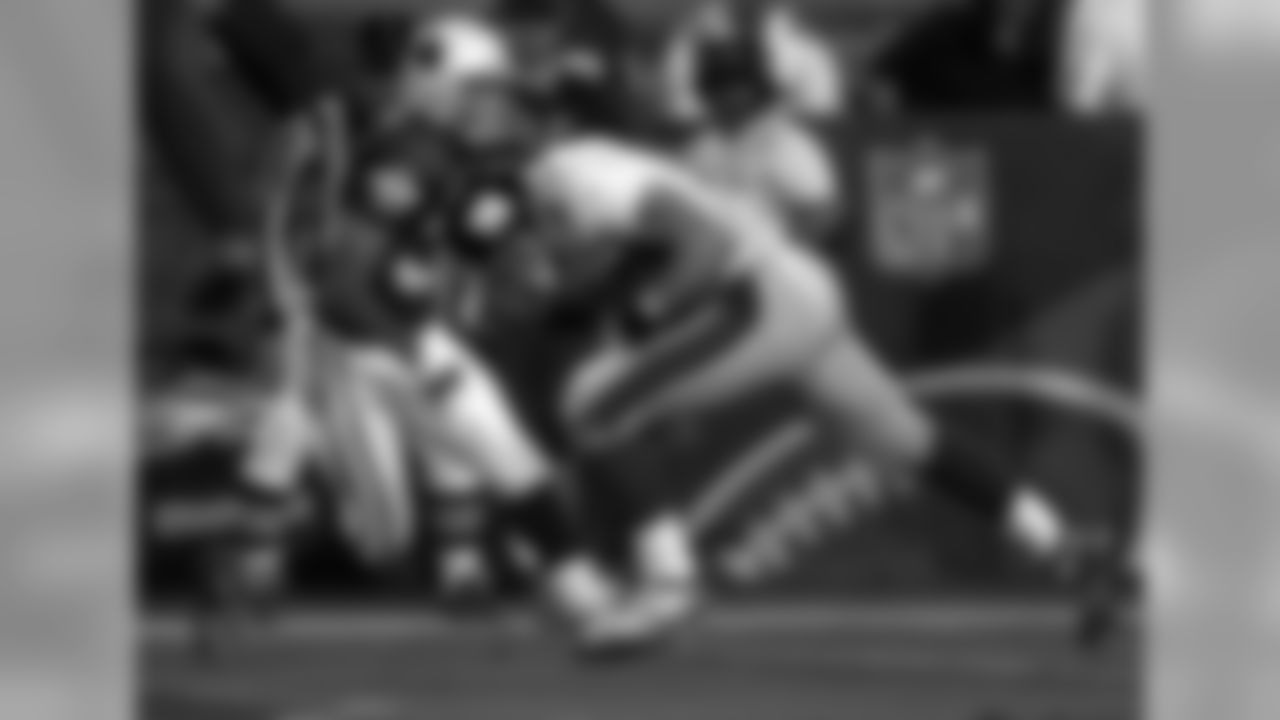
New York Giants tight end Dan Campbell (89) scores easily past Arizona Cardinals Aeneas Williams during the first quarter Sunday, Nov. 26, 2000 at Sun Devil Stadium in Tempe, Ariz.(AP Photo/Paul Connors)
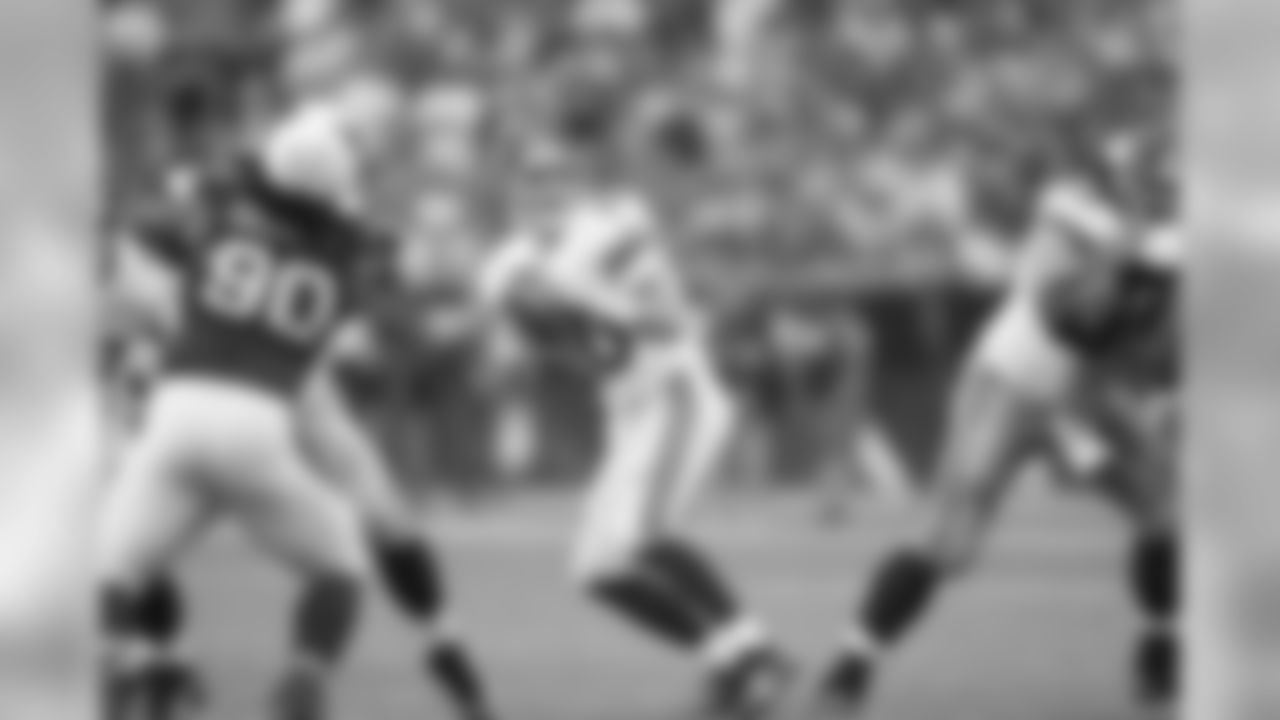
GLENDALE, AZ - NOVEMBER 23: Eli Manning #10 of the New York Giants drops back to pass against the Arizona Cardinals at University of Phoenix Stadium on November 23, 2008 in Glendale, Arizona. The Giants defeated the Cardinals 37-29. (AP Photo/Tom Hauck)
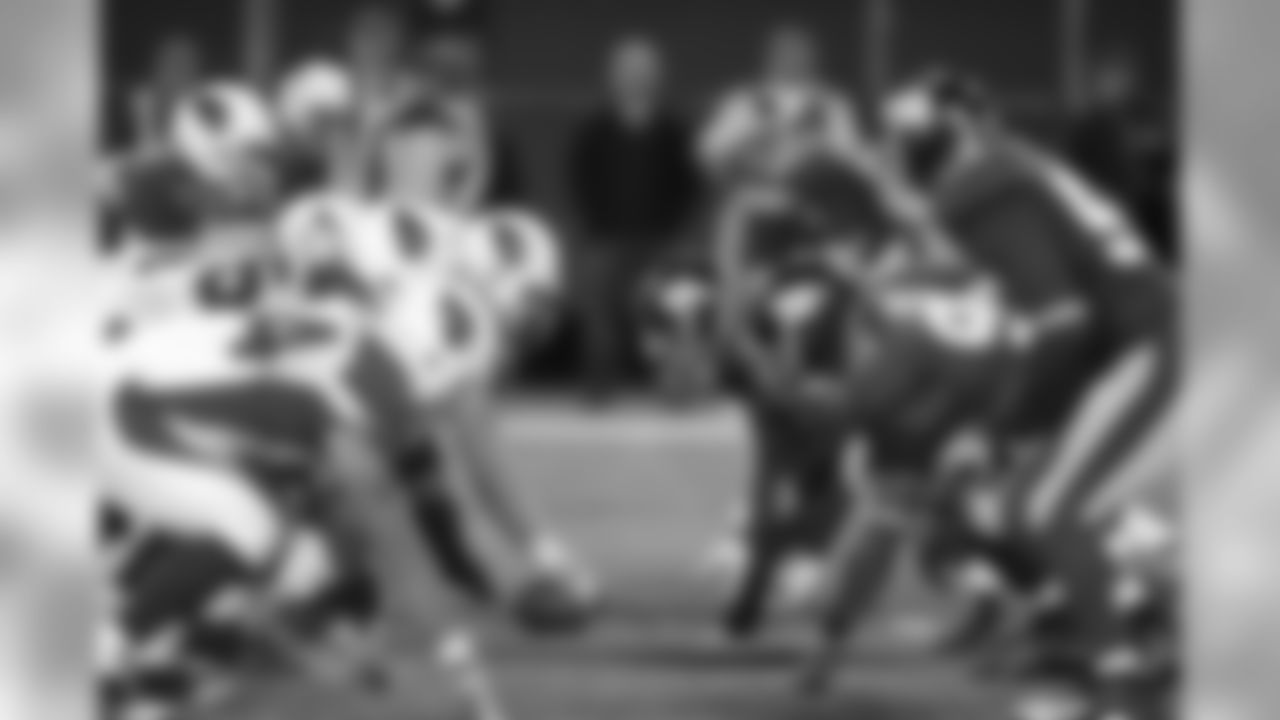
A look down the line of scrimmage as the New York Giants line up against the Arizona Cardinals during a NFL football game at Giants Stadium in East Rutherford, New Jersey on Sunday October 25, 2009 (AP Photo/Evan Pinkus)
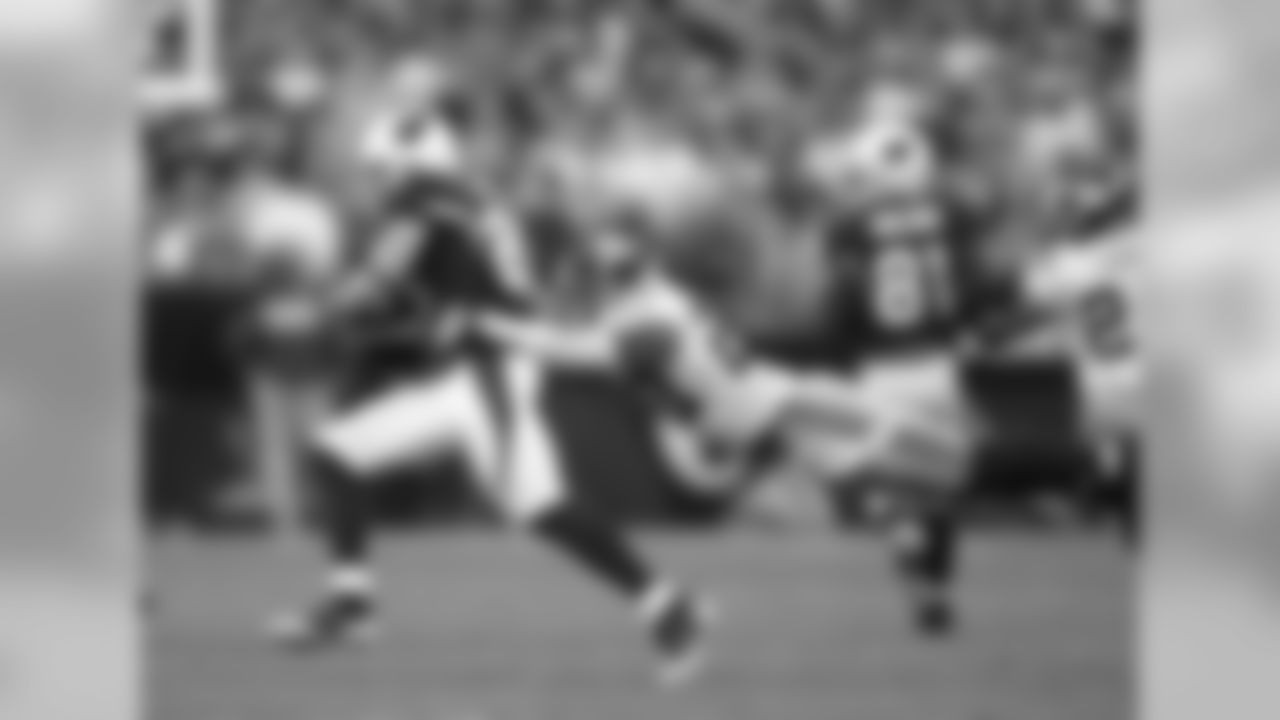
GLENDALE, AZ - NOVEMBER 23: Jerheme Urban #85 of the Arizona Cardinals is tackled by Michael Johnson #20 of the New York Giants at University of Phoenix Stadium on November 23, 2008 in Phoenix, Arizona. The Giants defeated the Cardinals 37-29. (AP Photo/Tom Hauck)
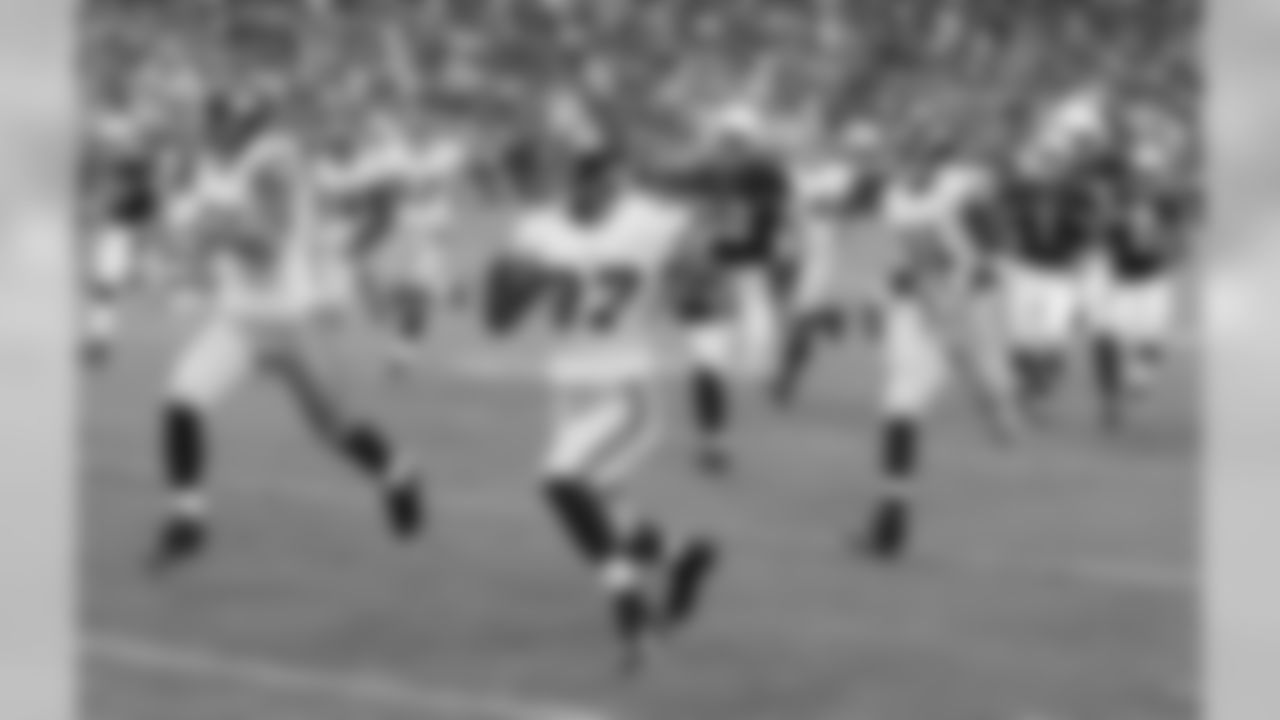
New York Giants' Domenik Hixon (87) returns the first of two long kickoff runs against the Arizona Cardinals in the second quarter of an NFL football game Sunday, Nov. 23, 2008 in Glendale, Ariz. (AP Photo/Ross D. Franklin)
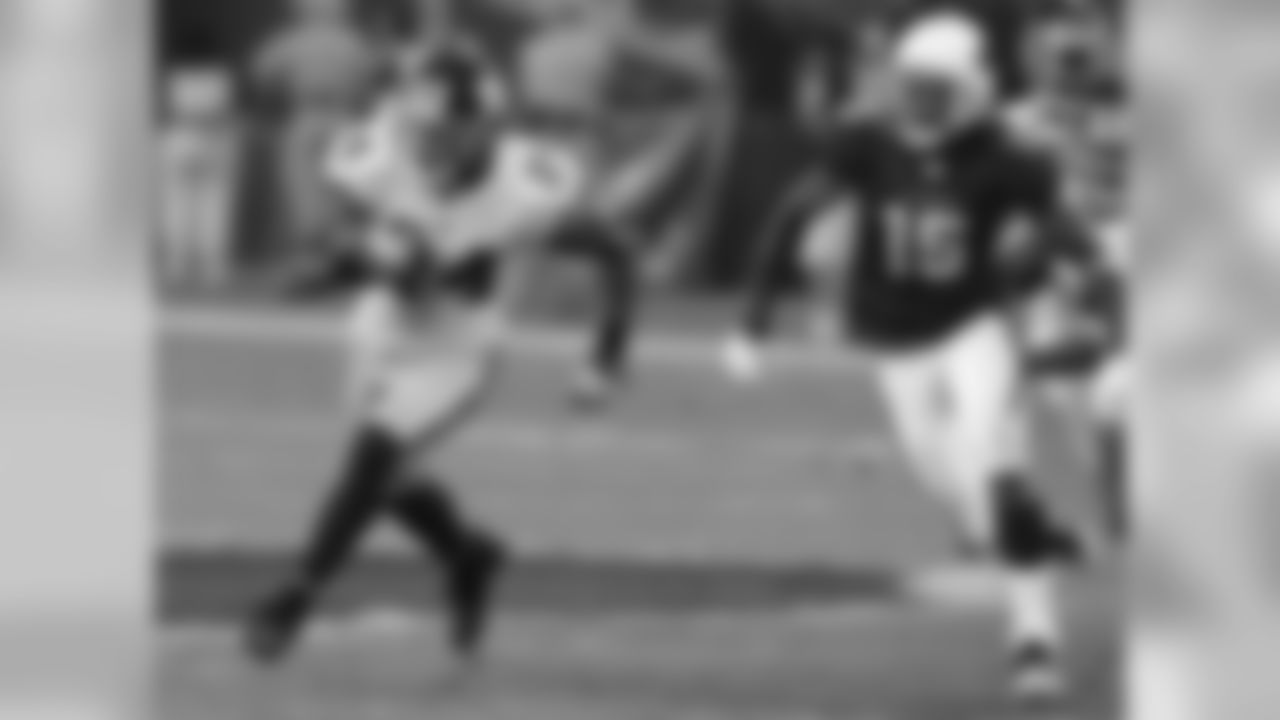
New York Giants' Terrell Thomas (24) runs with the ball after intercepting a pass intended for Arizona Cardinals' Steve Breaston (15) in the fourth quarter of an NFL football game Sunday, Nov. 23, 2008 in Glendale, Ariz. The Giants defeated the Cardinals 37-29. (AP Photo/Ross D. Franklin)
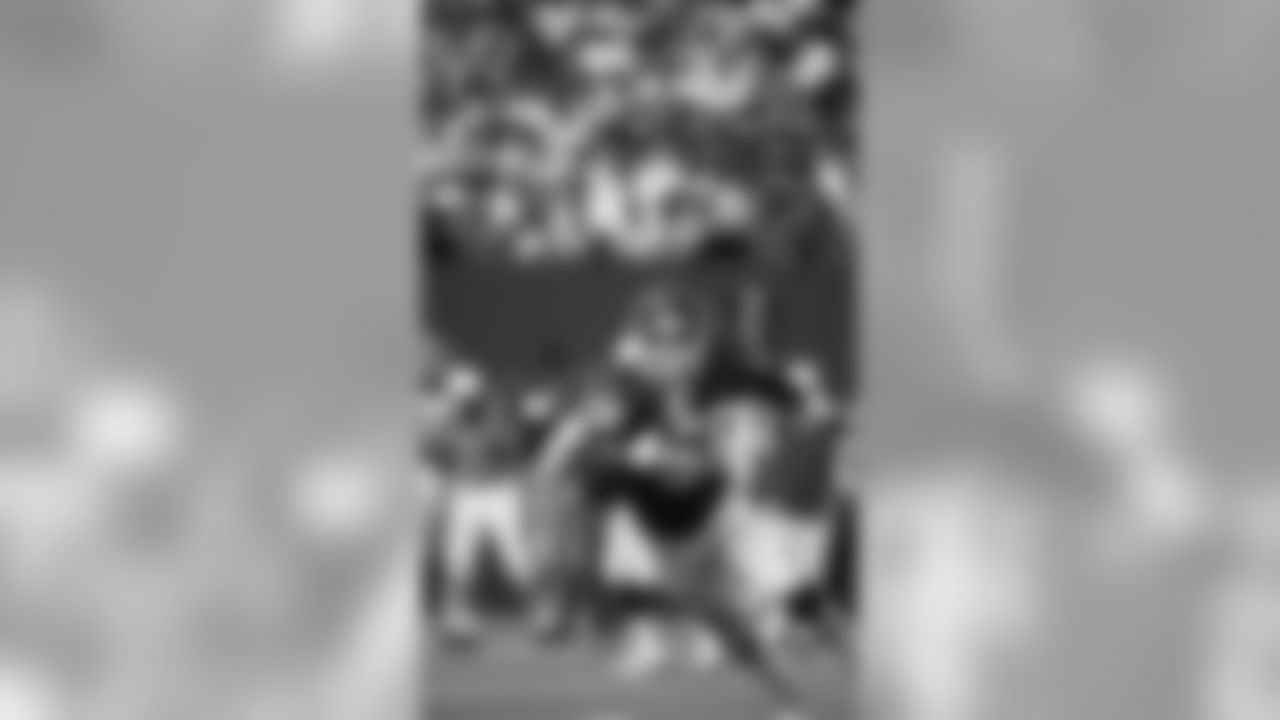
New York Giants Hall of Fame linebacker Lawrence Taylor (56) pass rushes during an NFL game against the St. Louis Cardinals in East Rutherford, 2000. (AP Photo/Tony Tomsic)
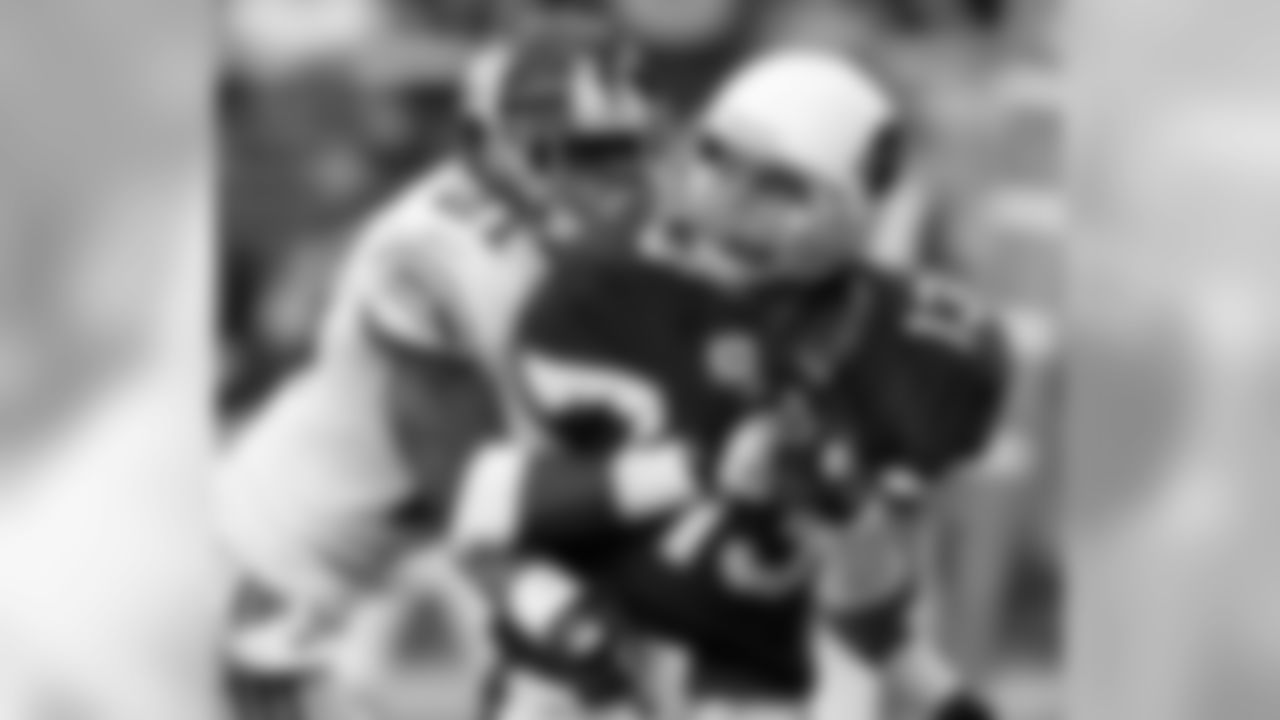
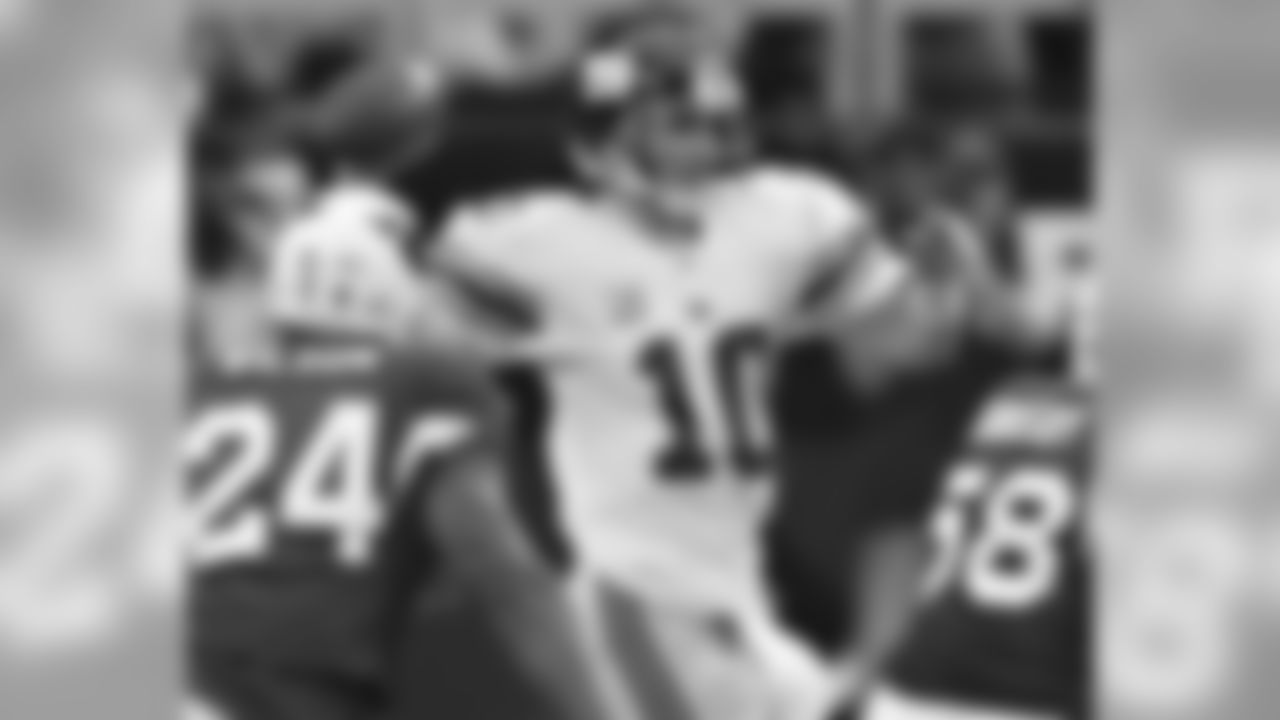
New York Giants quarterback Eli Manning (10) throws as Arizona Cardinals Adrian Wilson (24) and Karlos Dansby (58) defend during the first quarter of an NFL football game Sunday, Nov. 23, 2008 in Glendale, Ariz. (AP Photo/Ross D. Franklin)
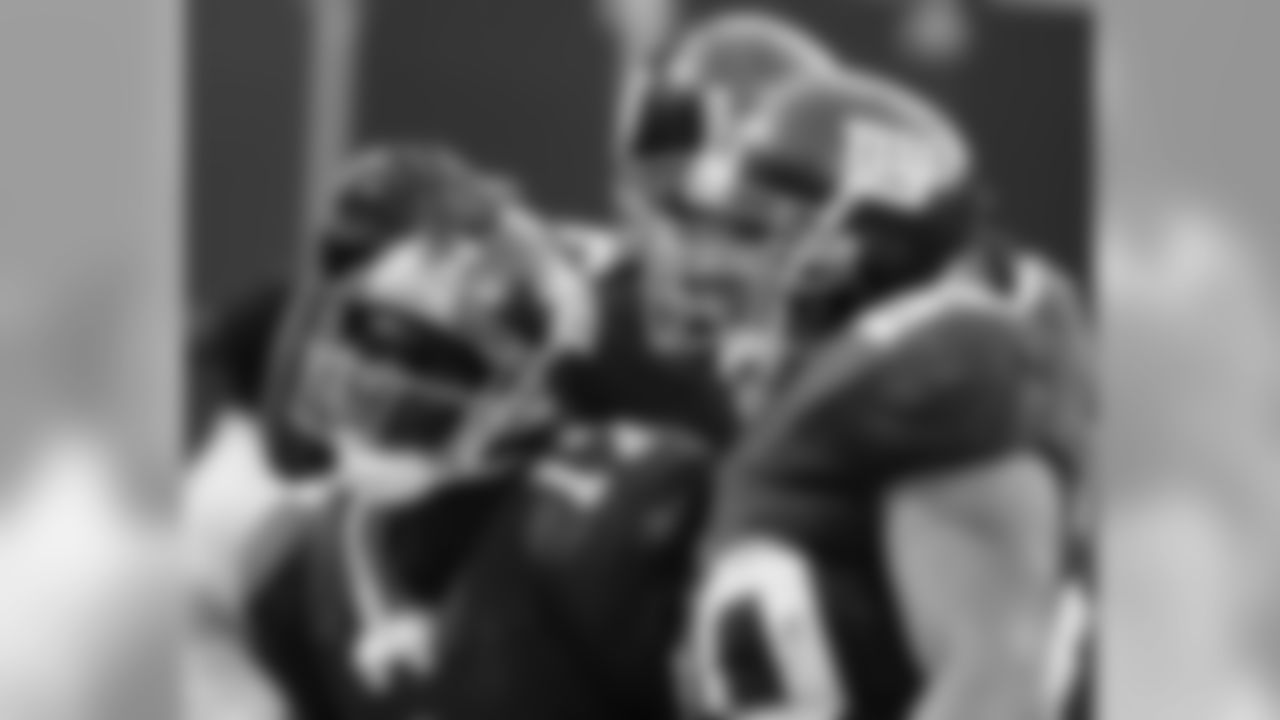
New York Giants Visanthe Shiancoe, center and Jim Finn, right, congratulate Plaxico Burress after he scored a touchdown on a 13 yard pass from Eli Manning during the fourth quarter against the Arizona Cardinals at Giants Stadium in East Rutherford, N.J., Sunday, Sept. 11, 2005. The Giants defeated the Cardinals 42-19. (AP Photo/Ed Betz)
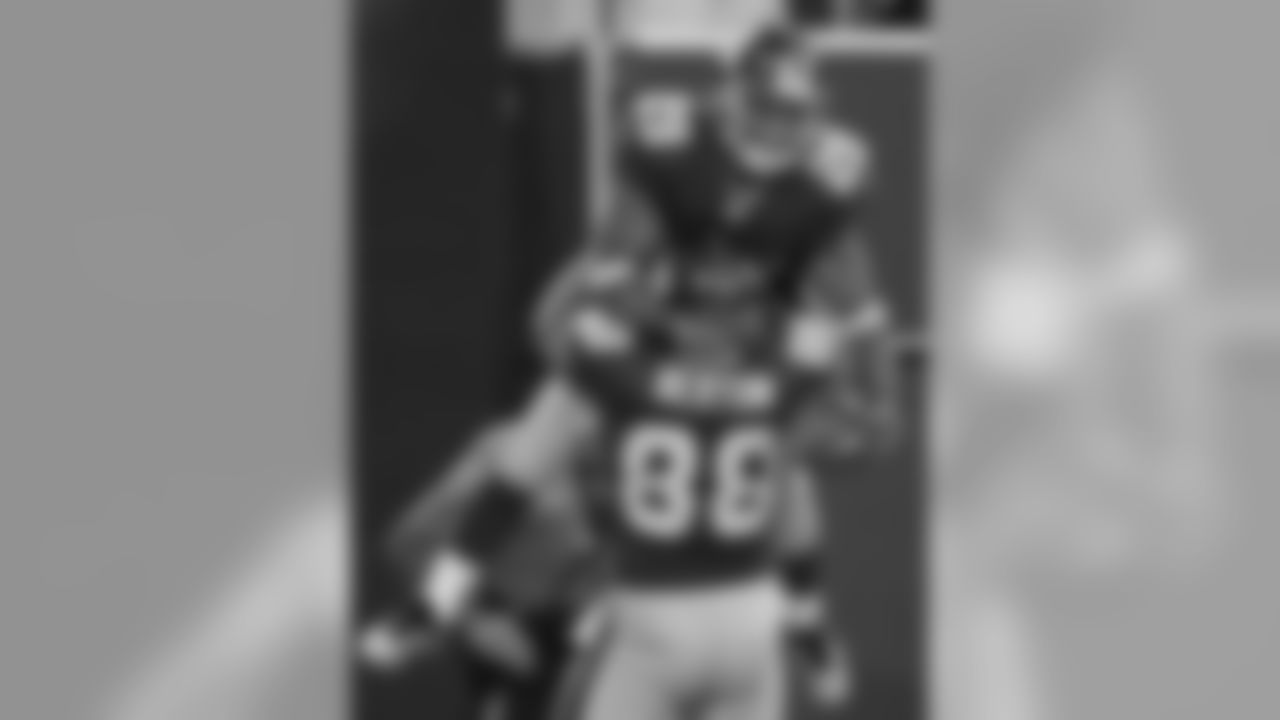
New York Giants punt returner Chad Morton jumps into the arms of Giants' Sean Berton (88) after Morton scored on a 52-yard punt return during the fourth quarter against the Arizona Cardinals Sunday, Sept. 11, 2005 at Giants Stadium in East Rutherford, N.J. (AP Photo/Bill Kostroun)
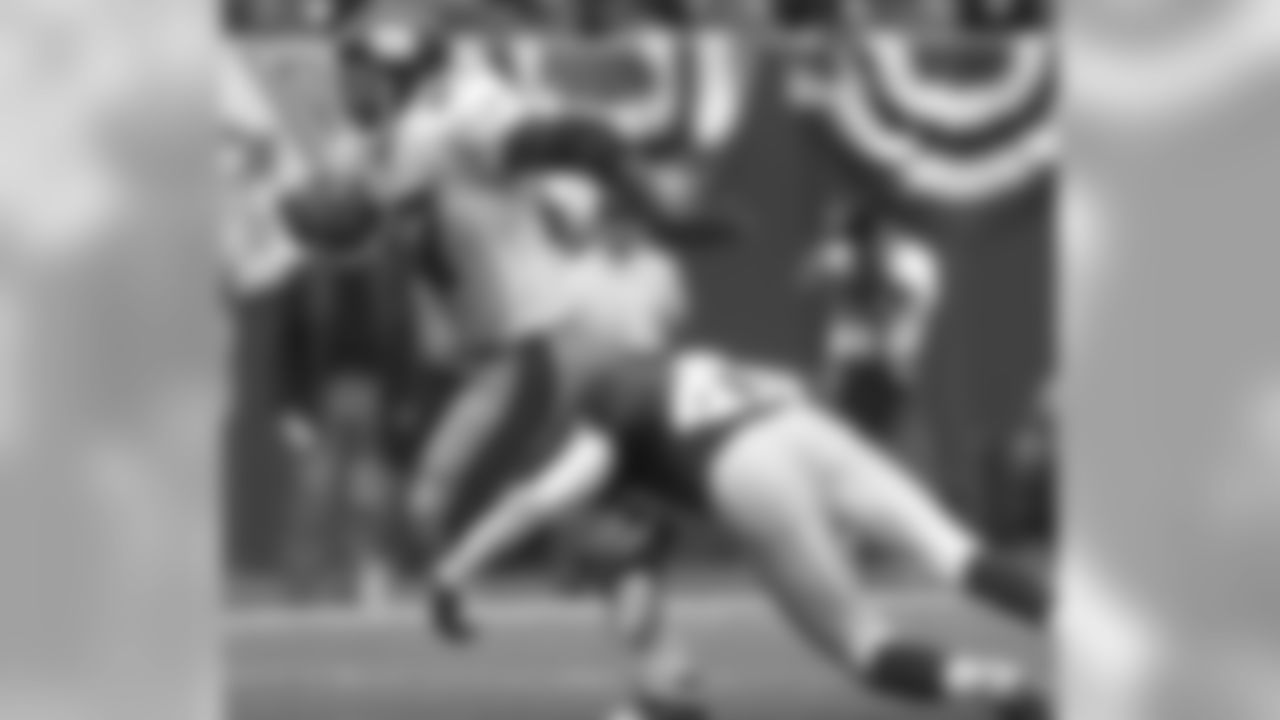
New York Giants running back Ron Dayne escapes the tackle attempt by Arizona Cardinals defensive back Kwamie Lassiter on his way to scoring the Giants third touchdown of the game during the fourth quarter at Giants Stadium in East Rutherford, N.J. Sunday, Sept. 3, 2000. The Giants defeated the Cardinals 21-16. (AP Photo/John Greilick)

New York Giants coach Tom Coughlin directs his team from the sidelines during the second quarter against the Arizona Cardinals Sunday, Sept. 11, 2005 at Giants Stadium in East Rutherford, N.J. The Giants won 42-19. (AP Photo/Bill Kostroun)
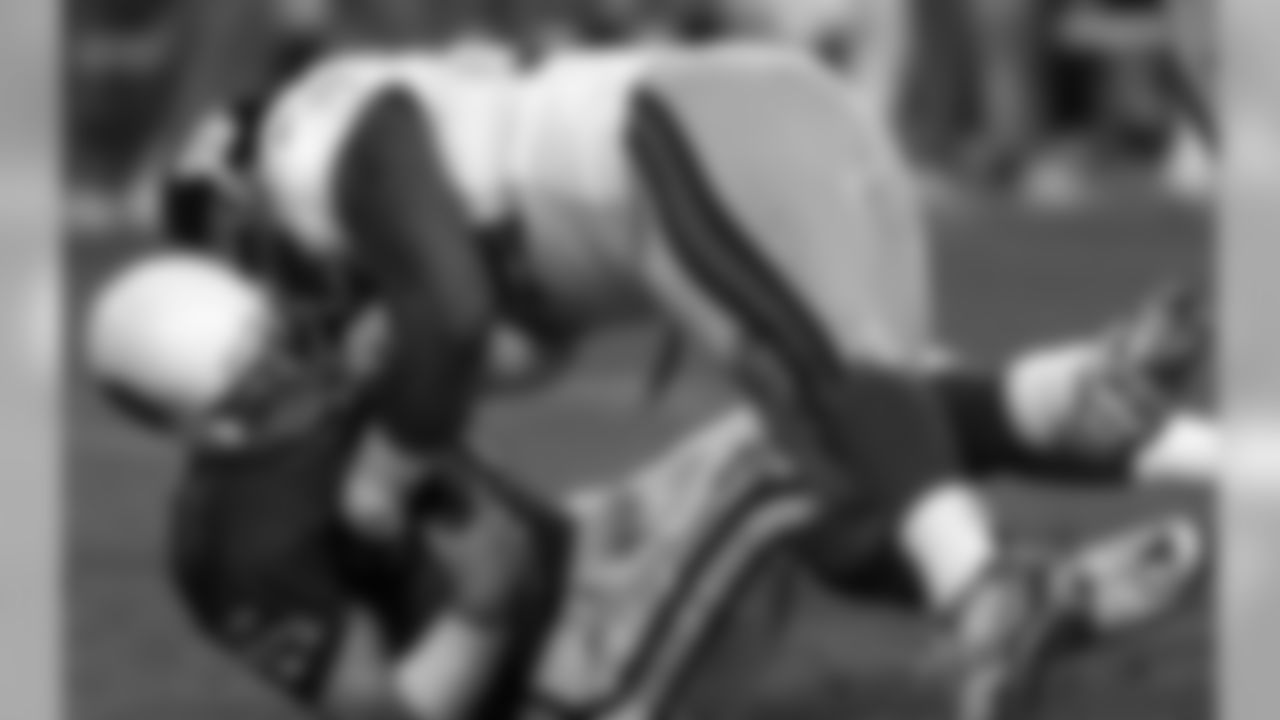
New York Giants' Keith Hamilton, top, sacks Arizona Cardinals quarterback Dave Brown during the third quarter Sunday, Nov. 26, 2000 at Sun Devil Stadium in Tempe, Ariz.(AP Photo/Samantha Feldman)
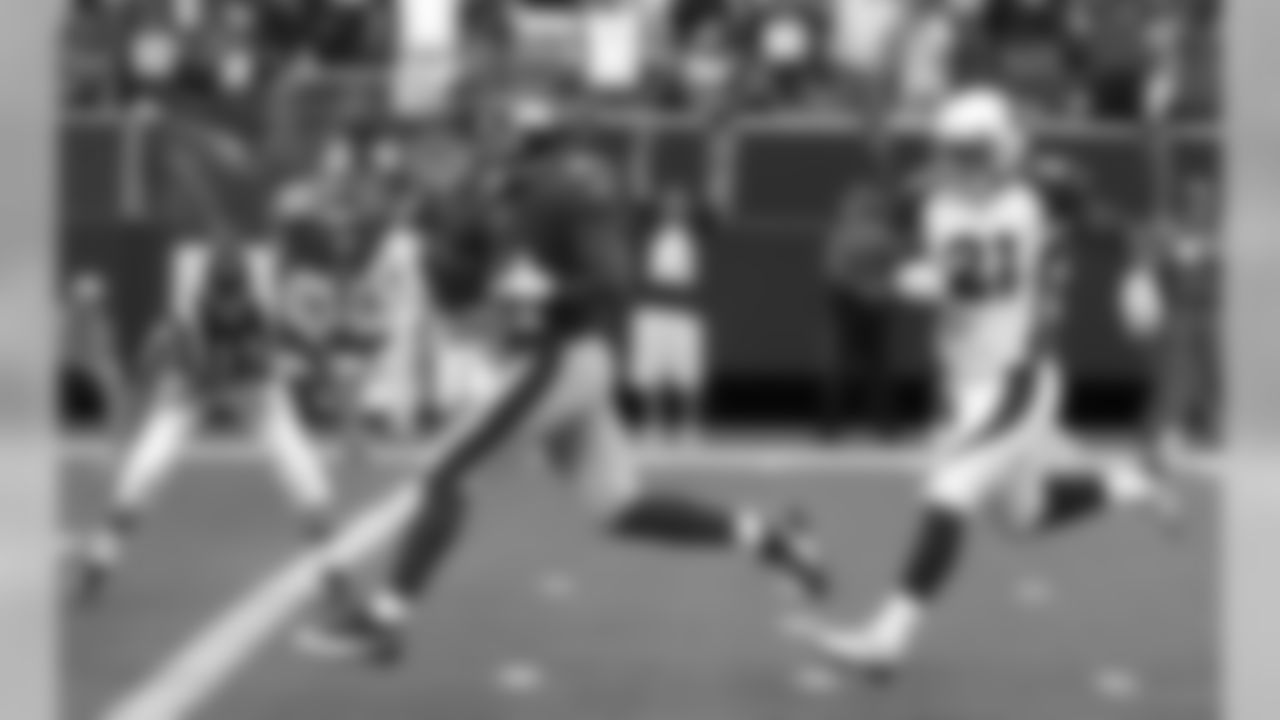
New York Giants' Tiki Barber heads for the goal line to score a touchdown on a 21 yard run as Arizona Cardinals Antrel Rolle follows during the third quarter at Giants Stadium in East Rutherford, N.J., Sunday, Sept. 11, 2005. The Giants defeated the Cardinals 42-19. (AP Photo/Ed Betz)
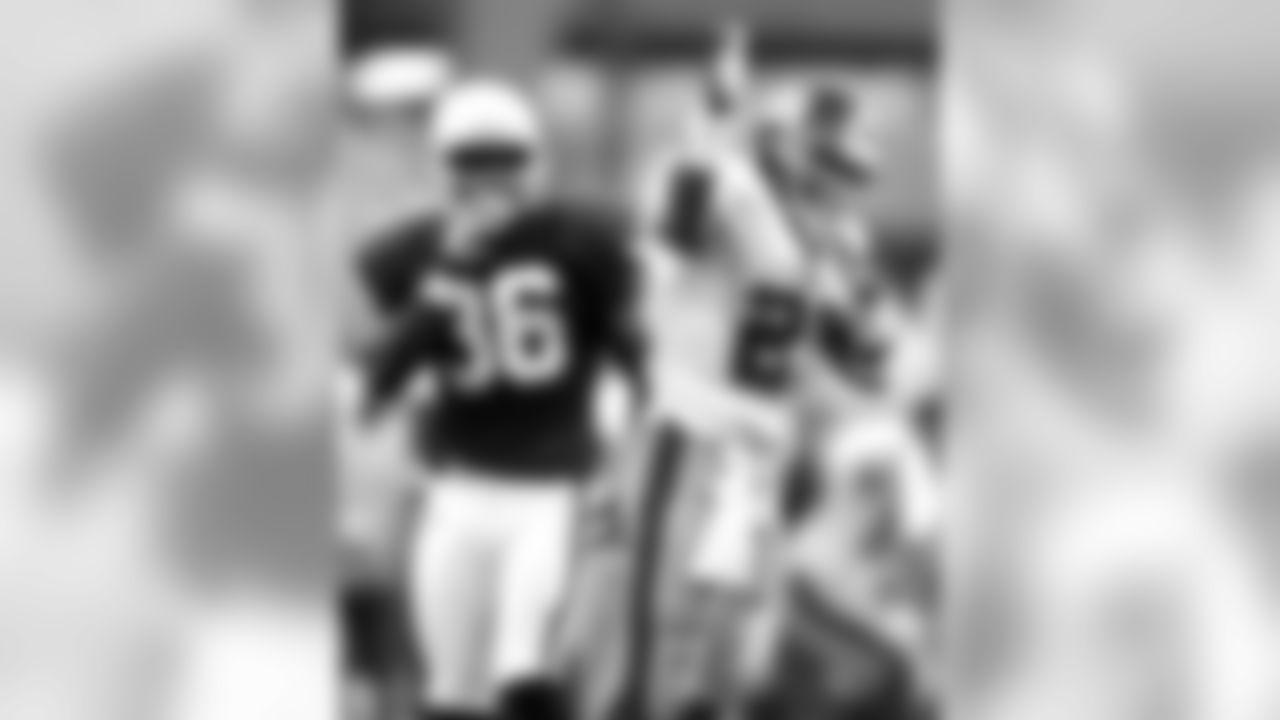
New York Giants' Tiki Barber signals first down as Arizona Cardinals' David Barrett (36) watches during the fourth quarter Sunday, Nov. 11, 2001 at Sun Devil Stadium in Tempe, Ariz. Barber rushed for 118 yards in 17 carries in the Giants 17-10 win.(AP Photo/Matt York)
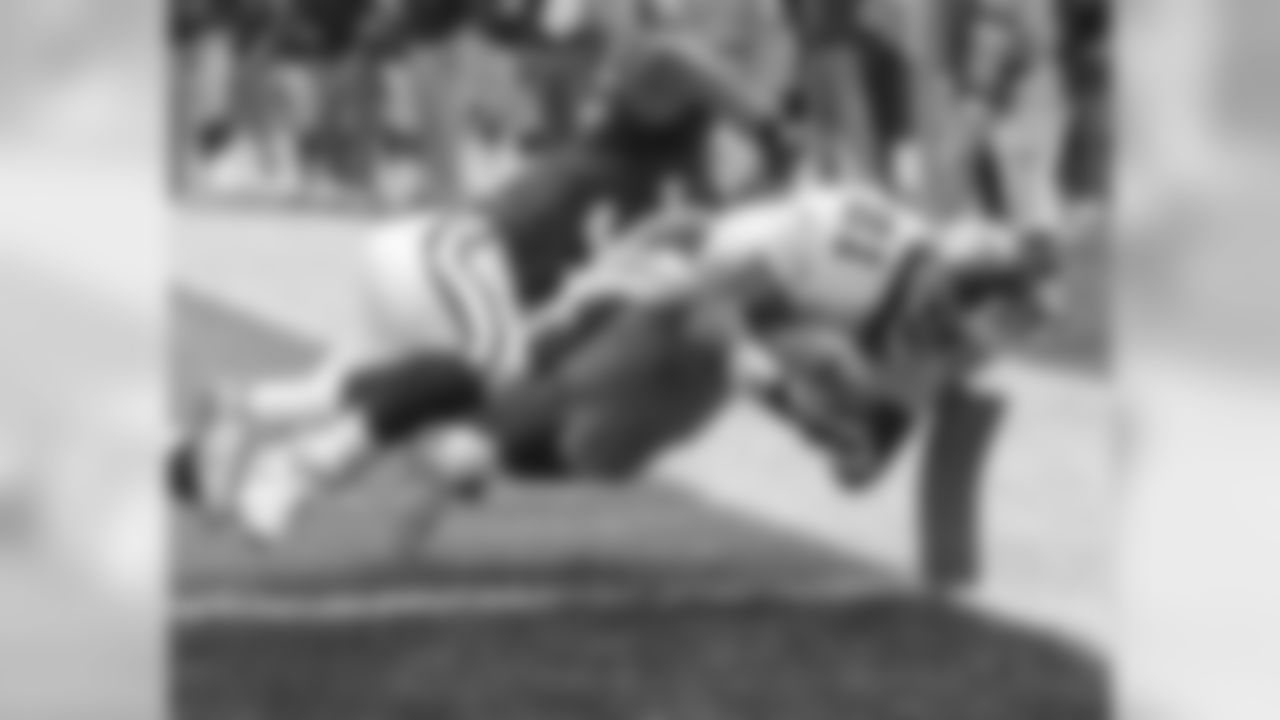
New York Giants running back Tiki Barber (21) dives over the goal line to score the Giants first touchdown as Arizona Cardinals cornerback Aeneas Williams tries in vain to stop him during the first quarter at Giants Stadium in East Rutherford, N.J. Sunday, Sept. 3, 2000. (AP Photo/John Greilick)
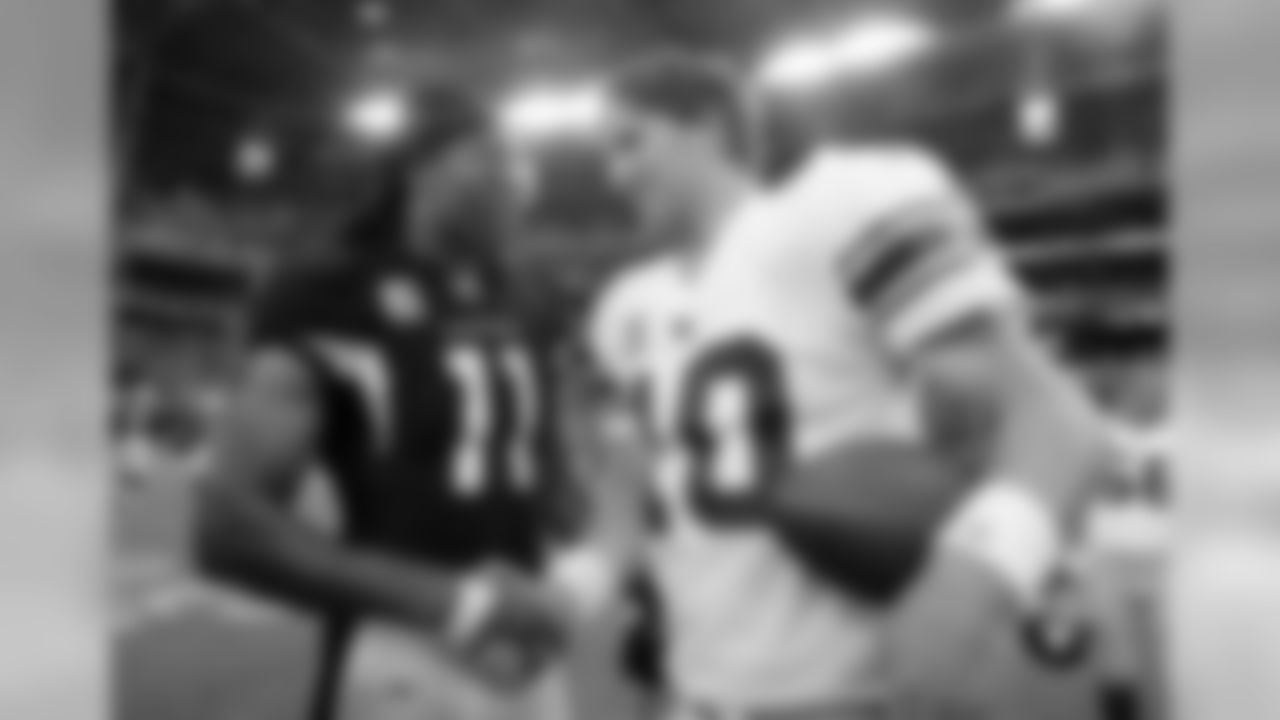
Arizona Cardinals' Larry Fitzgerald (11) and New York Giants' Eli Manning (10) shake hands after an NFL football game, Sunday, Oct. 2, 2011, in Glendale, Ariz. The Giants defeated the Cardinals 31-27. (AP Photo/Ross D. Franklin)
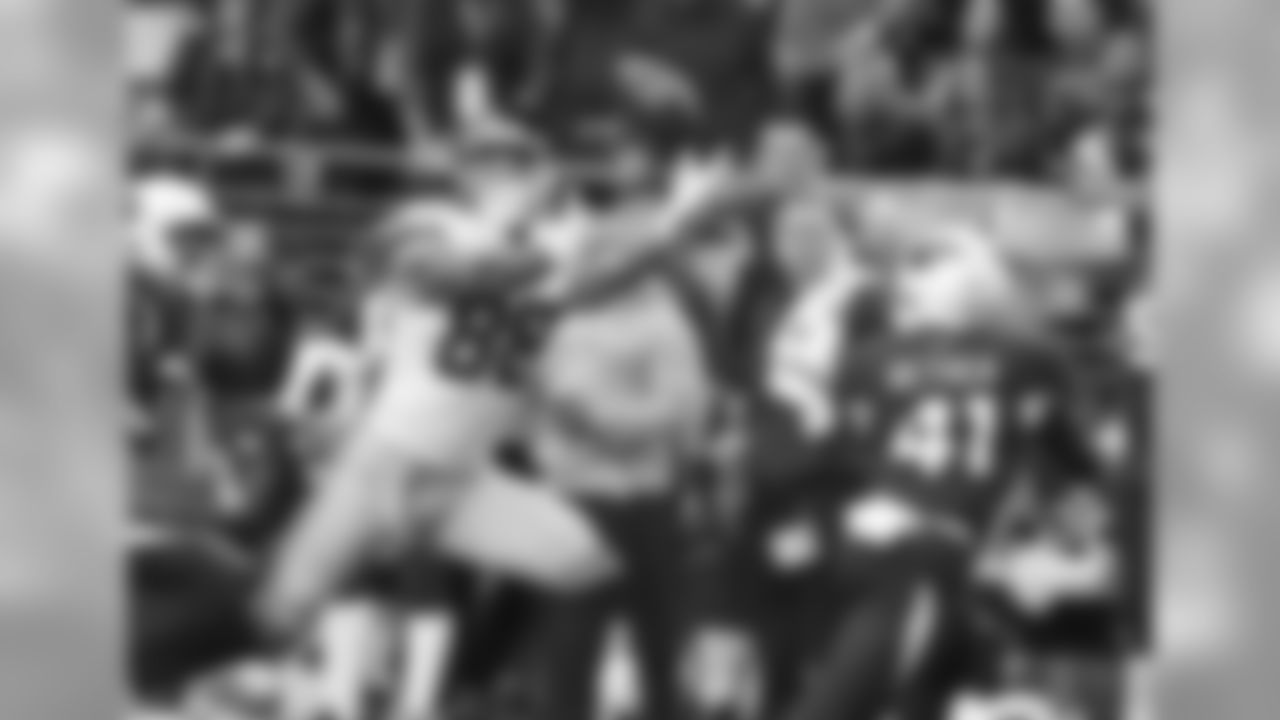
New York Giants tight end Evan Engram (88) during an NFL football game against the Arizona Cardinals, Sunday, Dec. 24, 2017, in Glendale, Ariz. The Cardinals won 23-0. (AP Photo/Rick Scuteri)
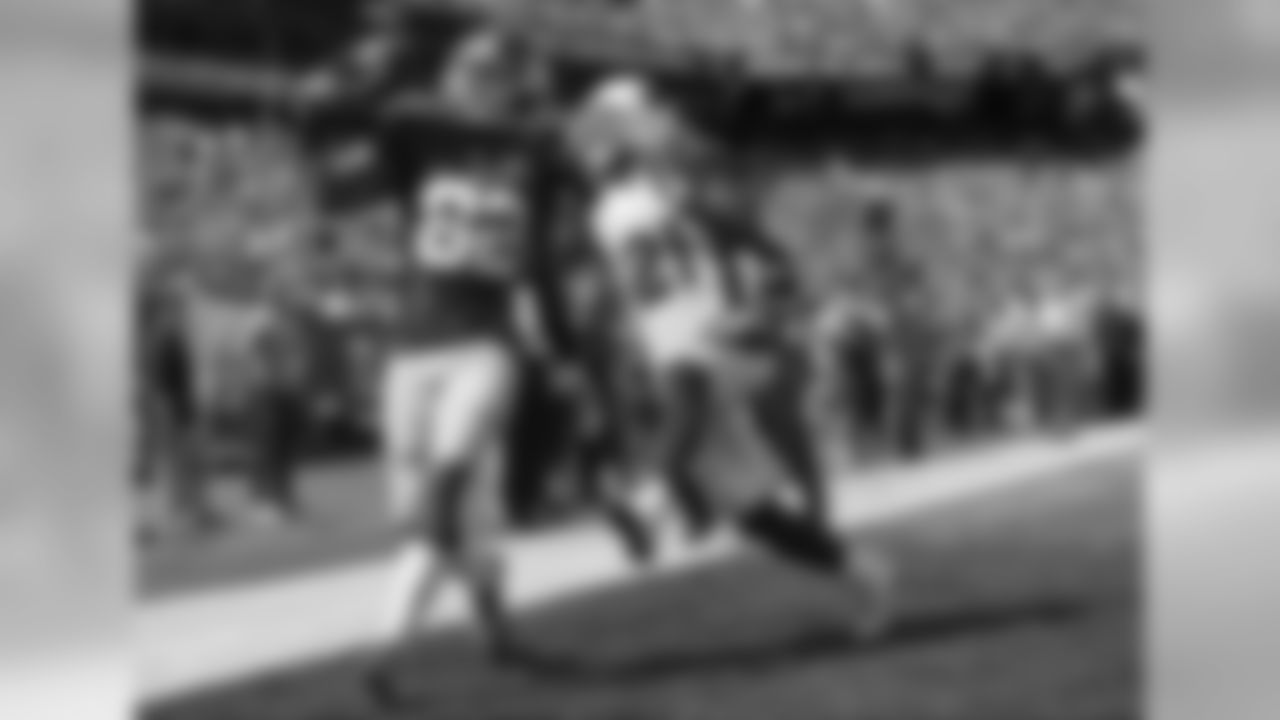
New York Giants wide receiver Rueben Randle (82) catches a pass for a touchdown in front of Arizona Cardinals' Patrick Peterson (21) during the first half of an NFL football game Sunday, Sept. 14, 2014, in East Rutherford, N.J. (AP Photo/Kathy Willens)
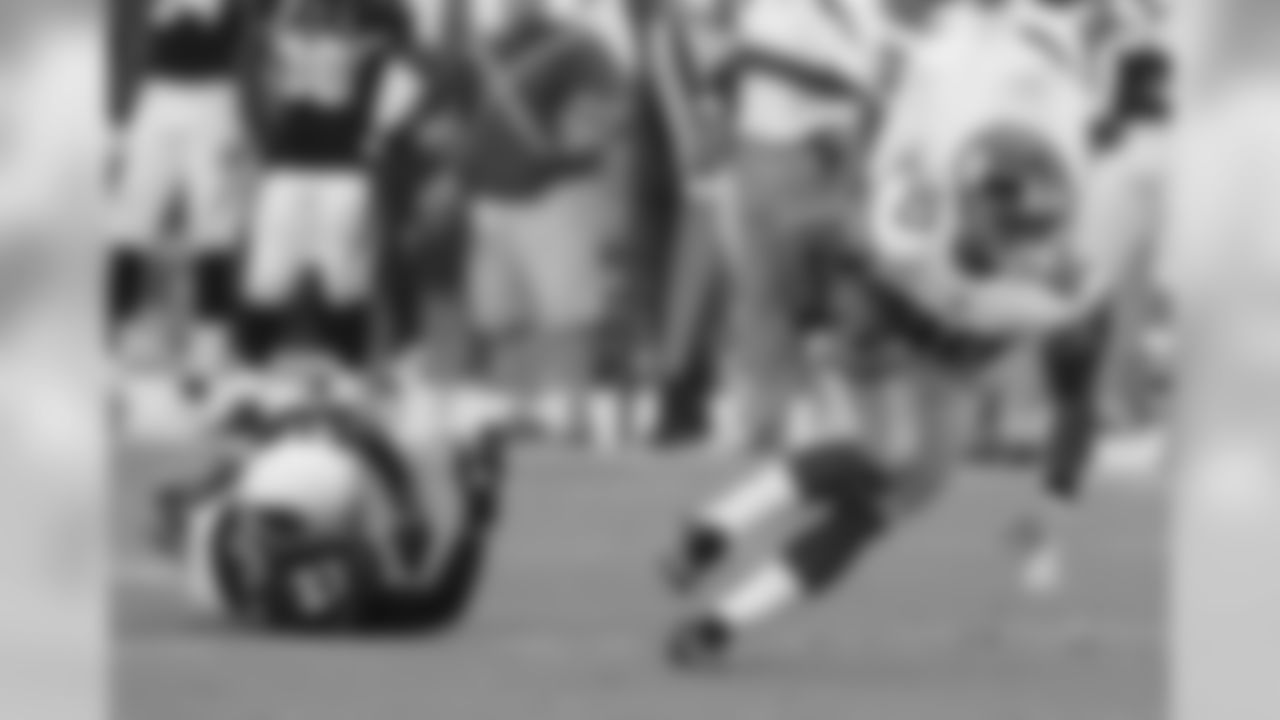
New York Giants' Victor Cruz (80) slips away from the tackle attempt by Arizona Cardinals' Michael Adams (27) during an NFL football game, Sunday, Oct. 2, 2011, in Glendale, Ariz. The Giants defeated the Cardinals 31-27. (AP Photo/Ross D. Franklin)
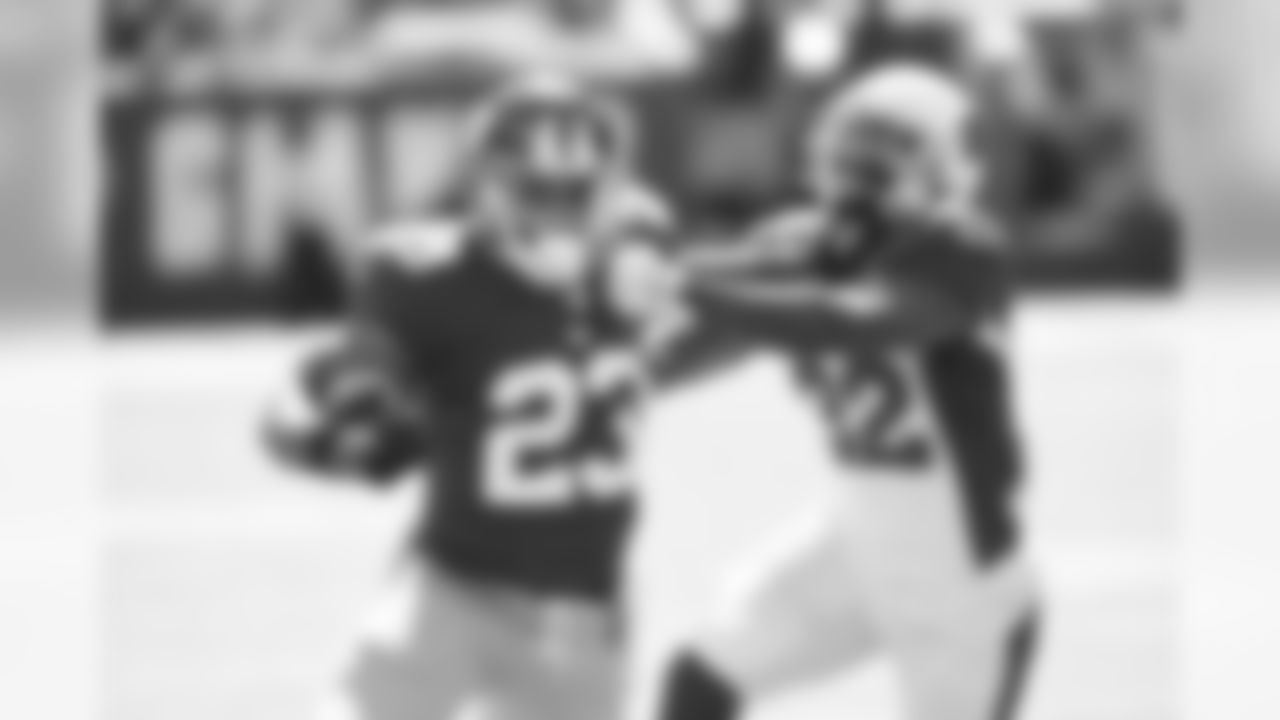
New York Giants running back Rashad Jennings (23) carries the ball and fights off Arizona Cardinals free safety Tony Jefferson (22) during a week 2 football game on September 14, 2014 in East Rutherford, New Jersey (AP Photo/Evan Pinkus)
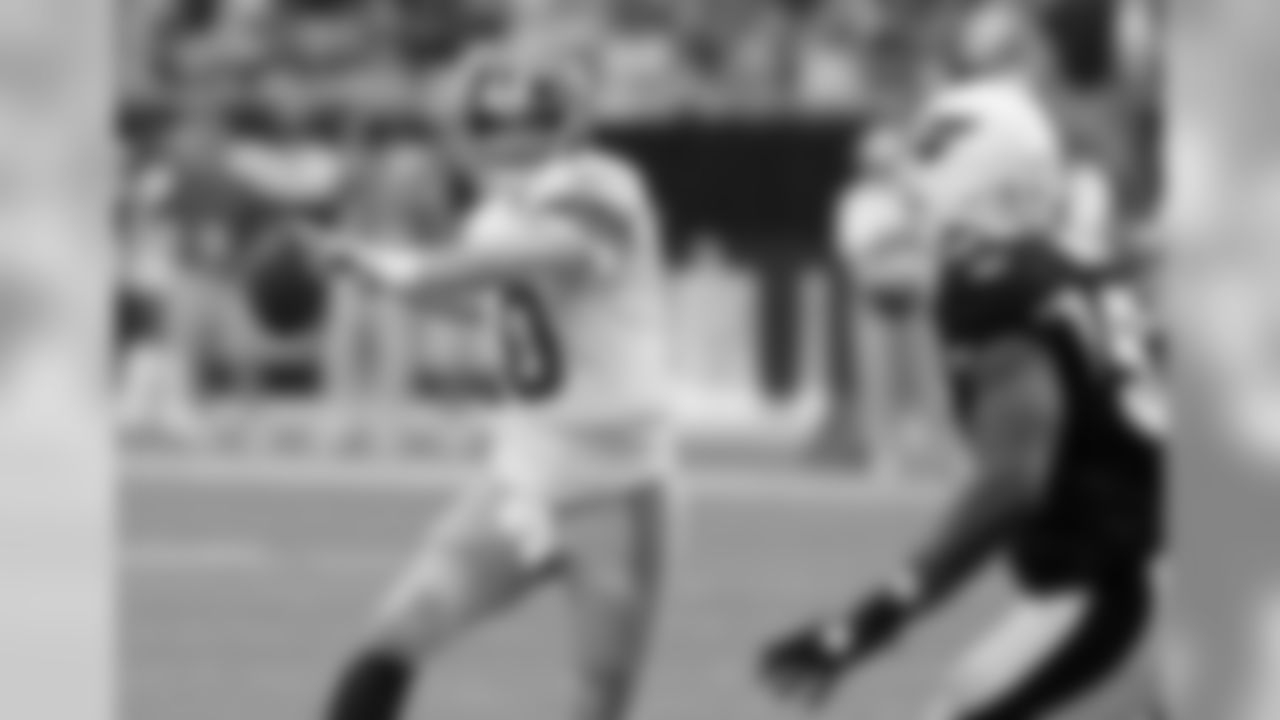
New York Giants' Eli Manning, left, drops back to throw a pass as Arizona Cardinals' Daryl Washington closes in to defend during the fourth quarter of an NFL football game, Sunday, Oct. 2, 2011, in Glendale, Ariz. The Giants defeated the Cardinals 31-27. (AP Photo/Ross D. Franklin)
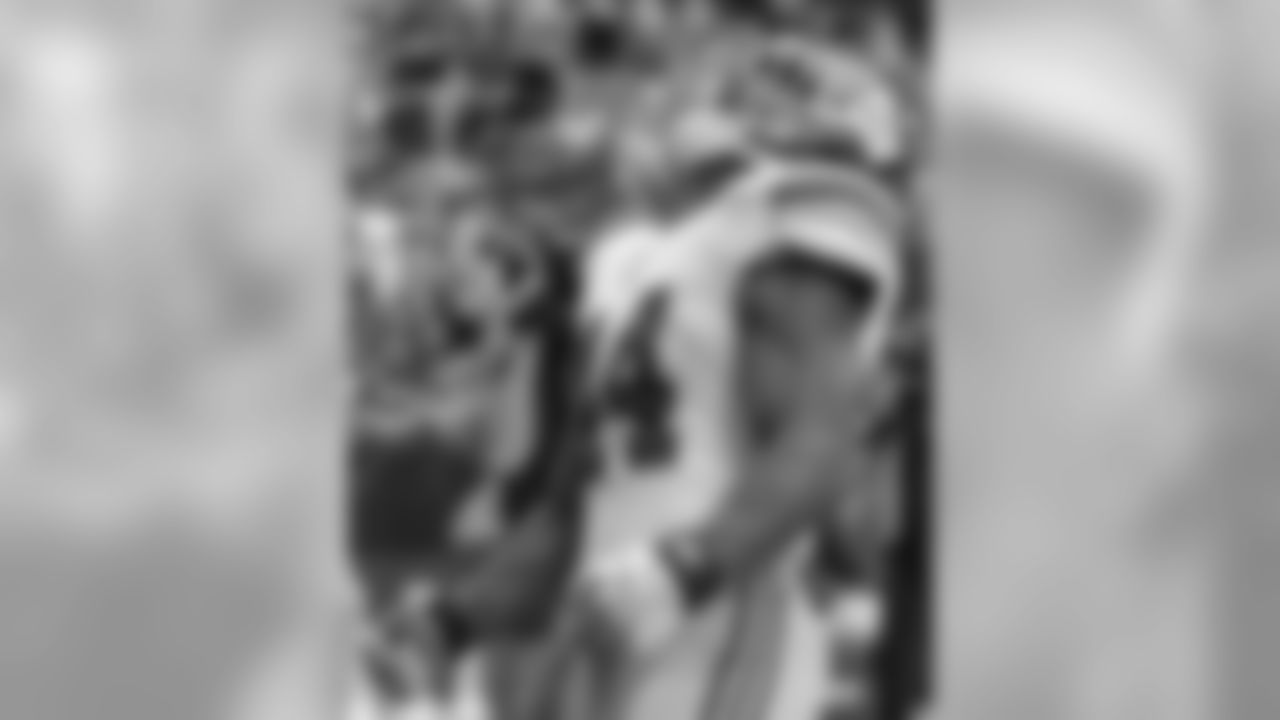
New York Giants running back Ahmad Bradshaw (44) celebrates his touchdown during the first half of an NFL football game against the Arizona Cardinals, Sunday, Oct. 2, 2011, in Glendale, Ariz. (AP Photo/Paul Connors)

New York Giants wide receiver Hakeem Nicks (88) scores the game-winning touchdown during the second half of an NFL football game against the Arizona Cardinals Sunday, Oct. 2, 2011, in Glendale, Ariz. The Giants won 31-27. (AP Photo/Paul Connors)
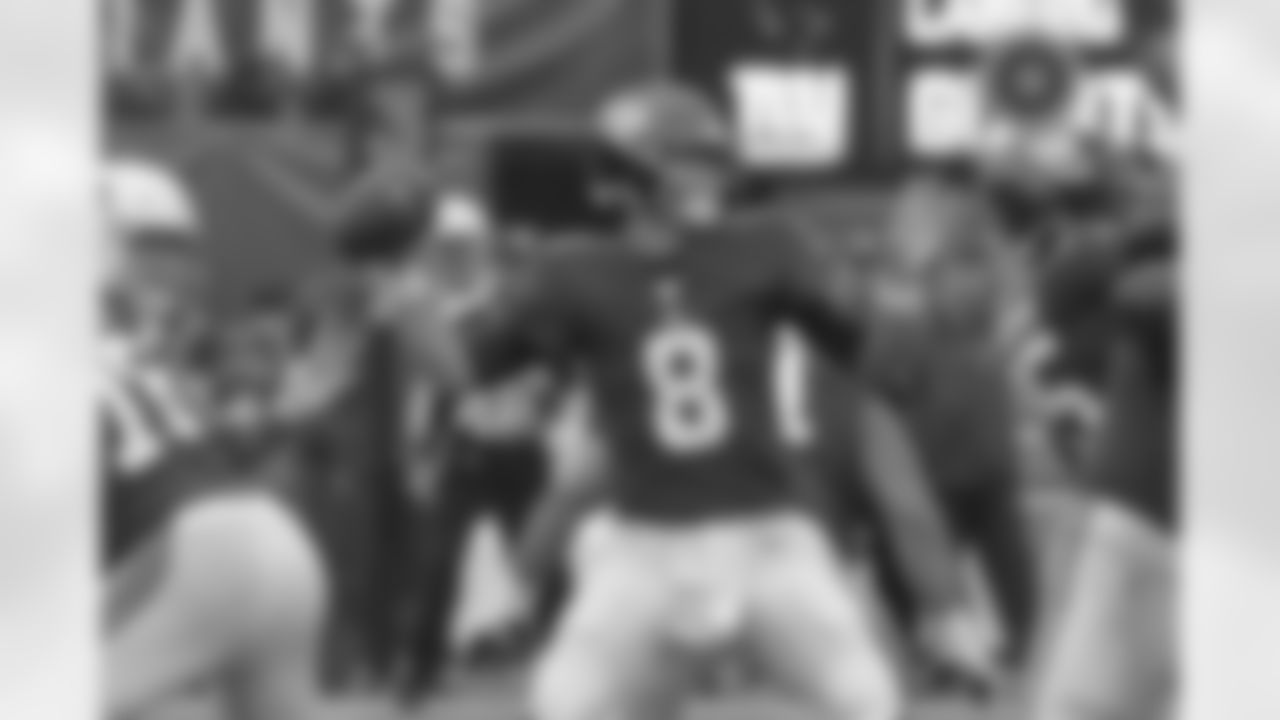
New York Giants quarterback Daniel Jones looks to throw during the first half of an NFL football game against the Arizona Cardinals, Sunday, Oct. 20, 2019, in East Rutherford, N.J. (AP Photo/Bill Kostroun)
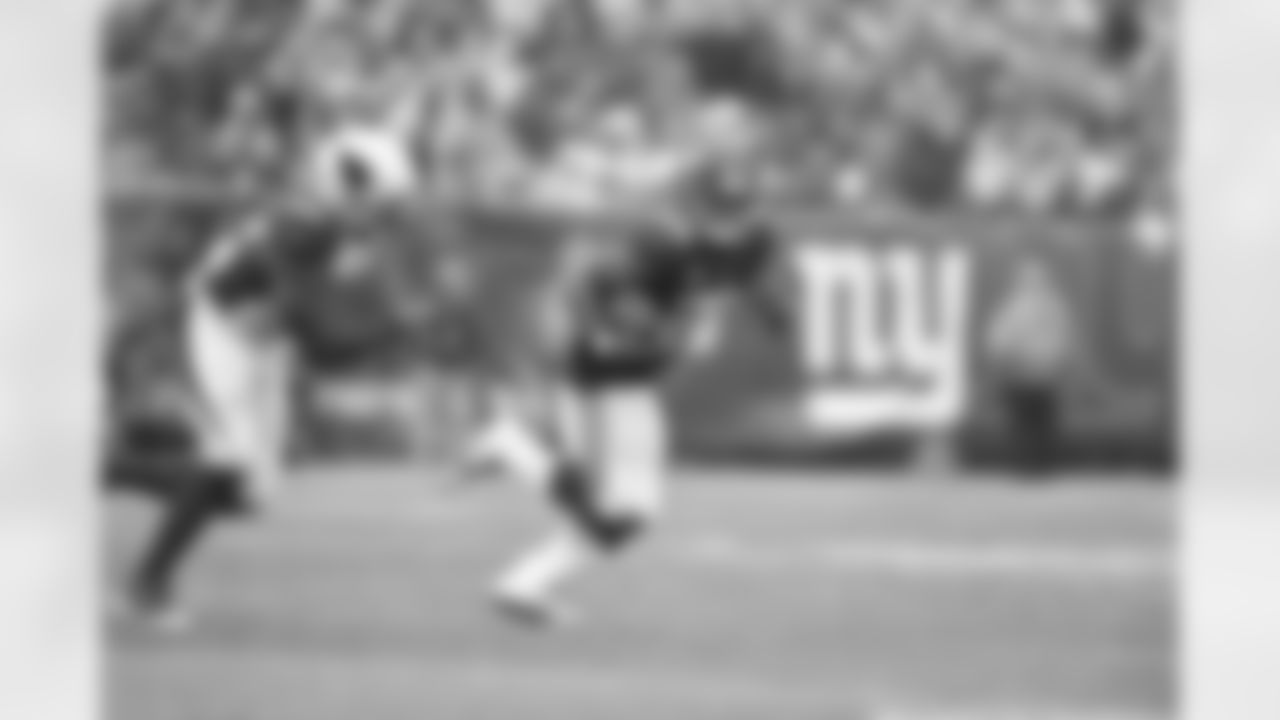
New York Giants running back Saquon Barkley (26) carries the ball during an NFL football game against the Arizona Cardinals Sunday October 20, 2019 in East Rutherford, NJ (Evan Pinkus via AP)
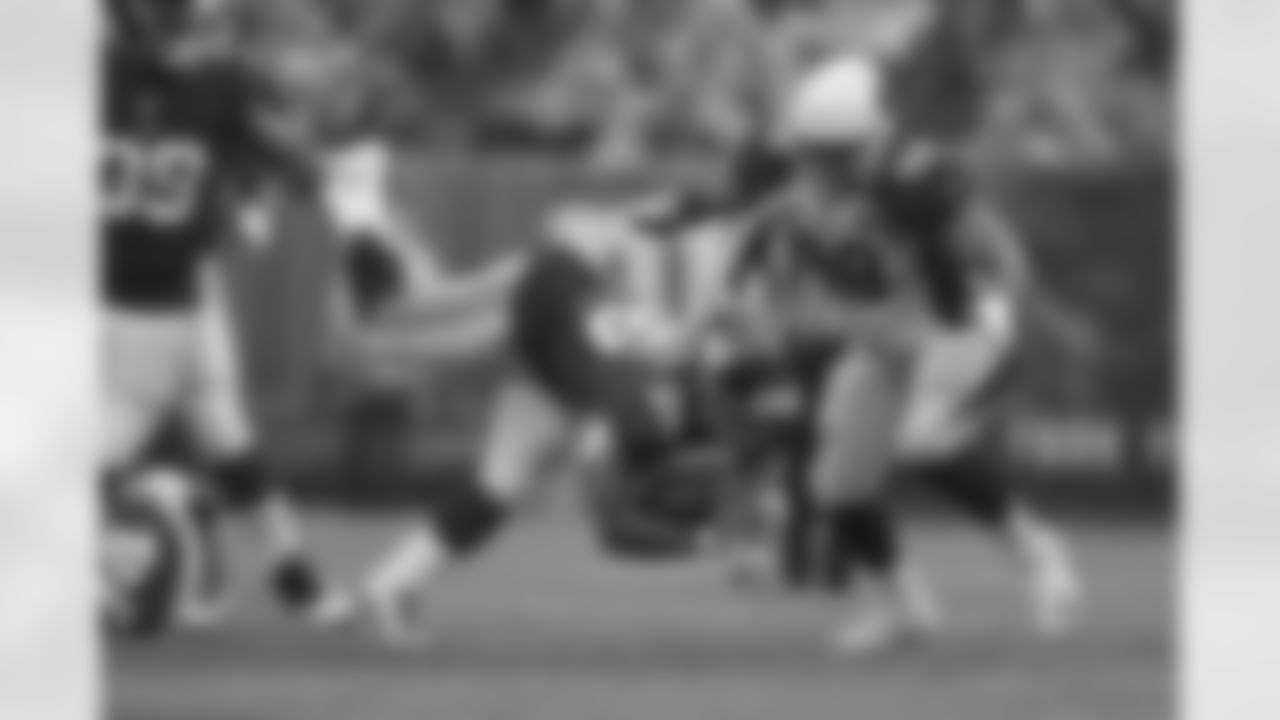
New York Giants running back Saquon Barkley (26) runs the ball during the second half of an NFL football game against the Arizona Cardinals, Sunday, Oct. 20, 2019, in East Rutherford, N.J. (AP Photo/Adam Hunger)
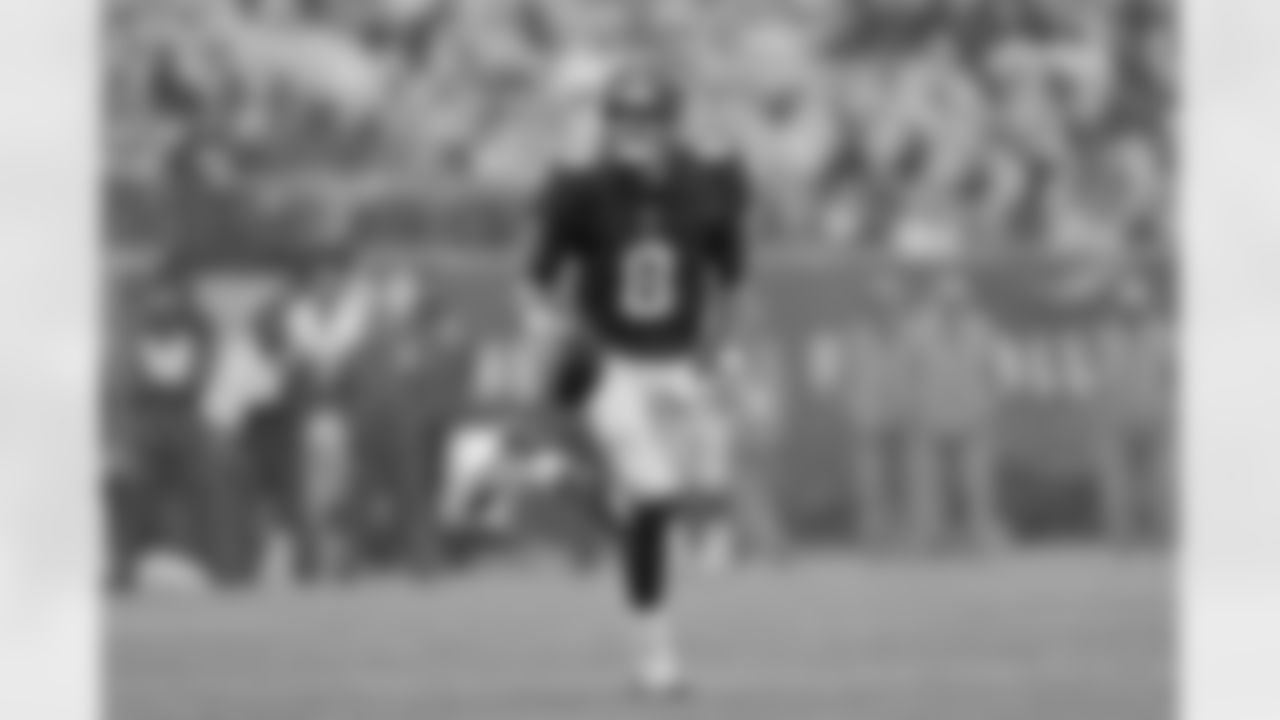
New York Giants quarterback Daniel Jones runs the ball during the second half of an NFL football game against the Arizona Cardinals, Sunday, Oct. 20, 2019, in East Rutherford, N.J. (AP Photo/Adam Hunger)
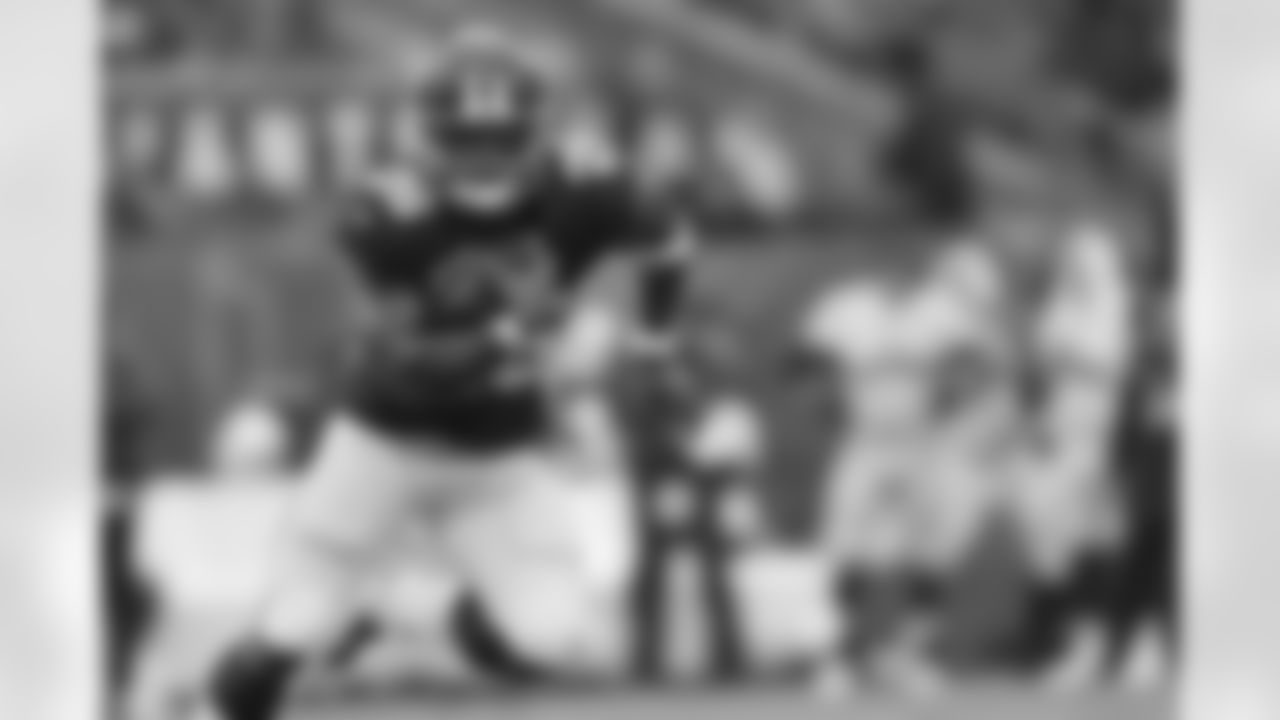
New York Giants running back Saquon Barkley (26) carries the ball during an NFL football game against the Arizona Cardinals, Sunday, Oct. 20, 2019, in East Rutherford, N.J. Arizona won 27-21. (Aaron M. Sprecher via AP)
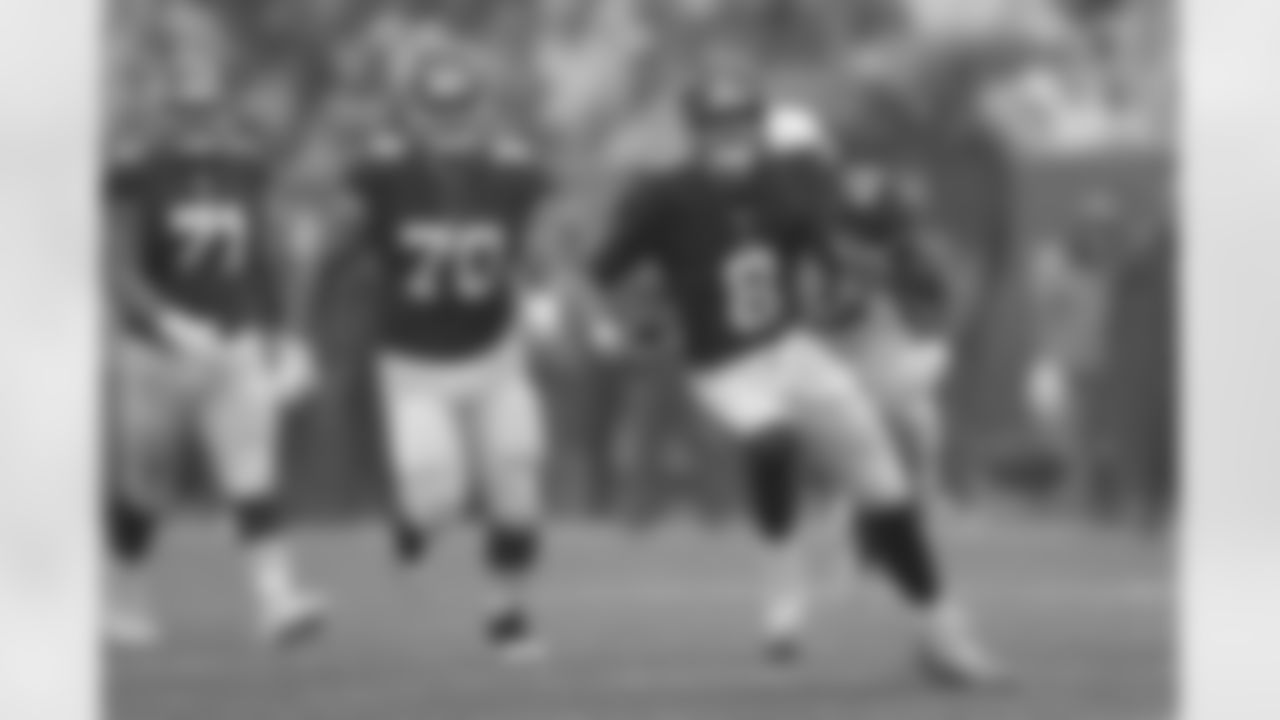
New York Giants quarterback Daniel Jones runs the ball during the second half of an NFL football game against the Arizona Cardinals, Sunday, Oct. 20, 2019, in East Rutherford, N.J. (AP Photo/Adam Hunger)
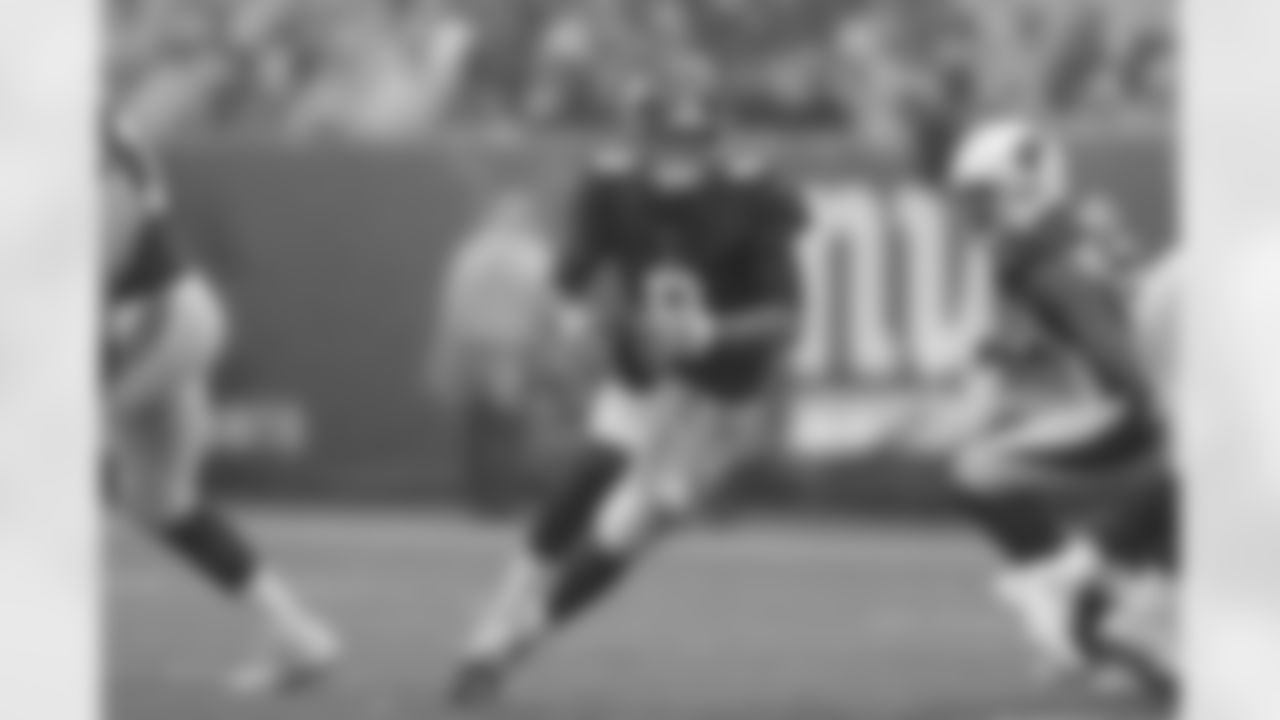
New York Giants quarterback Daniel Jones runs the ball during the second half of an NFL football game against the Arizona Cardinals, Sunday, Oct. 20, 2019, in East Rutherford, N.J. (AP Photo/Adam Hunger)
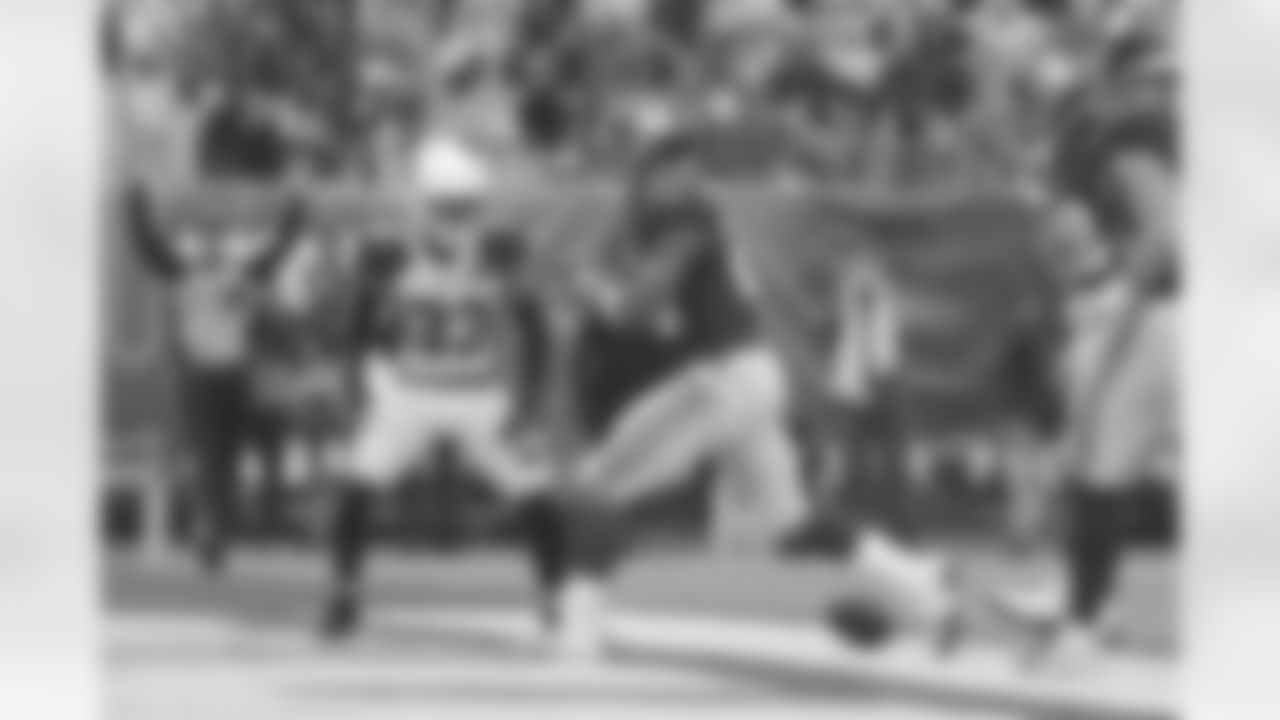
New York Giants' Saquon Barkley, center, celebrates his touchdown during the second half of an NFL football game against the Arizona Cardinals, Sunday, Oct. 20, 2019, in East Rutherford, N.J. (AP Photo/Adam Hunger)
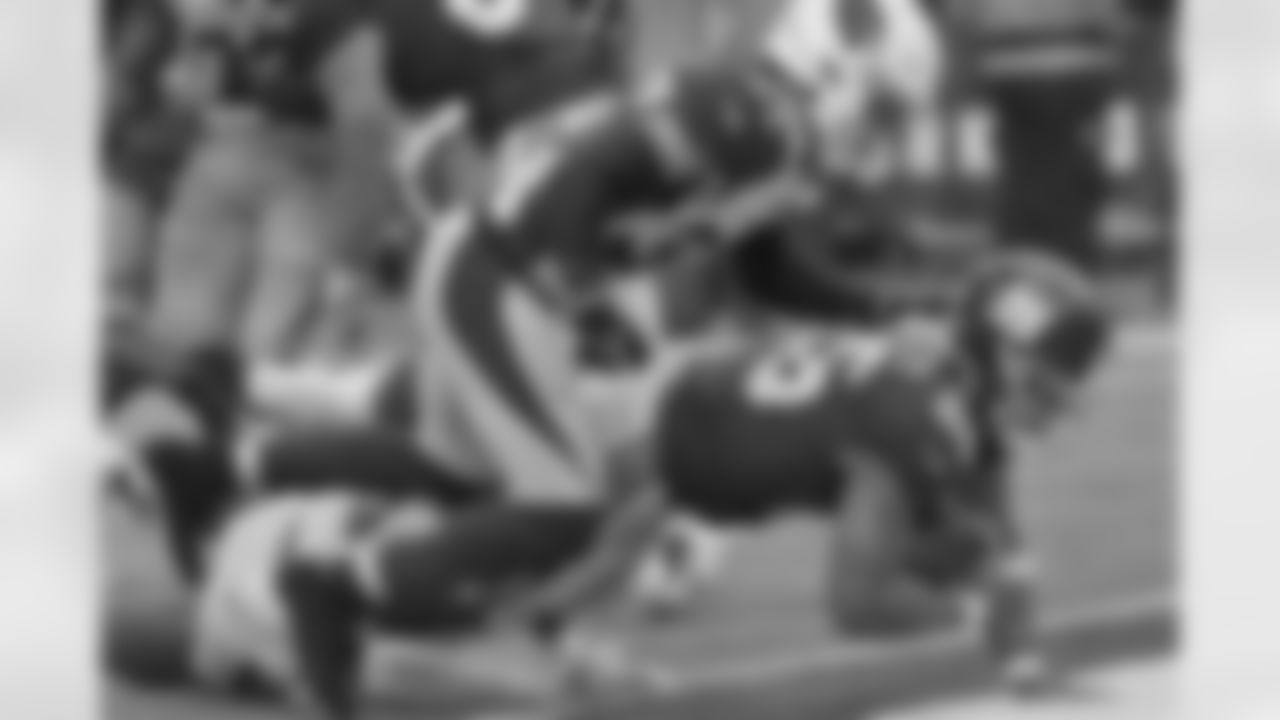
New York Giants' Saquon Barkley, right, scores a touchdown during the second half of an NFL football game against the Arizona Cardinals, Sunday, Oct. 20, 2019, in East Rutherford, N.J. (AP Photo/Bill Kostroun)
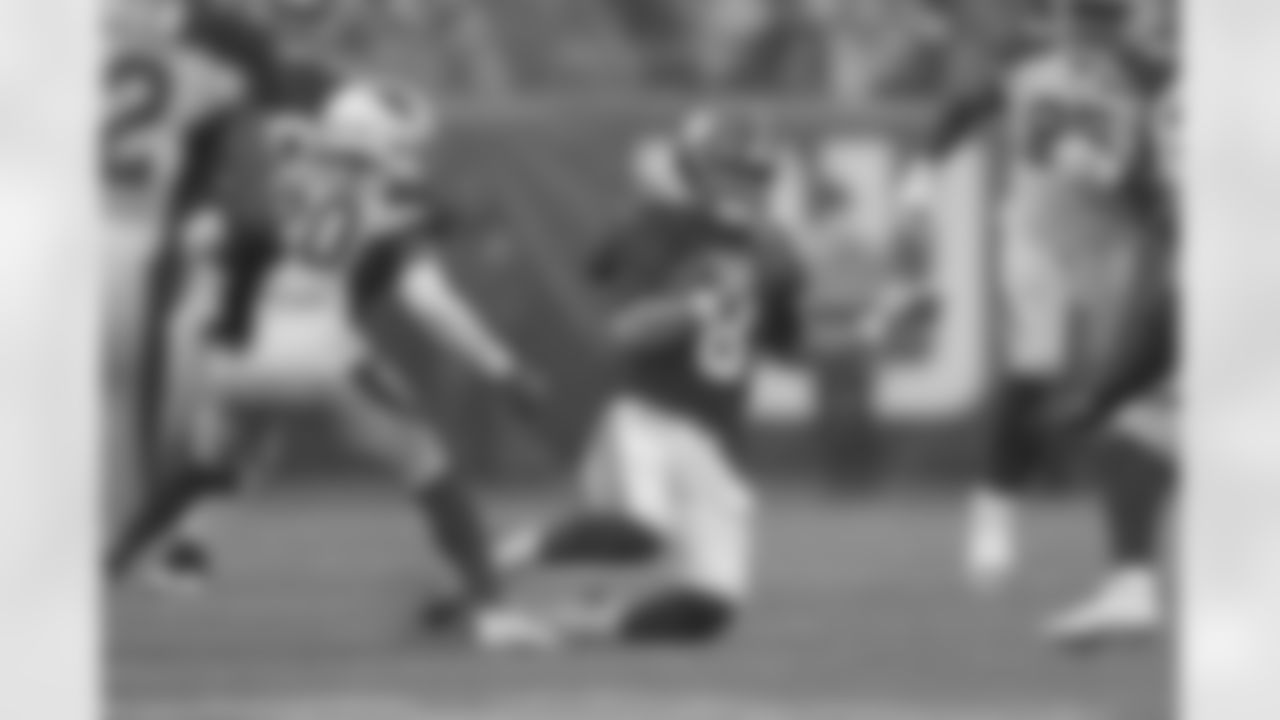
New York Giants quarterback Daniel Jones (8) slides during the second half of an NFL football game against the Arizona Cardinals, Sunday, Oct. 20, 2019, in East Rutherford, N.J. (AP Photo/Adam Hunger)
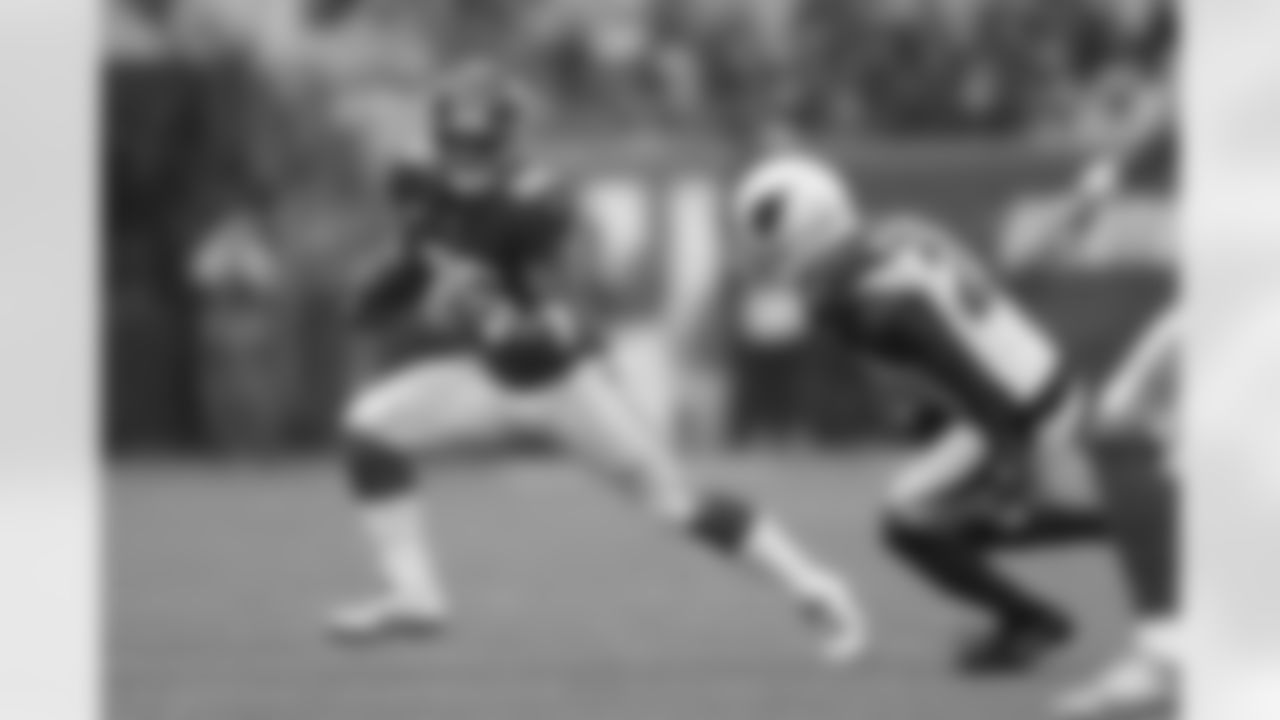
Arizona Cardinals' Patrick Peterson, right, defends New York Giants' Saquon Barkley during the first half of an NFL football game, Sunday, Oct. 20, 2019, in East Rutherford, N.J. (AP Photo/Adam Hunger)
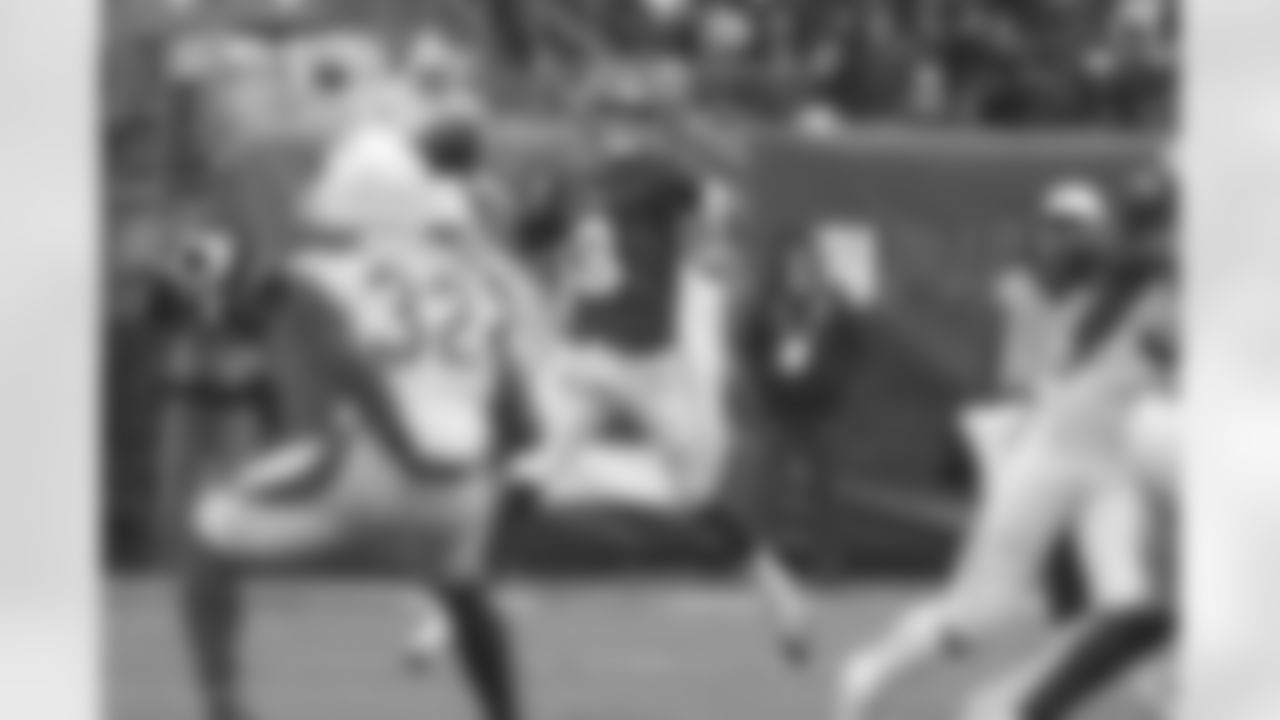
New York Giants quarterback Daniel Jones looks to throw during the first half of an NFL football game against the Arizona Cardinals, Sunday, Oct. 20, 2019, in East Rutherford, N.J. (AP Photo/Adam Hunger)
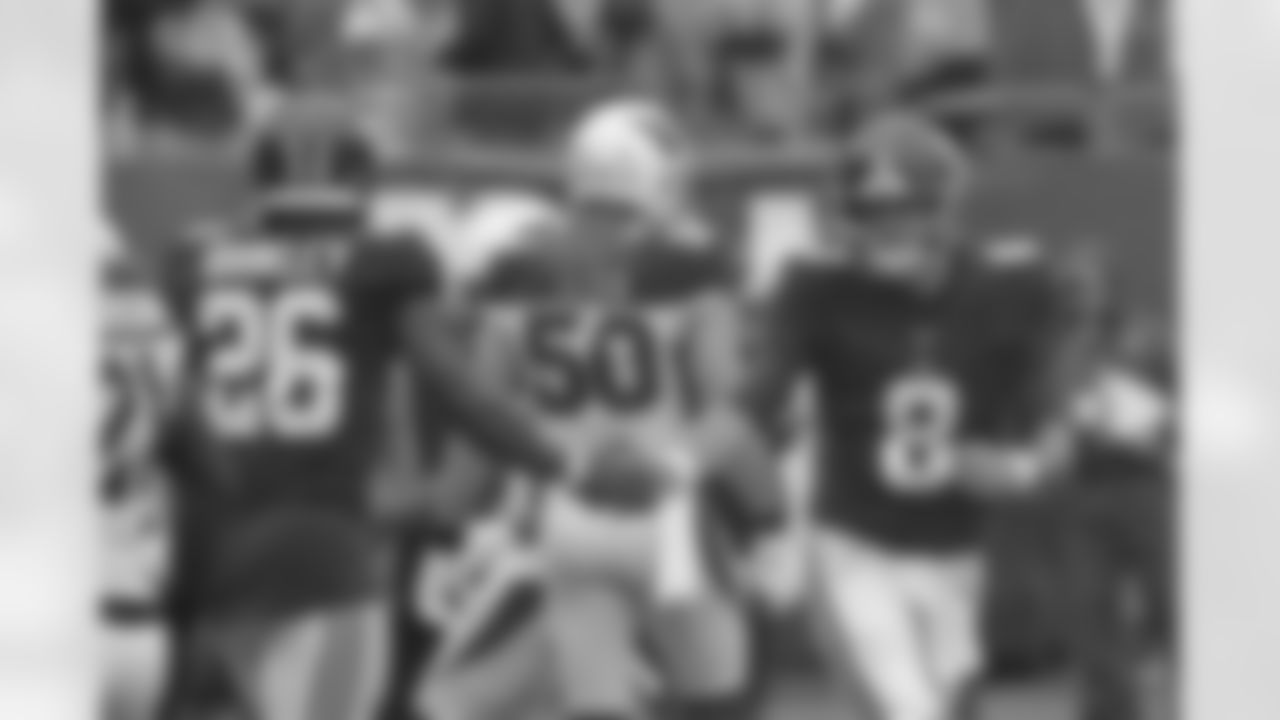
New York Giants quarterback Daniel Jones, right, celebrates a touchdown during the first half of an NFL football game against the Arizona Cardinals, Sunday, Oct. 20, 2019, in East Rutherford, N.J. (AP Photo/Bill Kostroun)
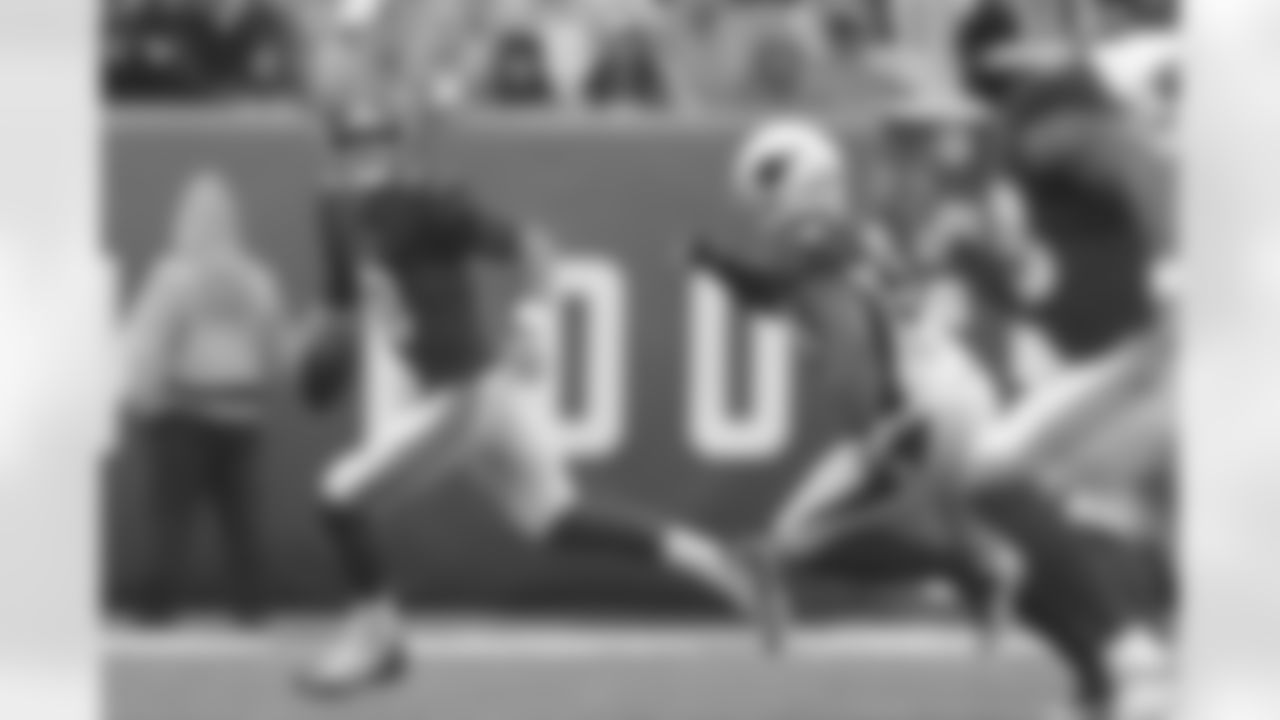
New York Giants quarterback Daniel Jones looks to throw during the first half of an NFL football game against the Arizona Cardinals, Sunday, Oct. 20, 2019, in East Rutherford, N.J. (AP Photo/Adam Hunger)
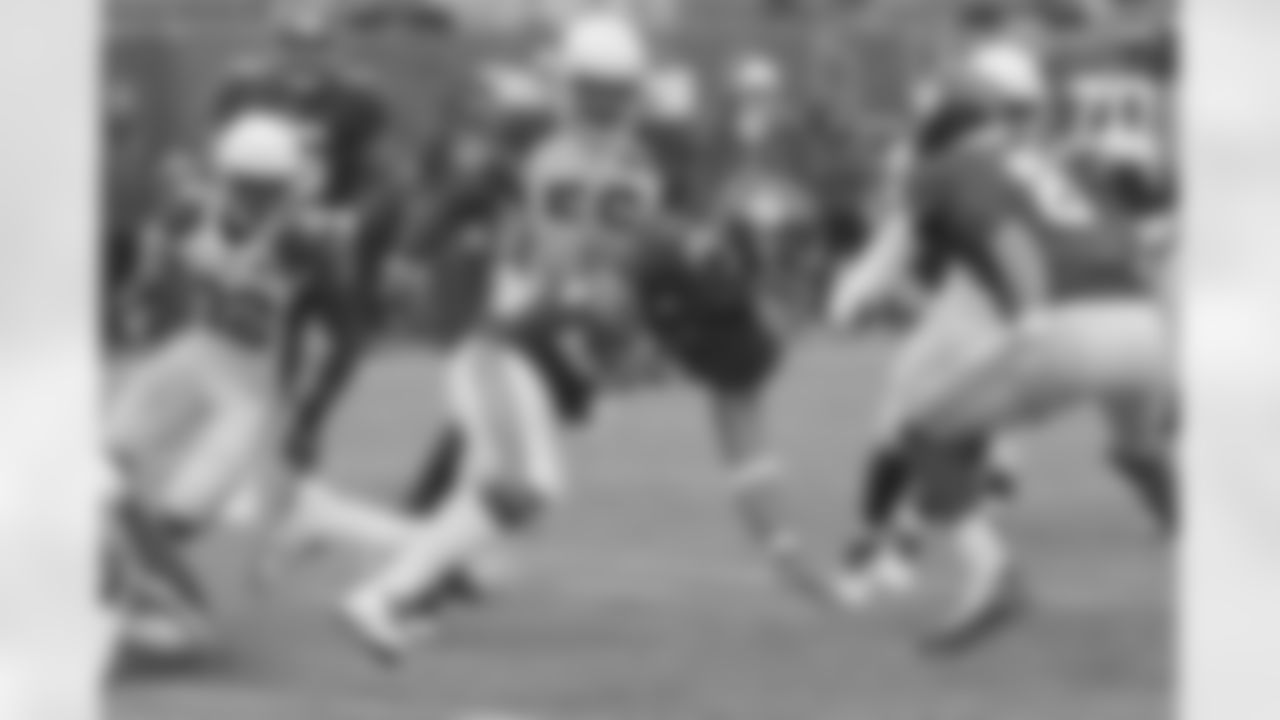
New York Giants' Saquon Barkley, center, runs the ball during the first half of an NFL football game against the Arizona Cardinals, Sunday, Oct. 20, 2019, in East Rutherford, N.J. (AP Photo/Bill Kostroun)
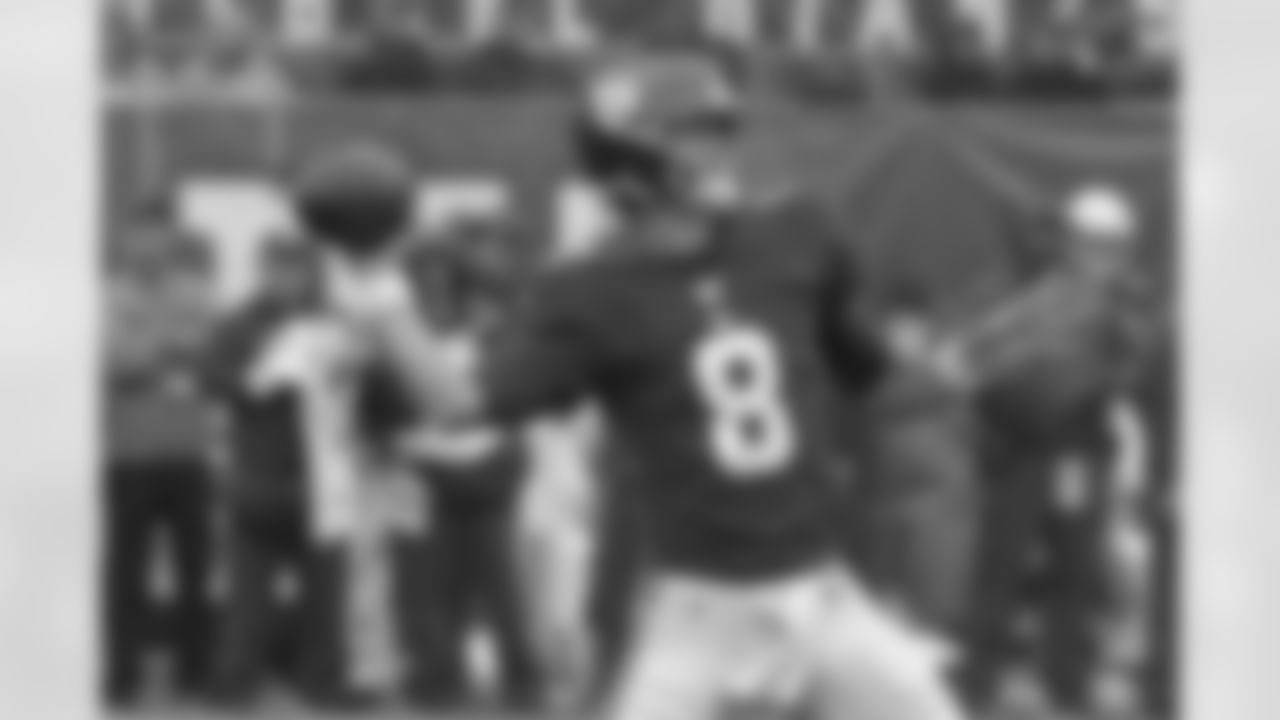
New York Giants quarterback Daniel Jones throws during the first half of an NFL football game against the Arizona Cardinals, Sunday, Oct. 20, 2019, in East Rutherford, N.J. (AP Photo/Bill Kostroun)
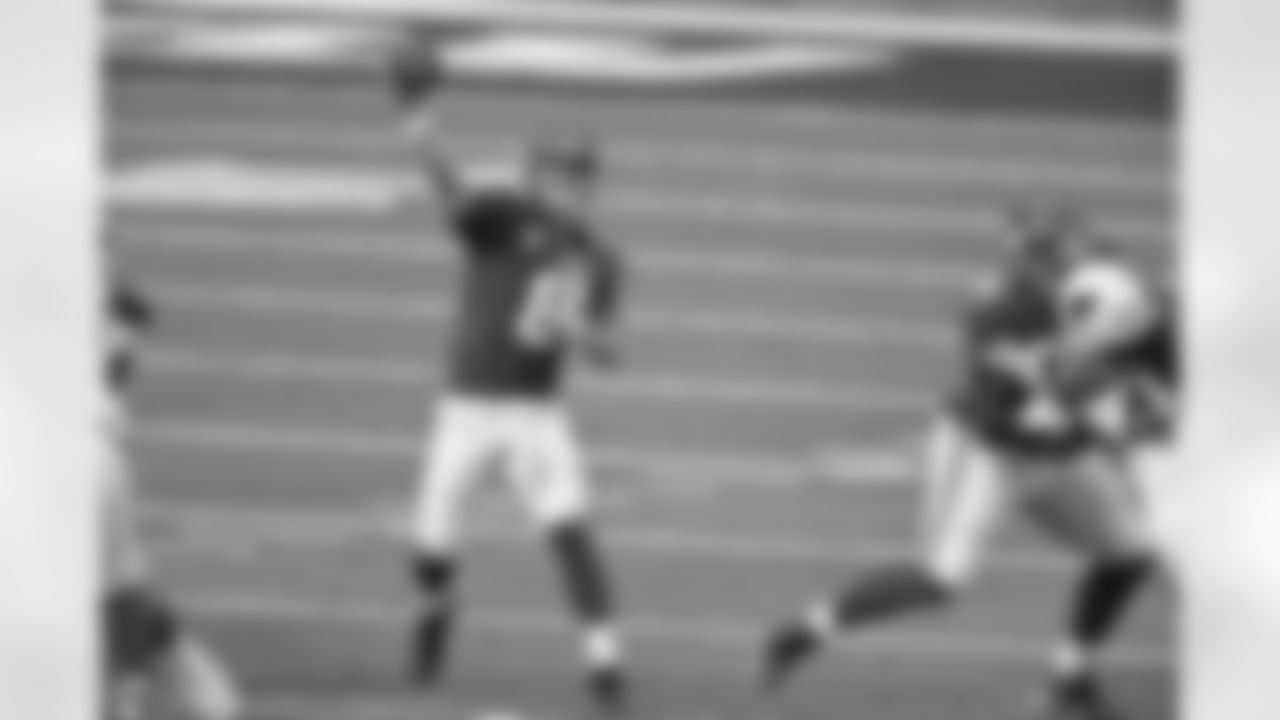
New York Giants quarterback Daniel Jones (8) during a week 14 regular season football game against the Arizona Cardinals at MetLife Stadium on December 13th, 2020 in East Rutherford, New Jersey
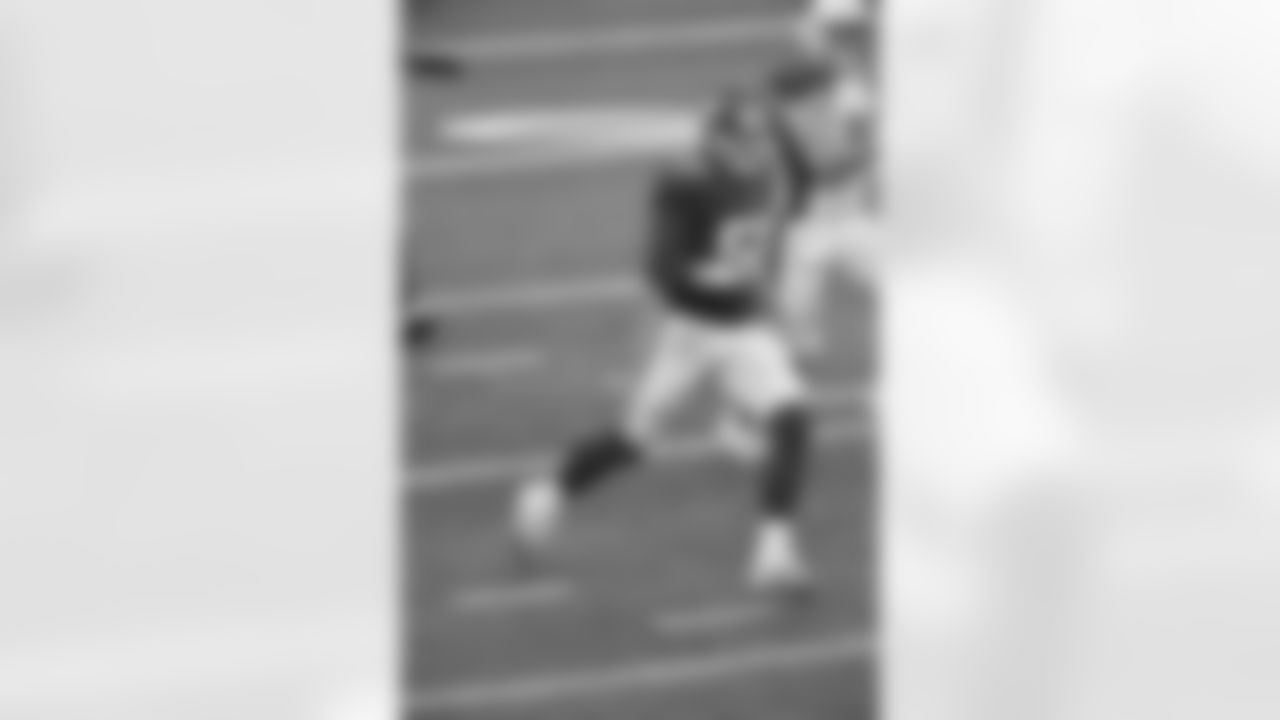
New York Giants long snapper Casey Kreiter (58) during a week 14 regular season football game against the Arizona Cardinals at MetLife Stadium on December 13th, 2020 in East Rutherford, New Jersey
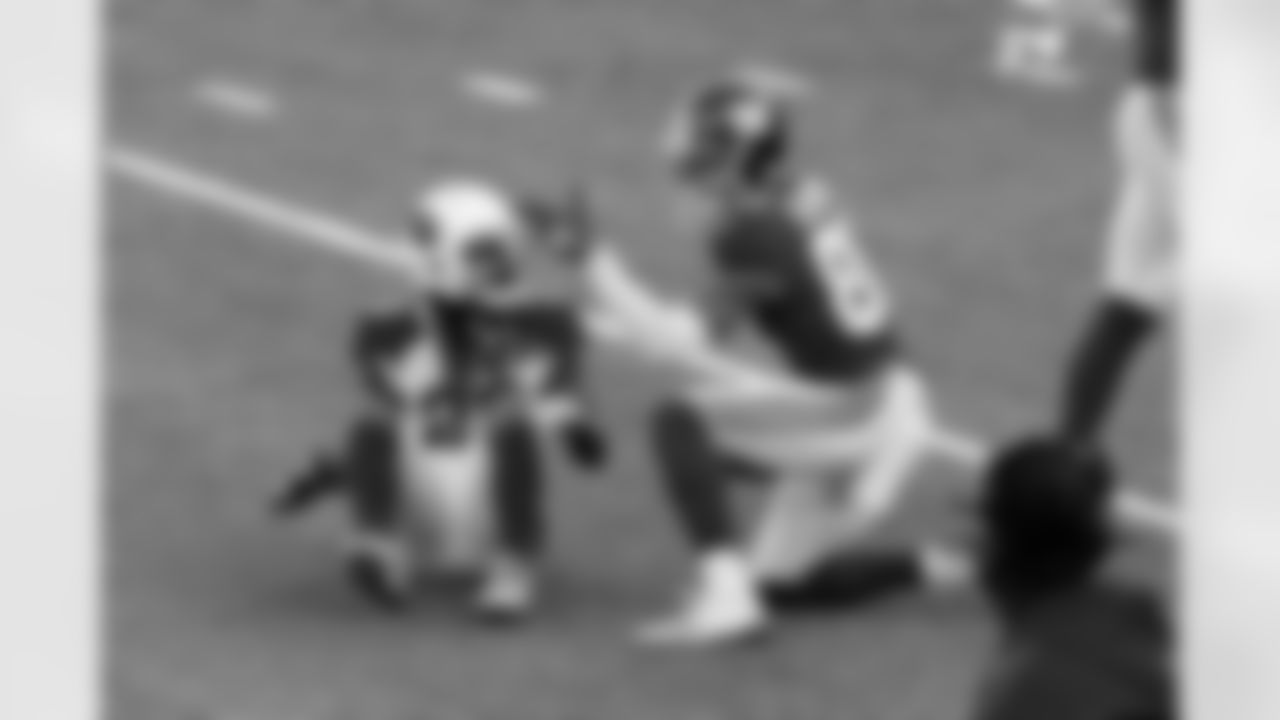
Darius Slayton (86)
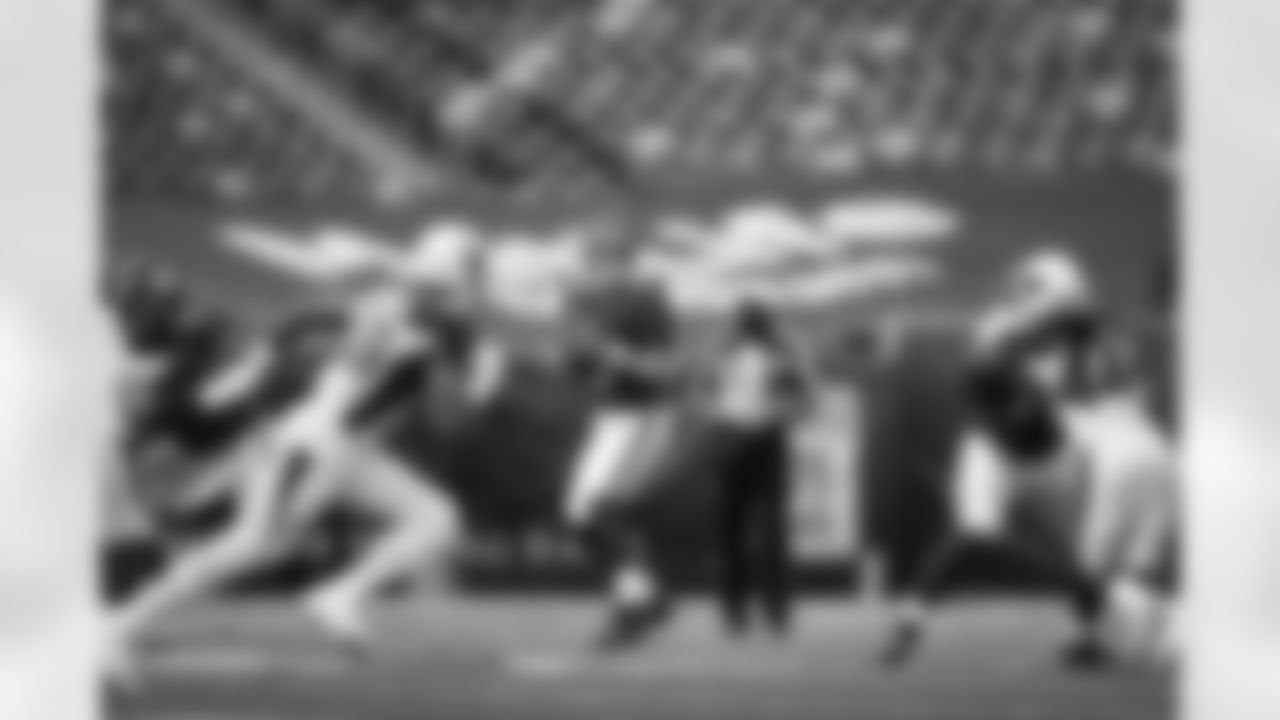
Daniel Jones (8)

Shane Lemieux (66), Andrew Thomas (78)
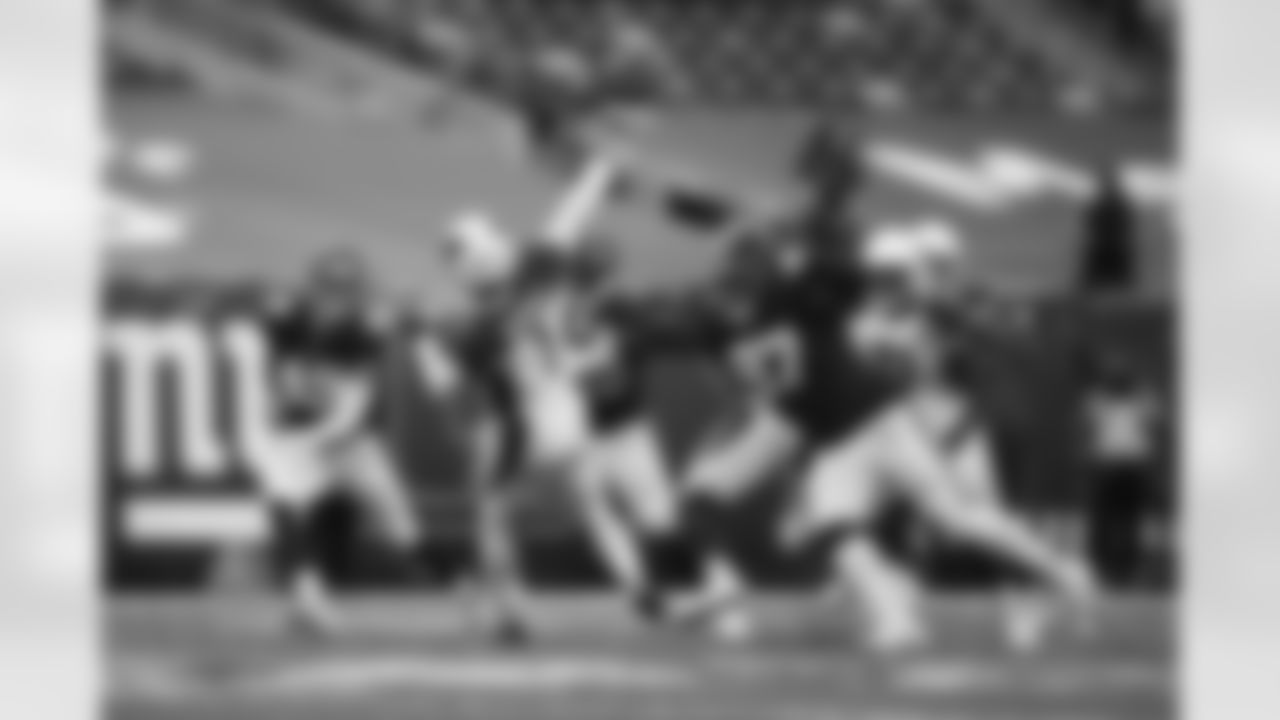
Dexter Lawrence (97)

Dexter Lawrence (97)
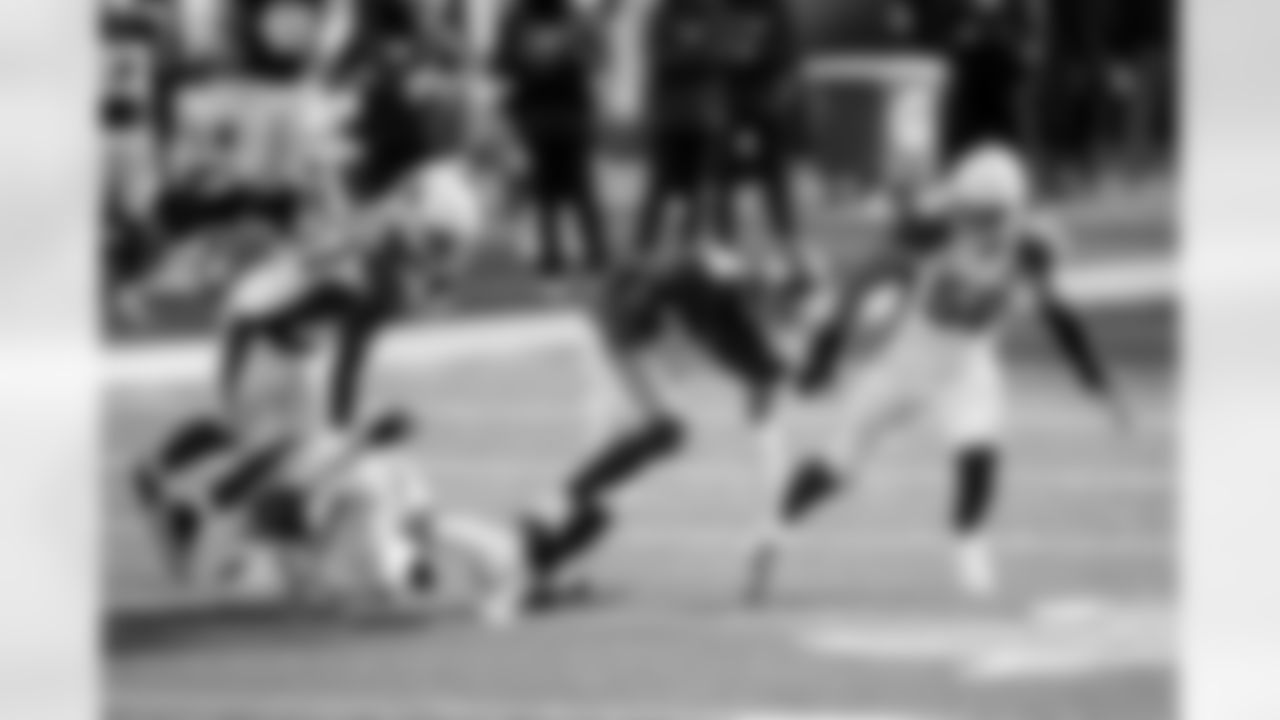
Darius Slayton (86)
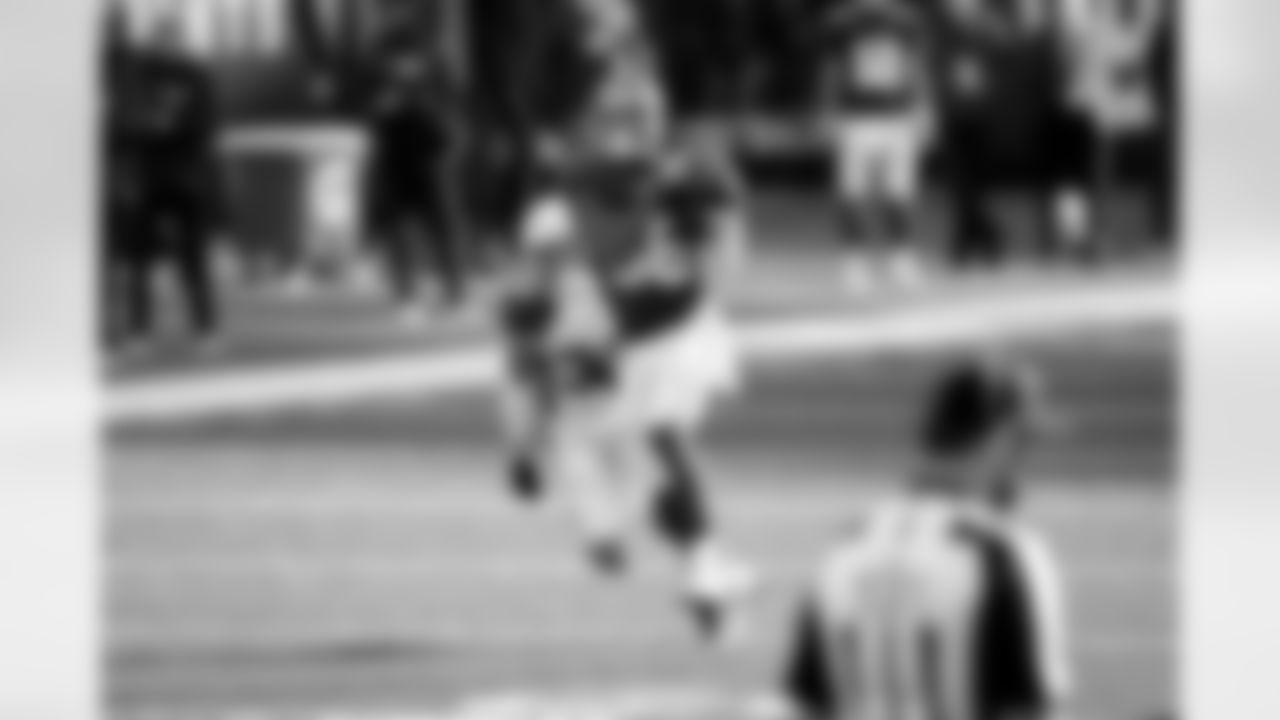
Darius Slayton (86)
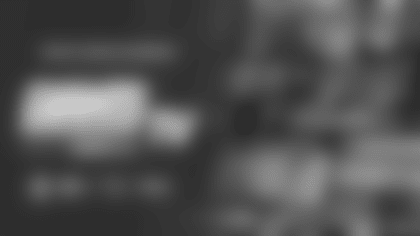
Giants TV Streaming App
Watch exclusive videos with the GiantsTV app for Apple TV, Roku, and Amazon Fire TV. Also available in the Giants mobile app




